League for Innovation

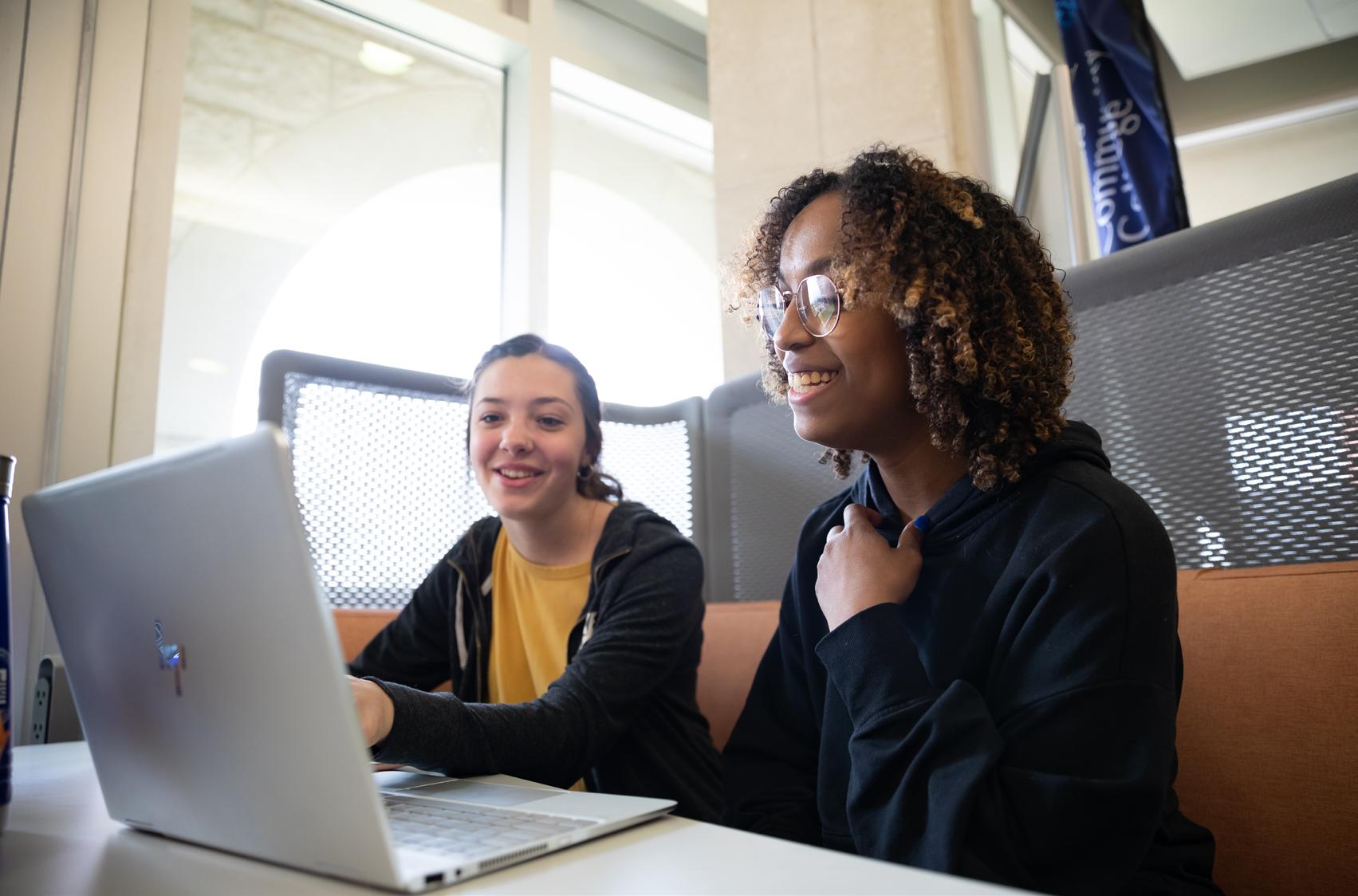
SELF-STUDY 2023
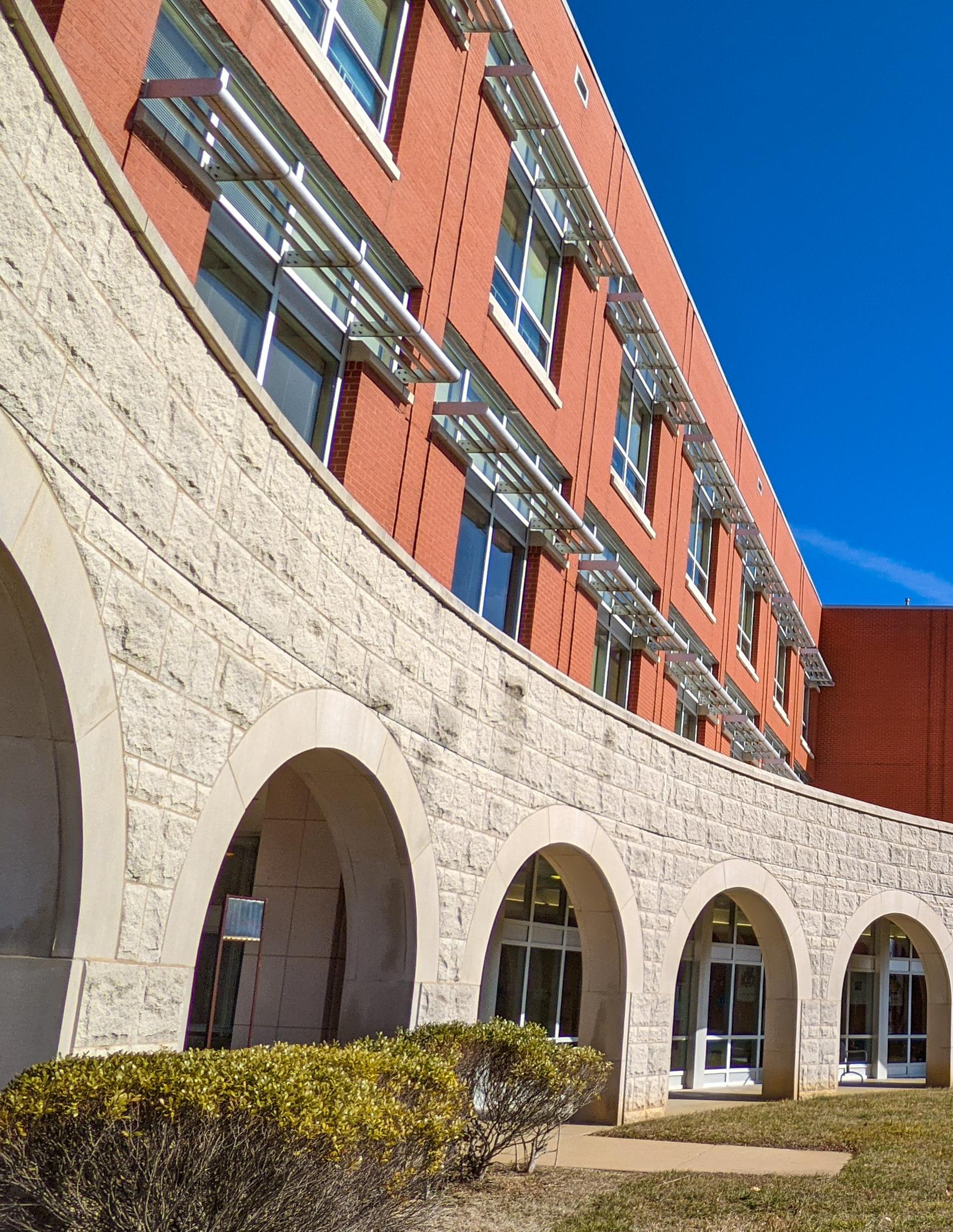


Table of Contents 1 Introduction 1 Mission 1 Vision 1 Values 2 Chancellor’s Letter 4 High-Quality Leadership 5 Board Chair’s Letter 6 Board of Trustees 8 Leadership 10 Shared Governance 12 Institutional Excellence 13 Organizational Learning 14 60 Years of Expanding Minds & Changing Lives 18 STLCC Campuses 22 FY2024-2026 Strategic Plan 24 Student Enrollment & Demographics Data 28 Graduation Over Time 30 Financial Stability 30 Financial Sustainability 32 STLCC Foundation 34 Grants 38 Recruitment & Enrollment Trends 40 Recruitment & Enrollment Initiative 41 Take One on Us Program 42 Black Male Achievers Program 43 Tech Academy 45 Transforming the Student Experience 46 Guided Pathways 47 Academic and Career Advising 48 First Year Experience (FYE) 49 Purpose First 50 Supporting Diverse Populations 51 Access Allies 53 Archer Athletics 54 Student Clubs and Organizations 55 Launch of Bachelor’s Program in Respiratory Care

56 Transforming the Community’s Workforce 58 Boeing Pre-Employment Training Program 60 Health Care Training Partnerships 61 Cybersecurity Career Expo 62 Project Lead the Way Engineering Challenge 63 EMBARK Dual Credit Life Science Program 64 Drone Pilot Program Takes Off 65 EPA Grant to Train Hazardous Materials Technicians 66 Biomanufacturing Research and Technician Training (BRaTT) Partnership 67 Progress Attained through College Education (PACE) 69 Transforming Processes & Facilities 69 STLCC Transformed 75 Course of Record (COR) Development 76 Multiple Measures Placement Tool 77 Factoring Factory 78 Enhancing Processes for the Dual Credit Program 79 Student Advocacy & Resource Center (SARC) 80 Child Development Laboratory Centers (CDLC) 81 Modern Technology in HyFlex Classrooms 83 Awards 84 League of Innovation Awards 86 Additional Awards and Distinctions 89 Transformational Leadership

Mission
Empowering students. Expanding minds. Changing lives. Vision
St. Louis Community College will be a national leader and model institution for inclusive and transformative education that strengthens the communities we serve through the success of our students.
Values
Students First
Everything we do supports student success and removes barriers.
Respect for All
We promote equitable treatment and respectful discourse in all interactions with students, each other and the community.
Integrity
We act with honesty, trustworthiness and ethical behavior.
Collaboration
Working collectively, we achieve more than working individually or within separate groups.
Data Informed
We make decisions in the best interests of students and the institution based on reliable data.
1
CHANCELLOR’S LETTER
League Board Members,
On behalf of St. Louis Community College (STLCC), I thank you for this opportunity to apply for reaffirmation onto the League for Innovation in the Community College Board. This application has the full support of our board of trustees, leadership and our award-winning faculty and staff.
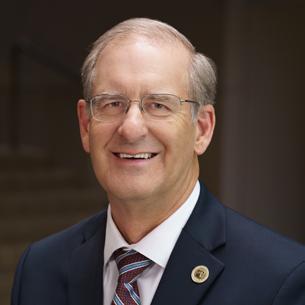
Our organizational transformation positions the College as an innovative community college leader and a committed, engaged League Board member. Our recently updated strategic plan places a high value on student success, inclusion, operational excellence and innovation. We are also underway with a project we call STLCC Transformed, which consists of a half-billion-dollar facilities renewal and replacement project at our four campuses. These efforts combine to transform our organization into a key community player in meeting the needs of current and future students.
The Chancellor’s Cabinet, comprised of senior leadership, strives to maintain a culture of innovation throughout the College. Simultaneous with obtaining voter-approved funding for STLCC Transformed, we are transforming our organization using the Guided Pathways framework and upgrading our internal operations to meet the needs of students well into the future. With our organizational value of students first guiding our efforts, we are experimenting with workforce credentialing and envisioning the future of academics and student services as more synergistic functions within our students’ Pathways to Success. The board of trustees recognizes the value of our organizational transformation and encourages innovation as a key success factor.
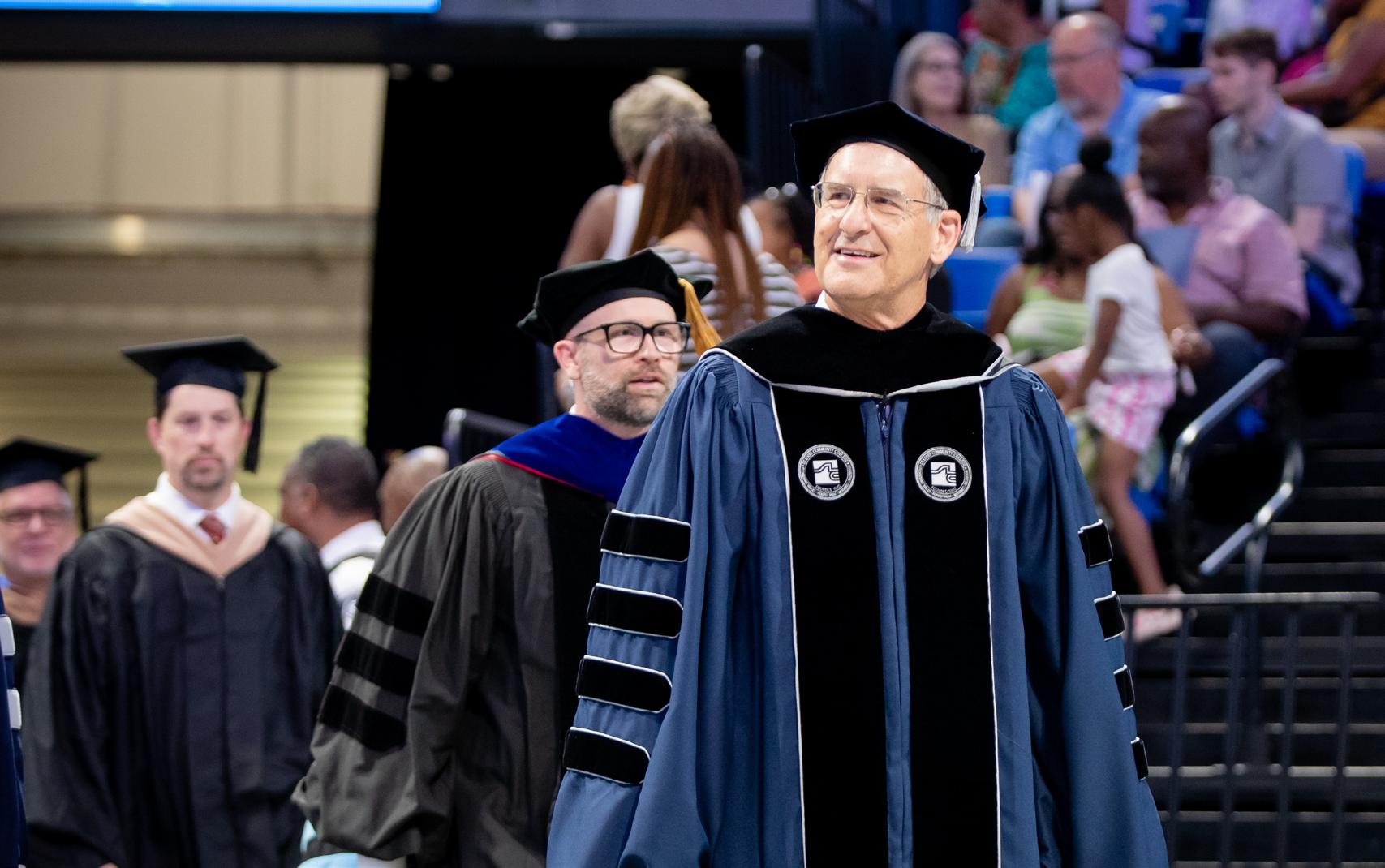
2 League for Innovation SELF-STUDY 2023 STLCC
The organizational stability the College has enjoyed since my arrival in 2015 has facilitated the development of innovations helping us respond to a dynamic marketplace and unique challenges, as described in this self-study. Although our previous League membership ended, we continued our Innovation of the Year award program, which has produced inventive solutions in academics, student services and internal functions. Our faculty and staff receive regular recognition for implementing contemporary programs designed to continuously improve their support for student success. Attendance at League conferences or participating in other League activities sparked many of these new programs.
STLCC values innovation and we look forward to sharing best practices, lessons learned and resources with other League Board members. We also anticipate learning from our board colleagues’ ideas and experiences. We know that being an active League Board member and participating in League activities requires time, effort and financial commitments and we are fully prepared to dedicate our time, energy and passion. Thank you for this opportunity and we look forward to rejoining the League for Innovation.
Sincerely,
JEFF L. PITTMAN, PH.D. | Chancellor St. Louis Community College
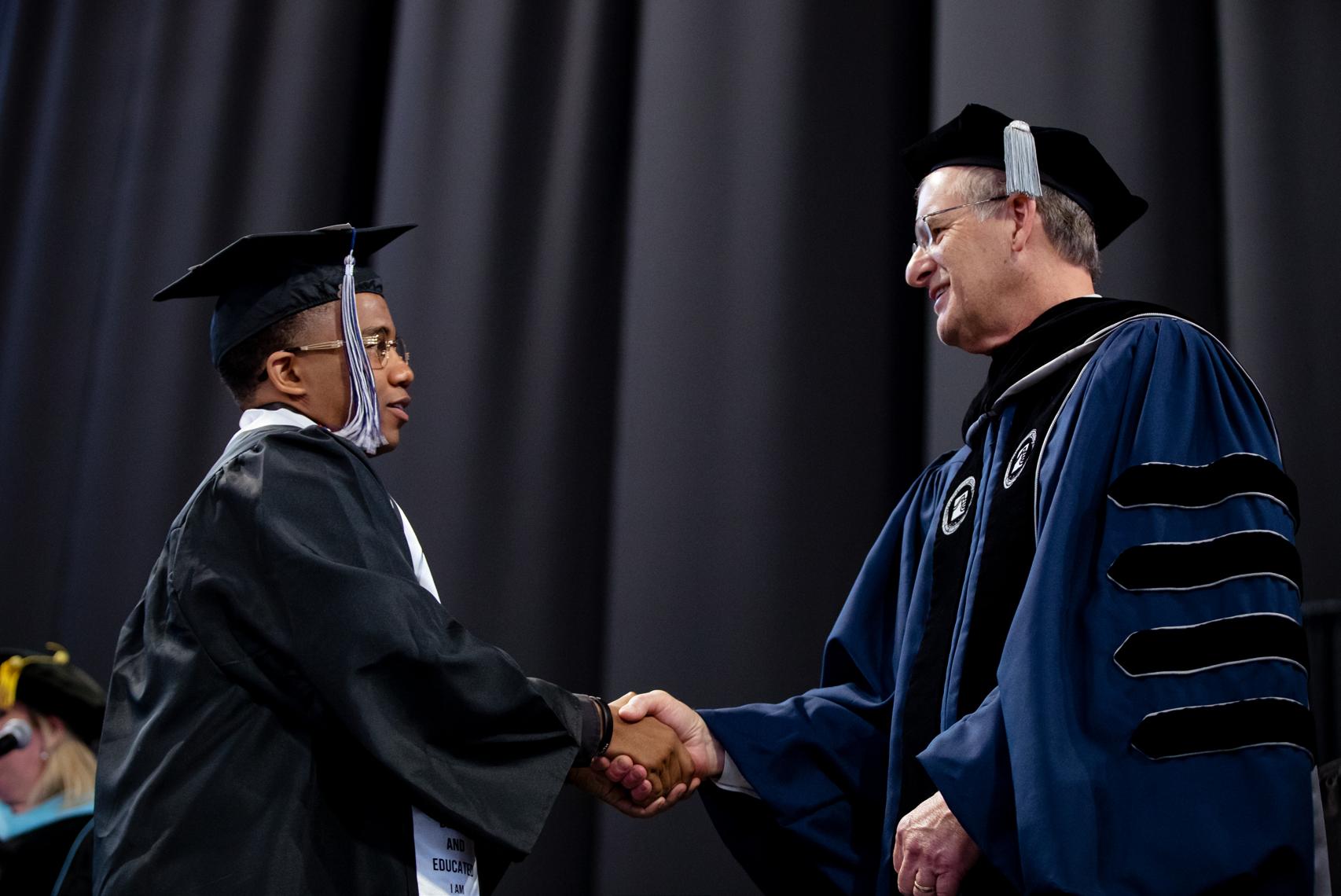
3
HIGH-QUALITY LEADERSHIP
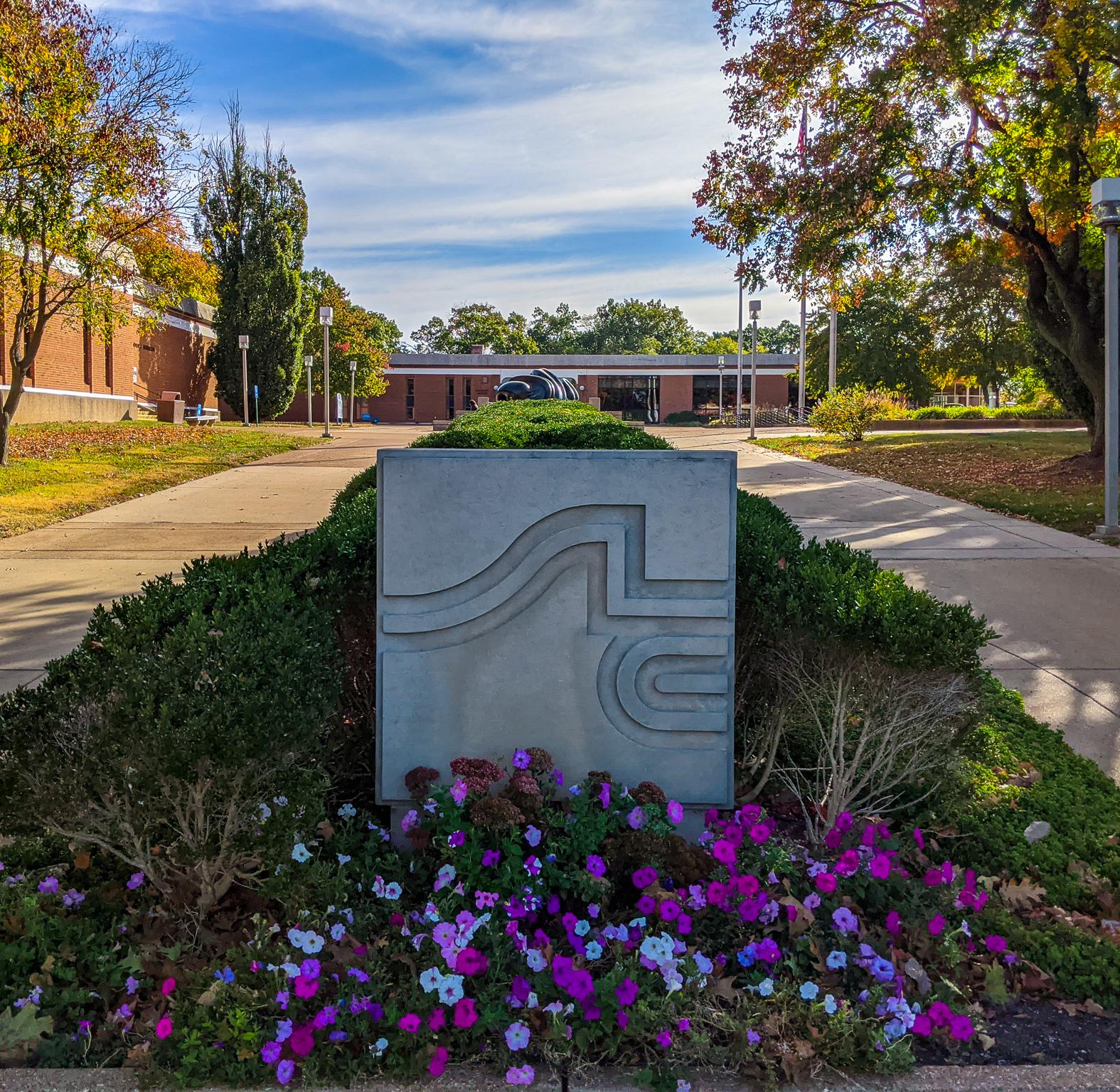
BOARD CHAIR’S LETTER

League Board Members,
The St. Louis Community College Board of Trustees fully supports the College’s application for reaffirmation onto the League for Innovation in the Community College Board. The leadership stability that St. Louis Community College has enjoyed over the last eight years, combined with our ongoing organizational transformation, position the college to be a collaborative, contributing League Board member.
The Board of Trustees values and encourages the innovation that takes place throughout St. Louis Community College. In our monthly board meetings, many of the employee and student accomplishments that we recognize, and the strategic project updates demonstrate new and creative thinking to solve problems and create new programs.
The board appreciates the fact that participation in League conferences and activities provides knowledge on best practices and generates transformative ideas that contribute to the success of these accomplishments and projects.
On behalf of the St. Louis Community College Board of Trustees, I extend our appreciation for this opportunity for reaffirmation onto the League Board. The Board of Trustees endorses and encourages St. Louis Community College’s commitment to become an active League Board member, to share lessons learned and resources, to learn from other board members, and to fully participate in League activities.
Sincerely,
CRAIG H. LARSON, ED.D. | Chair St. Louis Community College Board of Trustees

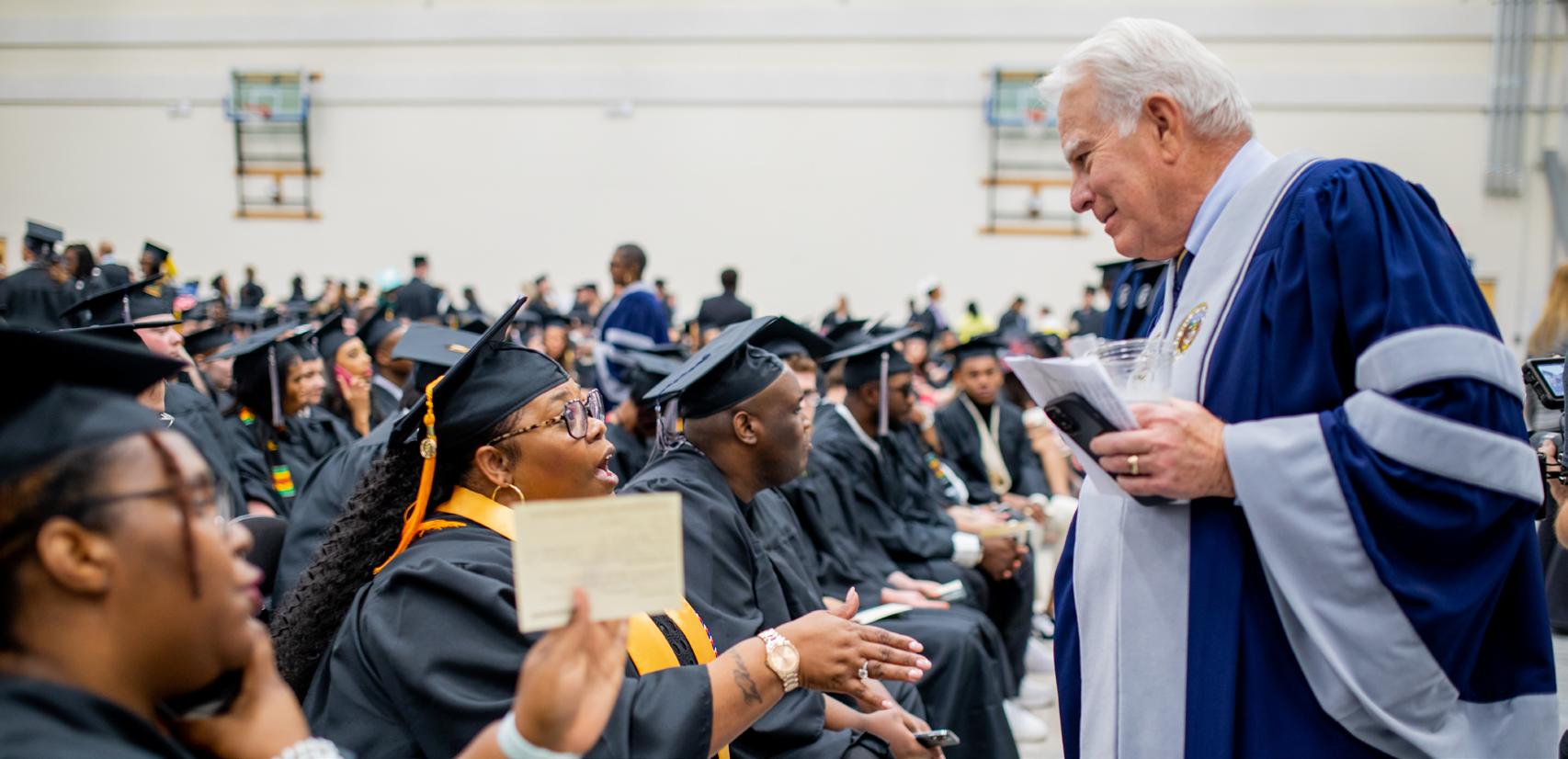
5
BOARD OF TRUSTEES
2023 Board of Trustees
H. Larson, Ed.D., Chair
Elected in 2010, current term expires in 2028
Dr. Larson spent 38 years in K-12 school administration, including serving as the Rockwood School District superintendent. Currently he serves as area supervisor of instruction for Missouri’s Department of Elementary and Secondary Education.
Elected in 2017, current term expires in 2026
Dr. Martin earned his doctorate in education policy and has an educational specialist, superintendent certificate and master’s degree in education. He currently serves as a middle school principal in Parkway Schools.

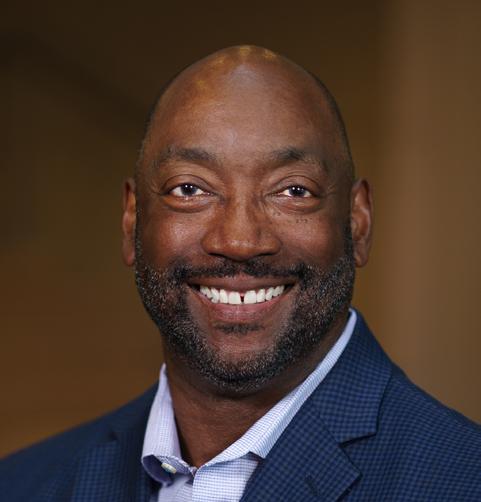
Rodney Gee, M.S., State Appointee

Appointed in 2016, current term expires in 2028
Gee has an extensive record of community service and has held administrative positions in sales, marketing, strategy and human resources with Monsanto, Motorola and Southwestern Bell.
Elected in 2012, current expires in 2024
Dr. Graham spent 38 elementary assistant She also served on the the Ferguson-Florissant District for 23 years.

6 League for Innovation SELF-STUDY 2023 STLCC
Craig
Kevin M. Martin, Ed.D., Vice Chair
Doris A. Graham,
current term
years as an assistant principal. the board of Ferguson-Florissant School
The St. Louis Community College Board of Trustees is comprised of seven members, who represent subdistricts. Six board members are elected by St. Louis City and County voters. One board member is state appointed and approved by the Missouri Coordinating Board of Higher Education. The board acts as the community’s voice and directs the College’s path and strategy to better serve the community.
Mary Luebke
Elected in 2020, term expires in 2026
Luebke was a professor who served in a variety of capacities at the Florissant Valley campus. As a nontraditional student, she is an alumna of the College.
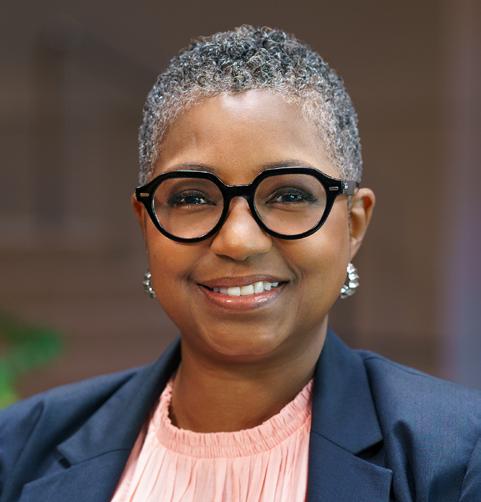
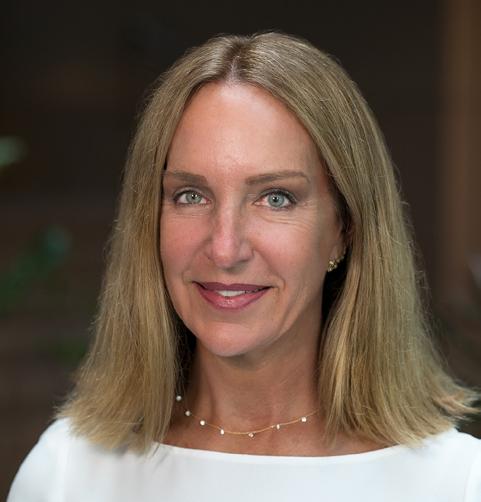


Elected in 2019, term expires in 2025
Marshall was a non-traditional student, working full time as a single mom. Her experience gives her unique insights into the barriers that many students face in pursuing their education.
Elected in 2023, term expires in 2029
Dr. Robinson has more than 13 years of experience in leadership and management and has a combined 15 years of federal service.
7
Graham, Ph.D.
Anne Adams Marshall
Nicole Robinson, Ed.D.
CABINET MEMBERS
LEADERSHIP

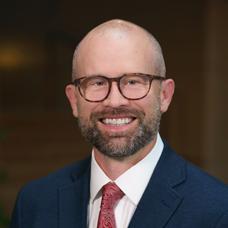
STLCC’s Cabinet and Leadership Team foster a culture of innovation throughout their respective areas of the College. This group also brings high quality experiences and resources that can be helpful to other League members: transformative facilities replacements and upgrades, ballot measure and Foundation fundraising successes and positive results from our dedicated government liaison, among others.


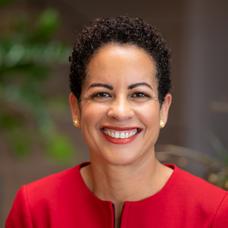
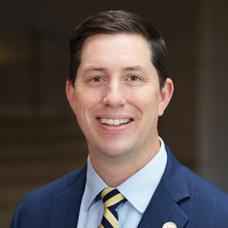


8 League for Innovation SELF-STUDY 2023 STLCC
Jennifer Arvin, M.A. Executive Director, Marketing and Communications
Andrew Langrehr, Ph.D. Vice Chancellor, Academic Affairs
D’Andre Braddix, Ed.D. Executive Director, Diversity, Equity and Inclusion
Hart Nelson, M.B.A. Chief Operating Officer
Christine Davis, Ed.D. Vice Chancellor, Student Affairs
Lucy Singer, J.D. General Counsel
Tanya Dupske, SPHR Chief Human Resource Officer
Mark W. Swadener, C.P.A., M.B.A. Vice Chancellor for Finance and Chief Financial Officer
Jeff L. Pittman, Ph.D. Chancellor
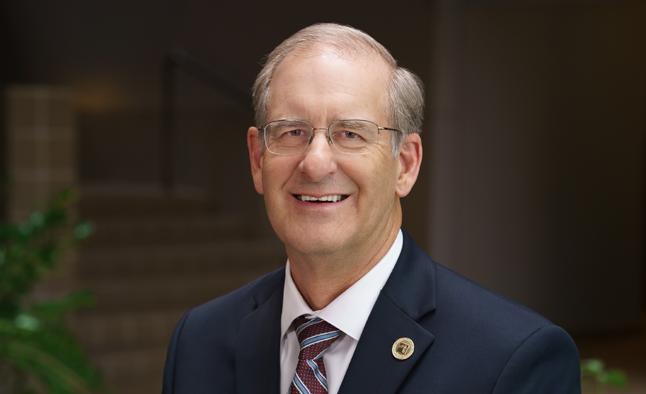
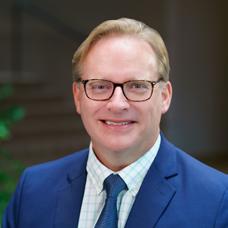


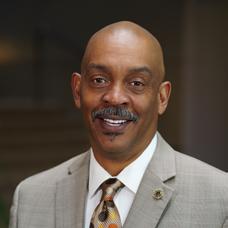
Under the guidance of Jeff L. Pittman, Ph.D., the College’s Cabinet and Leadership Team brings its expertise in a variety of subjects to create and carry out the strategic plan for the College. Dr. Pittman began his role as chancellor of St. Louis Community College in July 2015 and has 34 years of experience in higher education. Prior to joining STLCC, he worked for Ivy Tech Community College in Indiana for 27 years in various academic leadership roles, such as statewide vice president of corporate college services and online education. He served as chancellor of Ivy Tech’s Wabash Valley Region and statewide vice provost of distance education.
SENIOR LEADERSHIP TEAM MEMBERS
Alfred Adkins, M.A. Director, Public Safety and Emergency Management
Kelli Burns, M.A.
Associate Vice Chancellor, Institutional Research and Academic Process
Feng Hou
Chief Information Officer
Ryan McKenna
Government and Community Relations Officer
Jo-Ann Digman, M.S.W. Executive Director, Foundation

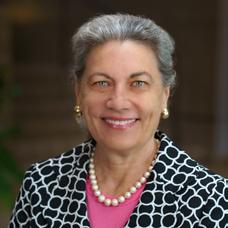
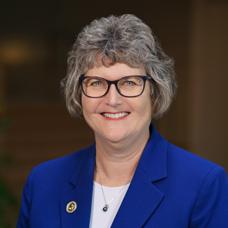
Phyllis Ellison, M.B.A.
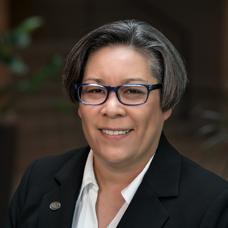
Associate Vice Chancellor, Workforce Solutions Group
Julie Fickas, Ed.D.

Campus President and Chief Academic Officer, Forest Park
Feleccia Moore-Davis, Ph.D.

Campus President and Chief Academic Officer, Meramec
Elizabeth Gassel Perkins, Ed.D.
Campus President and Chief Academic Officer, Florissant Valley
Stephen W. White, Ed.D.
Campus President and Chief Academic Officer, Wildwood
9
SHARED GOVERNANCE
Shared Governance Model Provides Everyone a Stake in the College
Under the College’s shared governance policy, students, faculty and staff have opportunities to share feedback and recommendations on updates to board policy and administrative procedures as well as other College matters before decisions are made.
The College Senate’s voting membership includes faculty and staff from the four main campuses and the administrative office, with administrators and students serving as nonvoting members. College Senate members review proposed board policy and administrative procedures recommendations related to educational
programs and student services, or other areas as directed by leadership, and provide recommendations to the chancellor.
Each of the four main campuses has a local senate also comprised of faculty, staff, administrators and students. Local senate members represent their locations as College Senate members. In addition to reviewing and voting on College Senate items, local senates also review and make recommendations to campus leadership on local matters and initiatives.
10 League for Innovation SELF-STUDY 2023 STLCC
Each campus has a Student Government Association (SGA) open to all students enrolled in a minimum of six credit hours with a 2.0 grade point average. SGA members review and provide recommendations on the governance of student issues on their local campuses as well as collegewide. Student government members represent their peers in the local and College senates.
Senate members are expected to gather input from their colleagues to ensure their votes represent their peers. The local senates vote on proposed recommendations for updates to board policy or administrative
procedures before a vote by the College Senate. These recommendations are forwarded to the chancellor for review with the executive leadership team, which in turn provides further input on the issue.

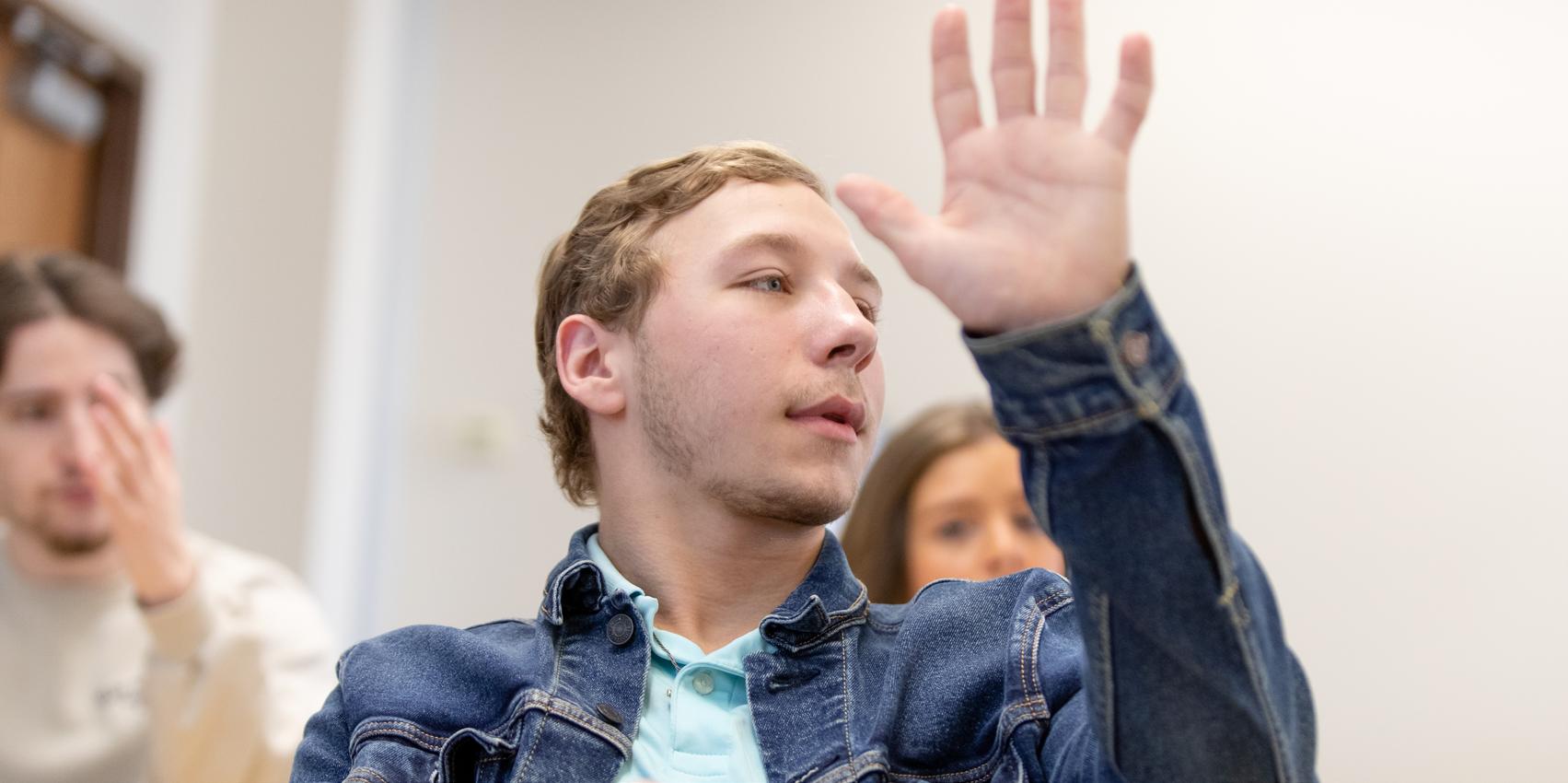
Board policy recommendations are forwarded to the Board of Trustees for its review and decision. The chancellor and executive leadership team make decisions on administrative procedures recommendations.

11
INSTITUTIONAL EXCELLENCE

EXCELLENCE
Organizational Learning
This report highlights some of the recent challenges St. Louis Community College has overcome with innovative and creative thinking.
The recent enrollment increase indicates a data-informed focus on meeting current and prospective students’ expectations is key to maintaining healthy enrollment and retention numbers, beginning with a centralized scheduling process for the district.
A new CRM process was adopted by the recruitment and enrollment team and enhancements were made to the application process to ensure targeted, appropriate information was focused on the student type.
During the pandemic, College leadership displayed organizational agility by quickly pivoting to continue offering programs and services fully online. During this time, student information technology services were modified to meet a spike in students’ technological needs, including a student laptop loaner program to meet demand for remote learning.
With a return to pre-pandemic funding levels, high-demand student offerings are being prioritized to fit within budget constraints and still allow for program expansion in high-need workforce sectors.
A strong relationship and communication with community members resulted in STLCC Transformed, a taxpayer funded initiative to create learning spaces that meet the expectations of today’s and tomorrow’s students and employers.
Becoming a Guided Pathways institution is helping to streamline processes and upgrade the student experience across the entire organization.
Lessons learned from overcoming these and other challenges to organizational sustainability include:
• Student’s requirements and expectations must always be data informed and the driving force in setting priorities.
• Timely responses to current and emerging marketplace trends are necessary to maintain a competitive edge.
• Balancing risk/reward evaluation with budget considerations produces innovative thinking that helps initiate creative solutions.
• The collaboration of employees, their dedication to student success, and their willingness to move forward in positive directions is a key success factor.
• Institutional transformation can still be accomplished, even when faced with multiple challenges and budget constraints.
These are lessons drawn upon as STLCC moves forward to transform the College, the facilities, the greater St. Louis workforce and, most importantly, the student experience.
13
60 YEARS OF EXPANDING MINDS & CHANGING LIVES
St. Louis Community College recently marked 60 years since its original charter date. Since April 20, 1962, the College has welcomed six decades of students and faculty, administrators and staff, first days of the semester, classes and quizzes, mid-terms and finals, certificates and degrees, commencements, ideas, innovations and cherished memories.
1962
STLCC APPROVED
On April 3, 1962, voters approve the Junior College District of St. Louis-St. Louis County and its charter Board of Trustees; three campuses are planned – Florissant Valley, Forest Park and Meramec.
Dr. Joseph P. Cosand becomes the first district president, 1962-71.
1963
CLASSES BEGIN
The Junior College District starts its first classes in January 1963. Classes are held in the evenings at McCluer High School in Florissant and at Roosevelt High School in St. Louis City. Enrollment is 798 students. The College’s first career programs are nursing, data processing, culinary arts and automotive technology.


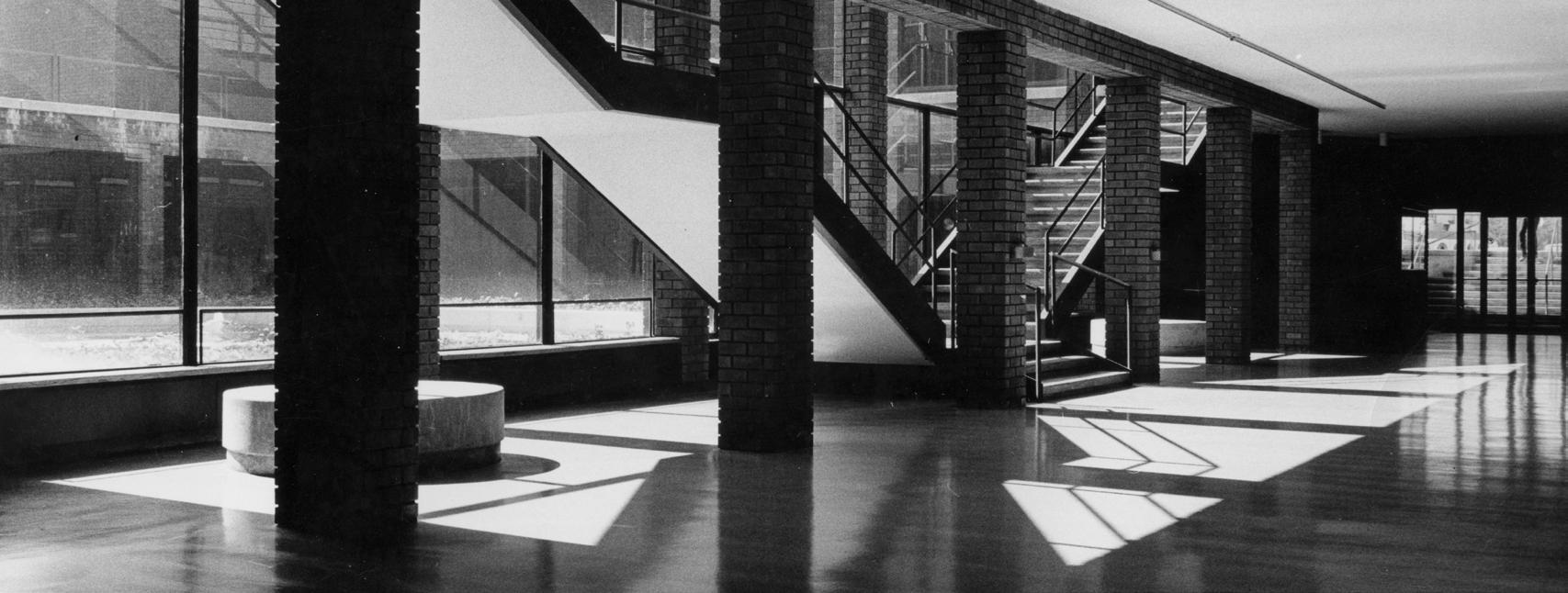
1965

FIRST GRADUATING CLASS
The College graduates its first class; 67 students earn associate degrees.
1968
THE COLLEGE IS A FOUNDING MEMBER OF THE LEAGUE FOR INNOVATION IN THE COMMUNITY COLLEGE
The Junior College District is one of the founding members of the League for Innovation.
1966
THREE NEW CAMPUSES UNDERWAY
Construction begins on all three campuses –Florissant Valley, Forest Park and Meramec.
1973
CHILD DEVELOPMENT CENTER PROGRAM STARTS
Florissant Valley’s Child Development Laboratory Center opens.
14 League for Innovation SELF-STUDY 2023 STLCC
Lecture Hall 1965
1976
A NEW NAME-ST. LOUIS COMMUNITY COLLEGE
The Board of Trustees adopt the name St. Louis Community College to better describe the range of educational offerings at the College.
1987
FUTURE PRESIDENT GEORGE H.W. BUSH SPEECH
Vice President George H.W. Bush speaks at Meramec.
1993
ST. LOUIS COMMUNITY COLLEGE IS A ST. LOUIS INSTITUTION
By 1993, more than onehalf of the households in St. Louis have at least one member who has taken classes at the College.
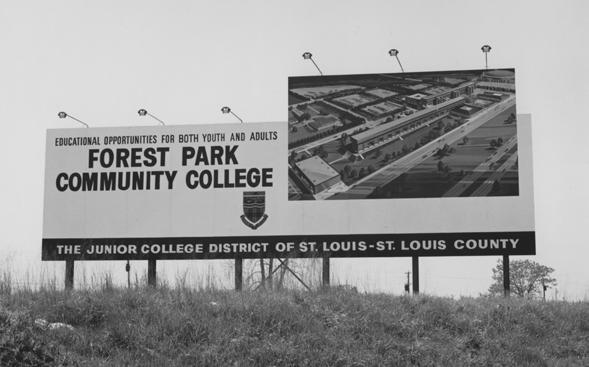

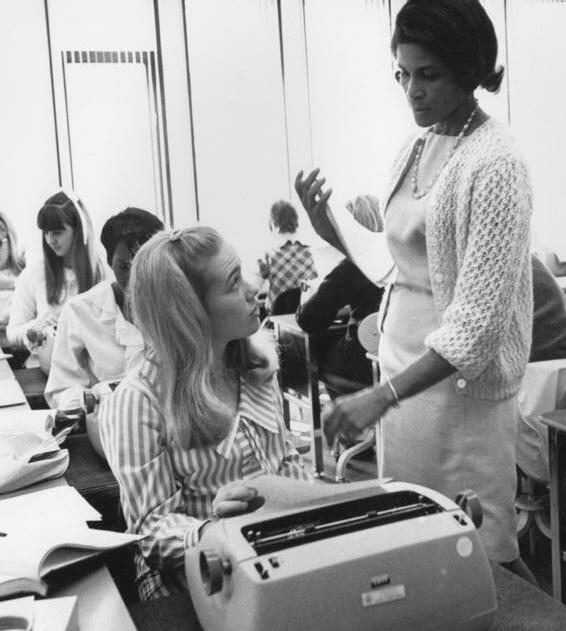
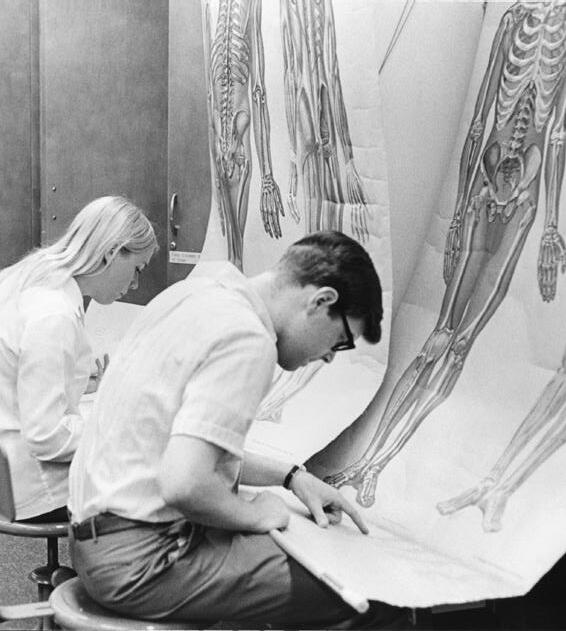

1997
THE COLLEGE LAUNCHES ADVANCED TECHNOLOGY CENTER

The Forest Park campus opens its new Advanced Technology Center for networking, connectivity and information systems.
1984
THE COLLEGE ADDS WEST COUNTY EDUCATION CENTER
As the population continues to push west, the College leases space in an office building at Clayton and Clarkson roads in west St. Louis County.
1992
THE COLLEGE RANKS 6TH IN THE NATION
Gwendolyn W. Stephenson, Ph.D., becomes the first woman to serve as chancellor, 1992-97. The College ranks sixth in the nation among 1,100 two-year schools with associate degrees.
1994
WILLIAM J. HARRISON EDUCATION CENTER OPENS
The new William J. Harrison Education Center in the city’s JeffVanderLou Neighborhood opens. The Center is ideally positioned to leverage learning partnerships and provides enhanced educational opportunities for residents of an underserved community.
2000
WEST COUNTY CAMPUS
In 2000, the College embarks on an ambitious plan to open a new campus location in west St. Louis County.
2004
EMERSON CENTER FOR ENGINEERING AND MANUFACTURING OPENS
The 31,000-square-foot Emerson Center facility features state-of-the-art tooling and equipment, including 14,000 square feet of laboratory space and classrooms on the Florissant Valley campus.

2001
SOUTH COUNTY EDUCATION CENTER GROUNDBREAKING
The College breaks ground to build the new South County Education Center.
2007
WILDWOOD CAMPUS OPENS
St. Louis Community College’s fourth campus opens in August 2007 – the first such undertaking since 1962 – near the intersection of Routes 109 and 100 in Wildwood. The campus earns a U.S. Green Building Council Leadership in Energy and Environmental Design (LEED) gold certification.
2008
CENTER FOR PLANT AND LIFE SCIENCES OPENS
The Center for Plant and Life Sciences interfaces with business and industry to bring cutting-edge education and workforce training in the burgeoning regional bioscience community.

2009
THE COLLEGE PRODUCES INITIAL WORKFORCE JOB MARKET REPORT

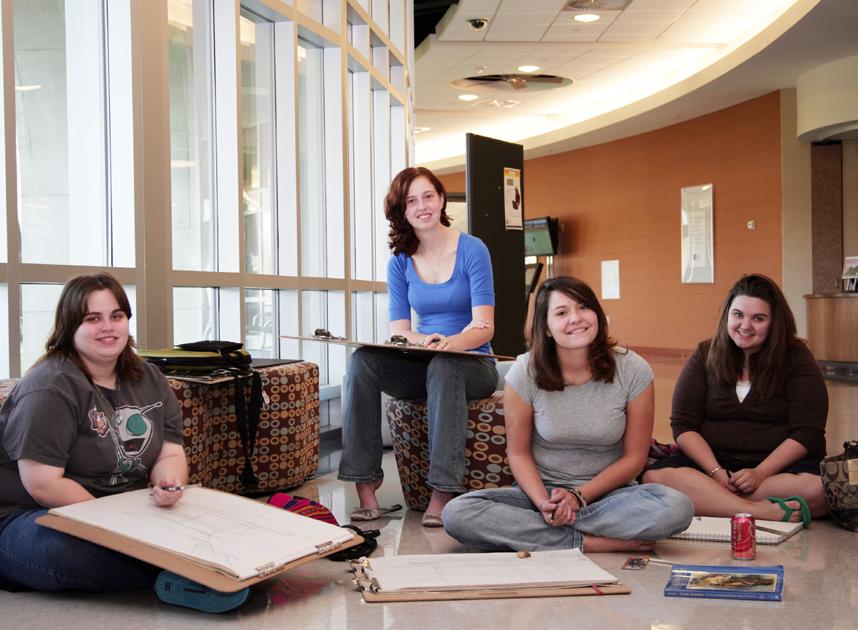
The first State of St. Louis Workforce Report is published. The College’s Workforce Solutions Group takes an in-depth look at the St. Louis job market and presents the report to the community at a free event.

16 League for Innovation SELF-STUDY 2023 STLCC
2010
CENTER FOR WORKFORCE INNOVATION OPENS AT FLORISSANT VALLEY CAMPUS
STLCC works with local companies to prepare 500 students annually to enter the workforce or to further develop their skills in this state-of-the-art, 32,000-square foot facility.

2018
HLC ACCREDITATION
In 2018, STLCC is granted another 10-year reaffirmation of accreditation by the Higher Learning Commission (HLC). STLCC has been fully accredited as a single entity since 1988. Florissant Valley, Forest Park and Meramec were separately accredited beginning in 1969.
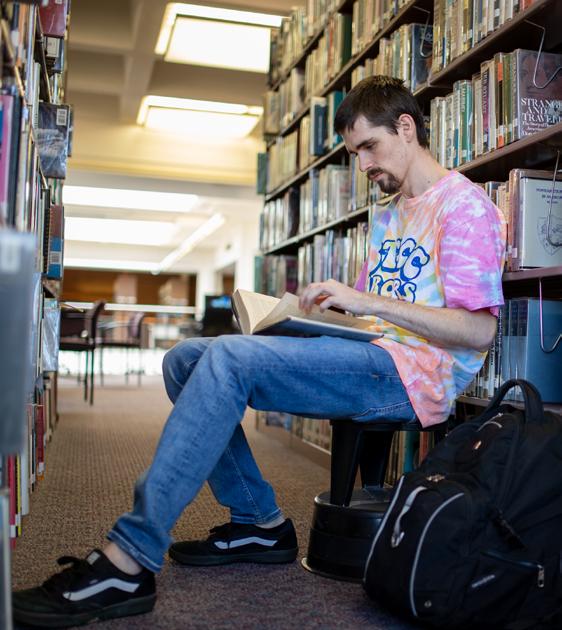
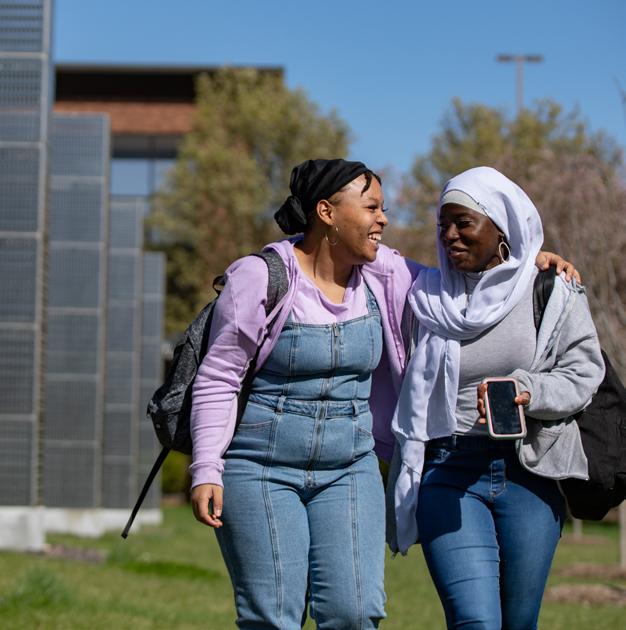
2015
FIRST STATE-APPOINTED TRUSTEE
STLCC is the first community college in Missouri to have a trustee appointed by the Coordinating Board for Higher Education (CBHE).
2019
CENTER FOR NURSING AND HEALTH SCIENCES OPENS
The Center for Nursing and Health Sciences opens on the Forest Park campus. All of the campus’ health care programs are now located under one roof.

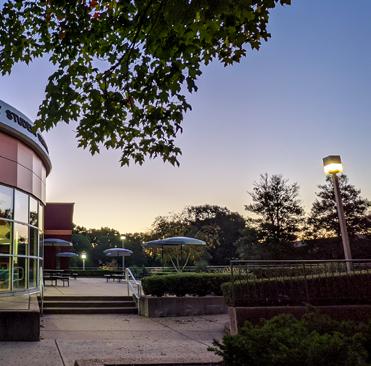

2020
NURSING AT WILDWOOD
The Wildwood campus welcomes its first class of nursing students. All four of the College’s campuses now offer the nursing program to students.
2022
STLCC TRANSFORMED BEGINS
Thanks to the voters of St. Louis City and County, the College begins a multiyear plan with a half-a-billion dollars in investment to construct six new buildings. Replacing or updating old buildings with modern, state-of-the-art facilities will not only lead to significant ongoing savings, but ultimately improve the student experience.
STLCC CAMPUSES
St. Louis Community College is the largest community college district in Missouri, as measured by students enrolled and credit hours earned, and one of the largest in the United States. The College district spans 718-square miles across St. Louis City and St. Louis County, as well as portions of Franklin and Jefferson Counties.
The College has four main campuses, two education centers, two workforce training centers and six centers for excellence. Collectively, these locations serve more than 32,000 students through credit, non-credit and continuing education courses.
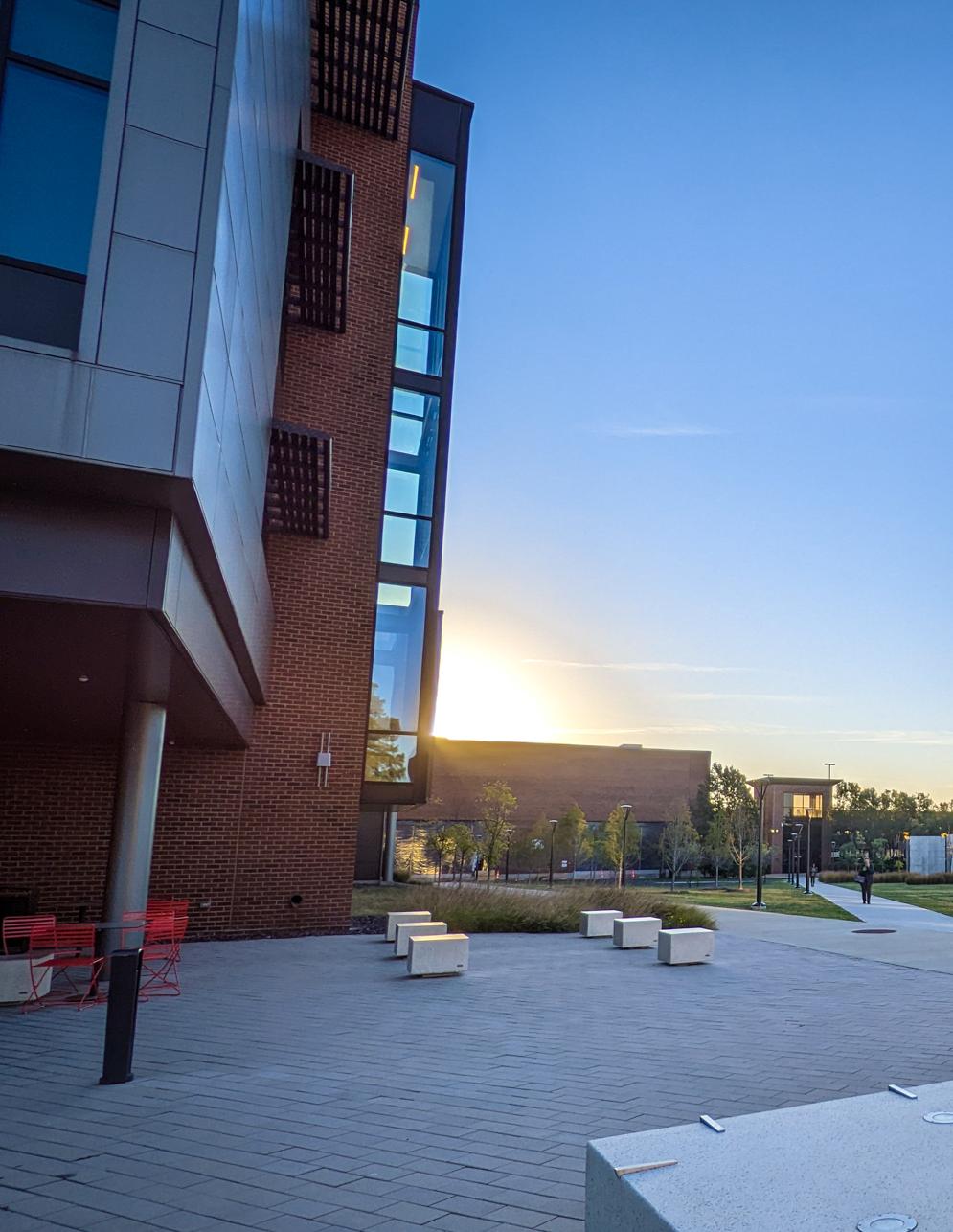
64/40 64/40 55 270 367 MISSISSIPPI RIVER MISSOURI RIVER 270 70 70 70 70 370 170 270 270 255 255 270 64/40 364 KINGSHIGHWAY GRAND CASS GRAND 109 109 PERSHALL MANCHESTER 100 141 141 61 BIG BEND 67 67 67 67 67 141 141 44 44 55 55 44 44 South County Wildwood Corporate College Meramec Forest Park Florissant Valley Harrison Center N
Main Campuses
FLORISSANT VALLEY
Nestled on 108 acres of rolling, wooded hills, the Florissant Valley campus is known for excellence in engineering and technology, in addition to a strong general education curriculum. The campus is home to St. Louis’ only two-year biotechnology program, a leader in providing highly skilled workers for this emerging industry.
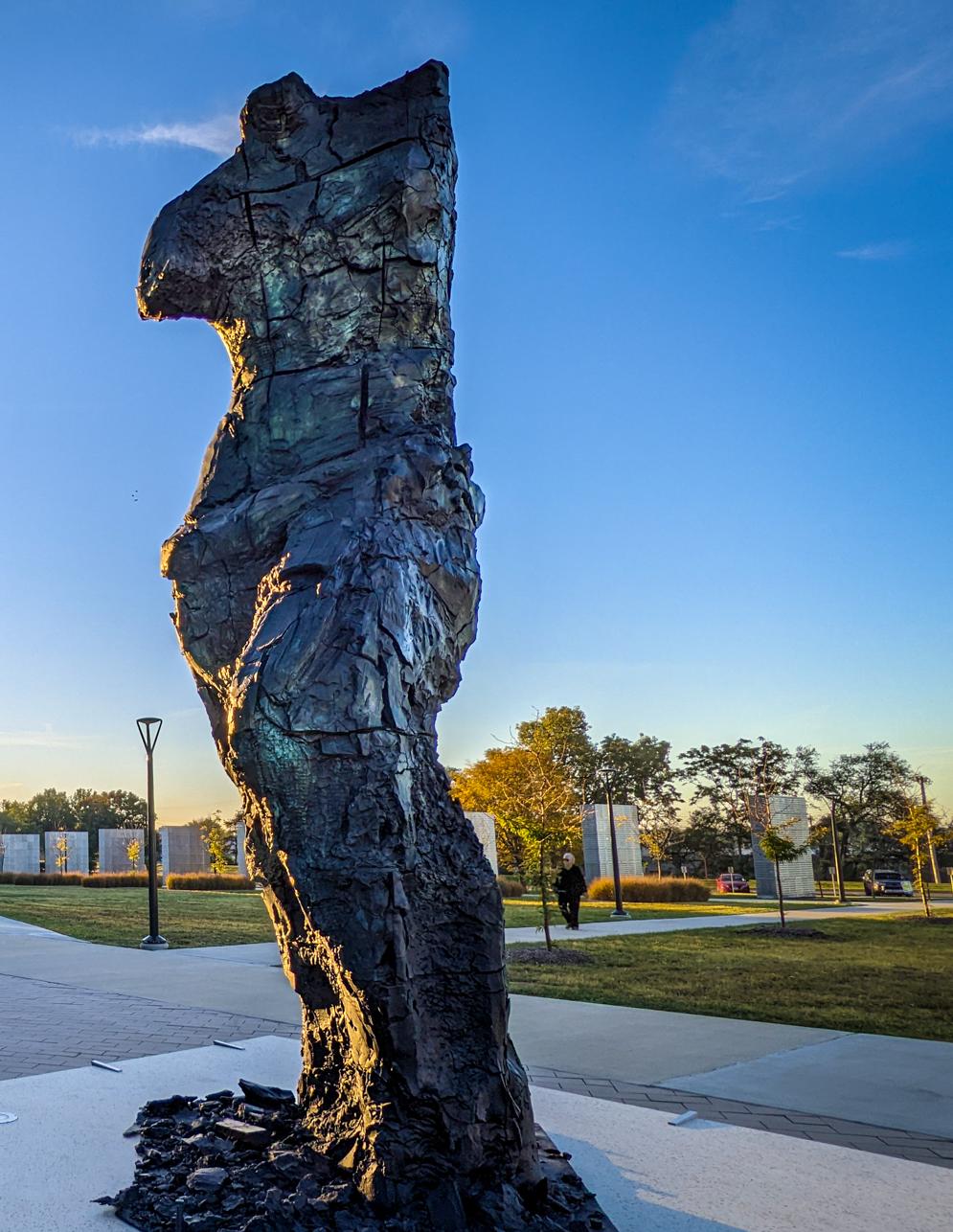
Florissant Valley offers unique programs like deaf communications and has nationally-recognized programs in art, childcare and deaf communication. The childcare program has an on-site Child Development Laboratory Center, which is a national model, licensed by the state of Missouri and the National Association for the Education of the Young Child. The art program was the first two-year accredited art program in the country.
FOREST PARK
Steps away from the world-famous Saint Louis Zoo, Forest Park and the Saint Louis Science Center, the Forest Park campus is in the heart of the city. Along with its vibrant campus life and active athletic programs, the campus provides students with access to general education coursework as well as degrees and certificates in many highdemand fields in health care, information technology and culinary arts.
Forest Park’s Center for Nursing and Health Sciences is home to approximately 900 students in nursing and health sciences professions. The state-of-the-art learning center includes a dental clinic, science labs and classrooms, teaching areas and innovative space in a four-level, 96,000 square-foot building. The center, which opened in 2019, was built in response to the region’s need for more skilled nurses and health care professionals.
The campus also boasts a National Centers of Academic Excellence in Cyber Defense (CAE-CD) program, which is jointly sponsored by the National Security Agency (NSA) and the Department of Homeland Security (DHS). In 2023, the campus celebrated the completion of its Child Development Laboratory Center, which is a 10,000-square-foot space that will be used to care for children ages six weeks to preschool, modeled after the facility at the Florissant Valley campus.
STLCC CAMPUSES

MERAMEC
Meramec’s 78-acre campus in the heart of Kirkwood, Missouri, is home to a robust traditional college student population as well as a vibrant community of adult learners. Along with completing their general education coursework, Meramec students can choose to pursue degrees and certificates in more specialized areas such as nursing and horticulture. The campus also houses two nationallyrecognized programs in fine arts and visual technologies.
Students in these programs receive training on state-ofthe-art equipment. They can also complete integrated coursework in the areas of architectural design, digital media, interior design, landscaping design and video editing. Meramec’s kitchen and bath design certificate program is the only one in the region accredited by the National Kitchen and Bath Association and the National Association of Schools of Art and Design.
WILDWOOD
The College’s presence in West St. Louis County extends back to 1984 when it leased space in an office at Clayton and Clarkson roads. In 1989, STLCC moved the West County Education Center to the Barn at Lucerne in Ballwin. In 2000, the College embarked on an ambitious plan to open a new campus on 132 acres of land in West County.
Classes at Wildwood began in fall 2007. Initially, the campus offered a predominantly general transfer education. Over the years, Wildwood has added new programs including nursing, emergency medical technology and American Sign Language, to name a few. In 2017, the campus began offering a robust Early College program to provide an avenue for juniors and seniors to complete an associate degree while simultaneously completing their high school diploma.
Education Centers Workforce Training Centers
WILLIAM J. HARRISON CENTER
The William J. Harrison Center, located in the historic JeffVanderLou neighborhood, takes its name and mission from Dr. Harrison, an educator, historian and civil rights activist. The center provides credit and noncredit courses and contractual training to bring opportunity to an underserved area.
SOUTH COUNTY
South County is a full-service satellite location of the College, located at the intersection of Lemay Ferry Road and Meramec Bottom Road in south St. Louis County. The center offers students the same benefits of STLCC’s educational experience—quality, relevant programs, credentialed faculty and affordable tuition—in their community.
CENTER FOR WORKFORCE INNOVATION
The Center for Workforce Innovation is in a 32,000-square-foot building adjacent to the Florissant Valley campus. This cutting-edge facility boasts six aerospace labs, a large equipment lab and three technical training labs (Programmable Logic Controllers, Industrial Maintenance Training and Green Technologies and Sustainable Construction).

CORPORATE COLLEGE
Located at the southeast corner of Interstates 70 and 270, the Corporate College training center offers a best-in-class experience for business events, conferences and training. In addition to providing dedicated space for corporate education and professional development, this training center is also home to the Workforce Solutions Group, the College’s entrepreneurial workforce development division.
FY2024-2026 STRATEGIC PLAN
Strategic Plan Key Themes
THEME 1 Create an Exceptional Student Experience
GOAL A
Increase enrollment and retention

1. Implement Guided Pathways
a. Eight deliverables for fall 2023
2. Improve campus life
a. Implement reimagined campus cafeteria/food services and a process for collecting feedback on student satisfaction
3. Customer service
a. Develop an integrated communications plan based on the student experience
THEME 2 Improve Operational Efficiencies
GOAL A
Process documentation, automation and training
1. Accounts Payable efficiencies
a. Workflow automation
2. Payroll efficiencies
a. Process optimization and data integrity
3. “Fix-It” process for facilities matters
a. Implement Footprints and performance metrics
The College’s strategic planning process is guided by the expertise of the project management team, using process improvement principles to guide the development and action planning. Lessons learned from previous strategic plans include narrowing the focus and creating an attainable list of initiatives that can create a meaningful impact during the plan timeframe. The plan is a living document and more goals will likely be added through 2026.
THEME 3
Become a “Best Place to Work”
GOAL A
Recognition of STLCC as one of the “best places to work” in the St. Louis region as measured by an employee and faculty survey
1. Increase benefits awareness for employees
a. Update and implement Total Compensation statements
b. Develop a centralized online source for benefit information
2. Improve internal communications
a. Gather feedback and themes from Engage and Listen sessions to create an employee engagement action plan
b. Improve and consolidate district-wide email communication and explore intranet solutions
3. Diversity, Equity, Inclusion and Belonging (DEIB) initiatives
a. Create a comprehensive DEIB professional development library for faculty/staff
b. Register STLCC with the Campus Pride Index
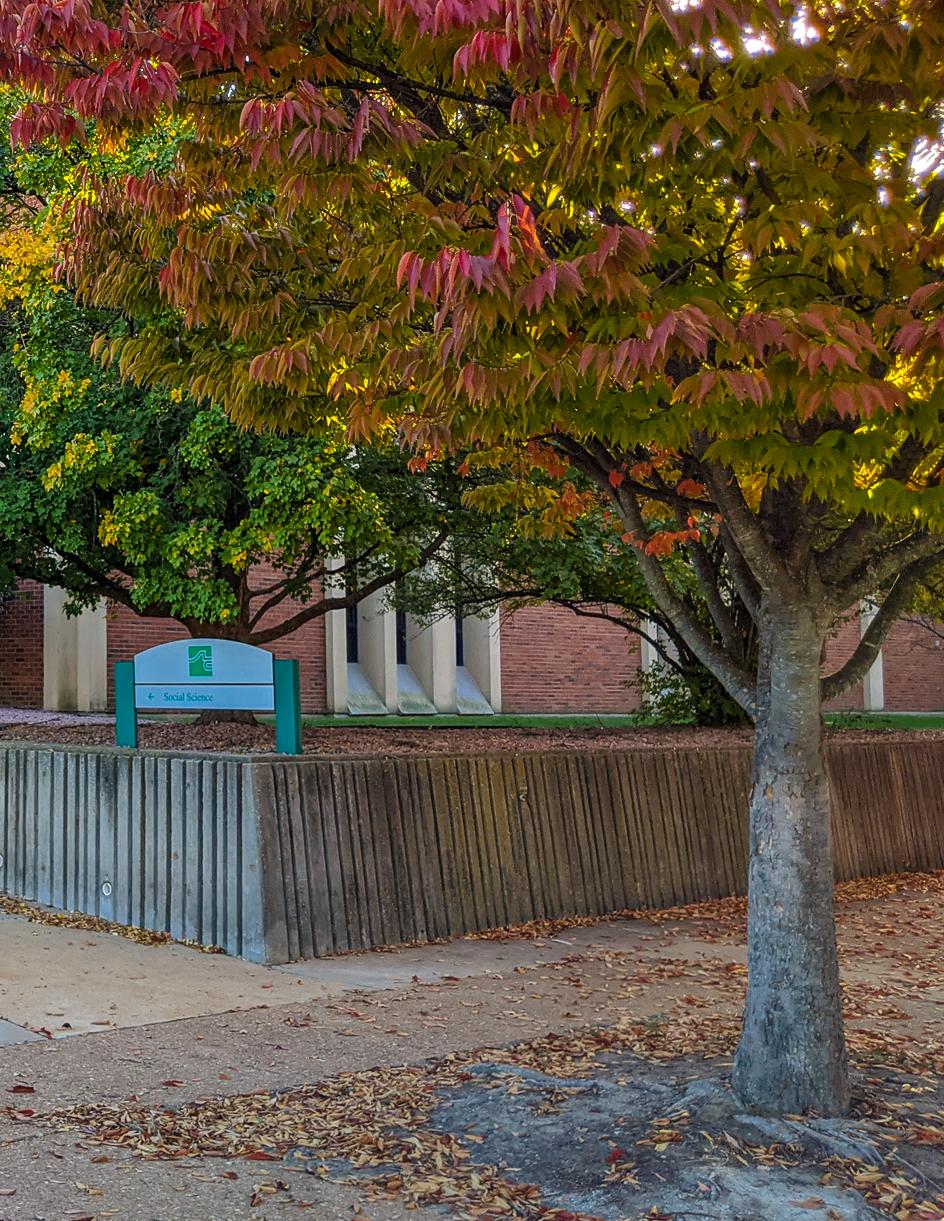
4. Performance management and professional growth
a. Automate and refine the performance management process
b. Develop and roll out core management skill training
c. Implement a cohesive Learning Management System
STUDENT ENROLLMENT & DEMOGRAPHICS DATA
Starting with a modest inaugural class of 798 students in 1963, the College made impressive strides, surpassing the noteworthy milestone of 10,000 students by 1967. Fast forward to the 2022-2023 academic year, when the College proudly served 32,921 students, including credit and non-credit.
Despite recent challenges, including the impact of the COVID-19 pandemic, the College has demonstrated resilience in the face of enrollment decline. Throughout its history, St. Louis Community College has remained steadfast in its commitment to serving a diverse student population, diligently working toward providing historically underrepresented individuals with enhanced opportunities for higher education.

24
League for Innovation SELF STUDY 2023 STLCC

25

League for Innovation SELF-STUDY 2023 STLCC 26

27
GRADUATION OVER TIME
Since 2015, graduation rates have risen under Chancellor Pittman’s leadership.

28 League for Innovation SELF-STUDY 2023 STLCC


29 2014-20152015-20162016-20172017-20182018-20192019-20202020-20212021-20222022-2023
FINANCIAL STABILITY
FINANCIAL SUSTAINABILITY
Creating a Strong Foundation
St. Louis Community College has made significant progress toward strong financial sustainability under Chancellor Jeff Pittman’s leadership. When he arrived in 2015, the College was faced with an $8 million budget deficit due to a variety of issues, including declining enrollment.
In addition, the budget exceeded board policy as over 75% of annual expenditures were dedicated to employee salaries and benefits. Clearly, changes had to be made, including the difficult move to reduce faculty, staff and programming that lacked student enrollment or student success. These changes, although challenging, were needed to place the College on a path to improved financial health.
The College now offers quality sustainable educational programs due to its superior financial position and diversified annual revenue sources. As of June 30, 2022, the College had an unrestricted net position of approximately $101 million which exceeded the board policy target of $85 million. These excess funds, along with future identified designated funds, are earmarked for capital projects associated with STLCC Transformed, a construction and renovation program that will add six new buildings across four campuses.
The College is in a unique financial position because its annual revenue comes from varying sources that are generally mutually exclusive. For the year ended June 30, 2022, the College received approximately 36% of its yearly funding from local property taxes.
30 League for Innovation SELF-STUDY 2023 STLCC
As a percentage of budgeted revenue, local taxes are estimated to grow in future years, exceeding 50% of gross revenue. This is due to a recent local tax increase ($30 million annually) approved by the voters of community college district in support of STLCC Transformed. The total estimated cost of the STLCC Transformed initiative is more than $450 million.
Other major annual revenue sources are state aid (36% of revenues) and student tuition and fees (12.5% of revenues). The remaining budgeted revenues (15.5% of revenues) include government and private grants along with miscellaneous revenue.
Due to the College’s strong financial position and support from taxes and state funding, tuition and fees have not increased for three consecutive years. As a percentage of total revenues, student fees have gradually fallen. While increases may be required in the future, the College is committed to keeping tuition and fees low to further enhance the value proposition for students.

31
STLCC FOUNDATION
Foundation Links Community Support to Student Success

OVERVIEW
The St. Louis Community College Foundation provides scholarships to ease some of the financial burdens facing students. Donors, individuals, organizations and some of the St. Louis area’s largest companies recognize every gift has a meaningful impact, and that investing in students means investing in the region’s workforce. This level of support underscores confidence in the College by the St. Louis community, businesses, friends, alumni and public leaders.
LEADERSHIP
The foundation has a small, efficient staff and a governing board comprised of 45 civic and industry leaders from the St. Louis region. Board members’ organizations partner with the foundation and College to sponsor events and various student-centered projects. Foundation board members serve as ambassadors for the College and help establish connections between their industries and our students.
FINANCIAL SUPPORT
The foundation’s asset base grew from just over $3 million in 2011 to more than $13.5 million in 2021. This remarkable growth over 10 years is due to strong, dedicated financial leaders within the foundation and board of directors and generous community monetary support.
32 League for Innovation SELF-STUDY 2023 STLCC
The foundation annually awards hundreds of tuition scholarships, totaling over $400,000 during fiscal year 2023 alone. The foundation also administers program retention funds to address unplanned challenges for students close to graduation and awards to assist students with the costs of supplies needed for dental hygiene, culinary arts and other programs.
FUNDRAISING
For the past 15 years, the foundation has generated millions of dollars in revenue by hosting the annual Falling in Love in Five Courses Gala – a unique, large scale, high-end fundraiser. Students from STLCC’s award-winning culinary arts program work with a nationally-renowned celebrity chef in the prestigious Four Seasons St. Louis kitchen and prepare more than 300 multicourse meals. Industry leaders from the St. Louis area support and hear from current student and alumni speakers.
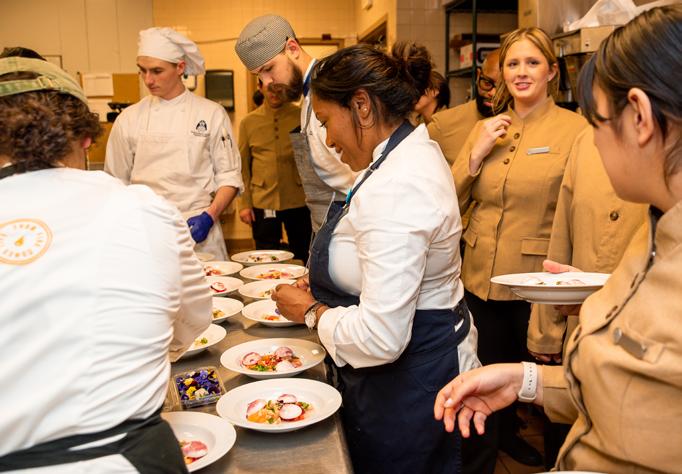
The foundation initiated “Opportunity for All: A Campaign for St. Louis Community College” in 2019 with a goal of raising $20 million for collegewide programs and student support.
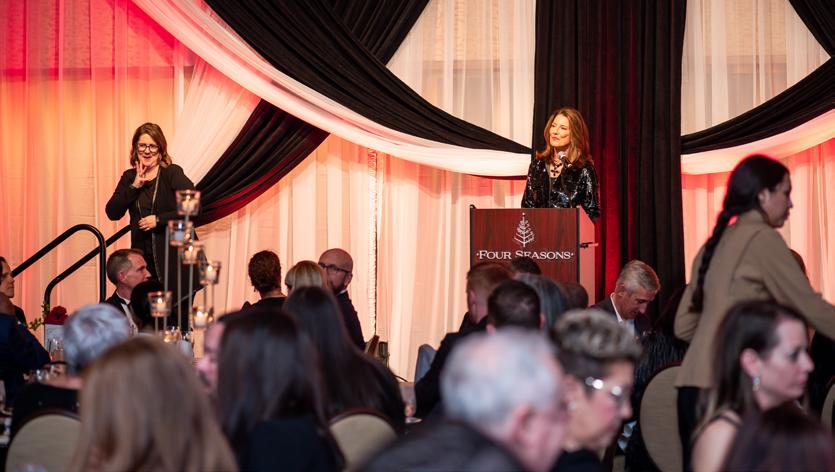

Fundraising eclipsed $23 million in fiscal year 2021, surpassing the initial goal. Major campaign gifts received include $1 million from Bank of America, $500,000 from PepsiCo Foundation and $120,000 from Anthem.
COMMUNITY CONNECTIONS
The foundation assists human services organizations and local industry partners with support for new students. It offers scholarships to individuals from College Bound, SkillsUSA, graduates of the St. Louis Library Online High School program and high school seniors honored by local civic organizations, as well as book scholarships to students employed by Amazon, FedEx, McDonalds, Six Flags and the Saint Louis Zoo.
For the last 10 years, the foundation has hosted the Peterson Photography Lecture Series. This free event, sponsored by a foundation donor and College alum, features local artists with connections to STLCC. The lecture and gallery opening reconnects former students while also introducing community members and future students to the College.
33
GRANTS
Supporting Student Success
Student success is the driving force of the College’s Institutional Development (ID) office, where staff members pursue external grant funding from federal, state and local sources that is used to establish programs and offer services that benefit students.
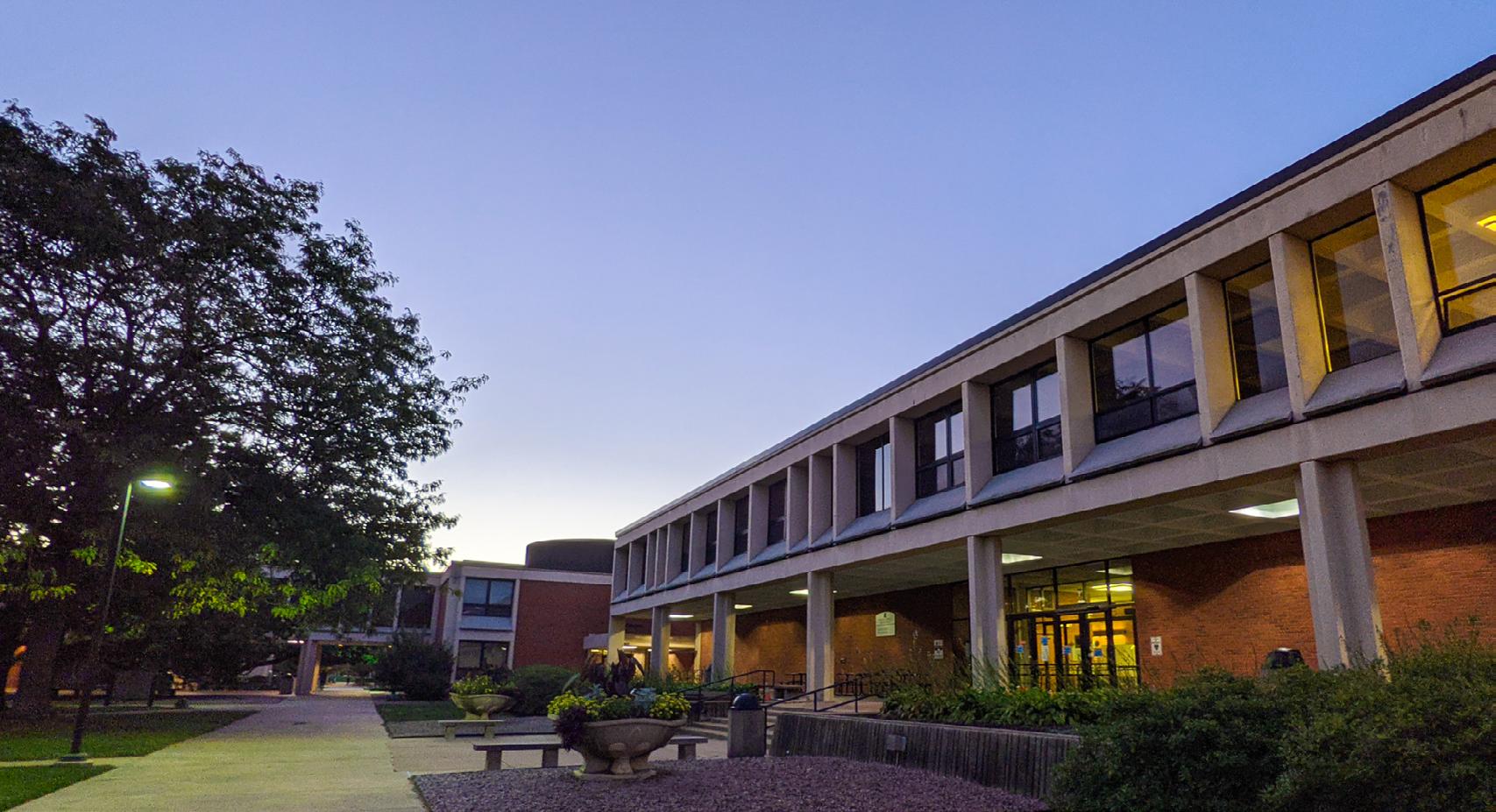
ID works with administrators, faculty and staff throughout the College to identify and apply for grants, making it possible for the College to provide practical assistance to students such as vouchers to help pay for childcare for students who have young children, academic support for low-income students who are the first in their families to attend college, workforce job training programs and pre-apprenticeships, vocational enhancement supports for students with disabilities, college prep services for high school students and more.
In 2019, the College reorganized the ID office with a renewed focus on collaborating with faculty and staff on both proposal development and post-award grant compliance,
implementing policies and procedures to pursue and properly administer grants from public sources to support innovative programming. This reorganization led to the total portfolio of grant funding managed by ID doubling annually, from approximately $15 million in FY19, to more than $30 million in FY20 and $60 million in FY21.
In FY22, the value of active grants reached over $100 million, including COVID relief funds. Excluding COVID funding, the College’s current active grants total nearly $69 million in FY23. Government grants as a percentage of total non-operating revenues also doubled, from 21% to 42% during this time.
The Office of Institutional Development is firmly established as a significant contributor to student and organizational success, a position which we expect to continue in the future.
34 League for Innovation SELF-STUDY 2023 STLCC

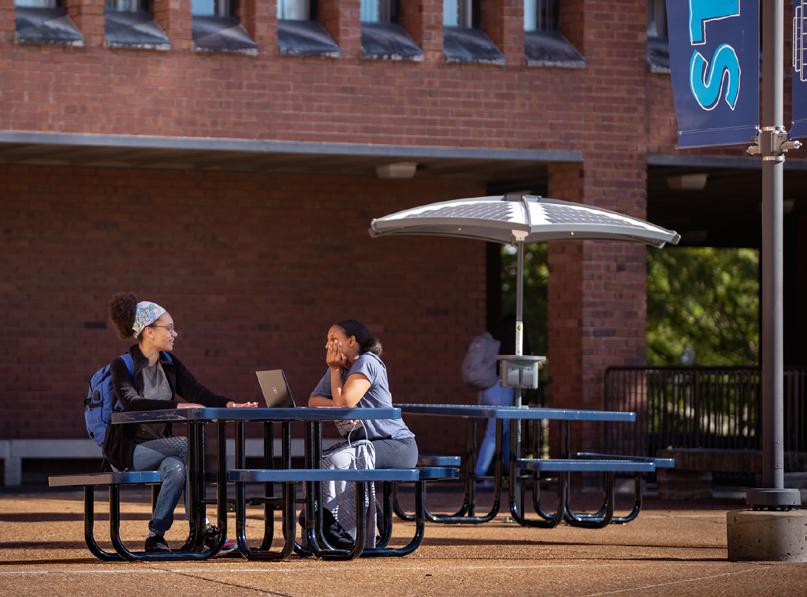
35
Grant-Funded Projects and Innovations
Funding highlights during this period of growth include:
National Science Foundation (NSF) and the American Mathematical Association of Two-Year Colleges (AMATYC)
$150,000 Teaching for PROWESS grant to fund a team of four faculty members with the goal of improving student success in math courses and testing. The team is studying transformational learning strategies and testing new learning strategies in precalculus algebra (MTH 160) and precalculus algebra with support (MTH 160S).
Overall, the team is working to create at least 32 active learning activities or projects that can be used by their colleagues across the College to boost student success in math.
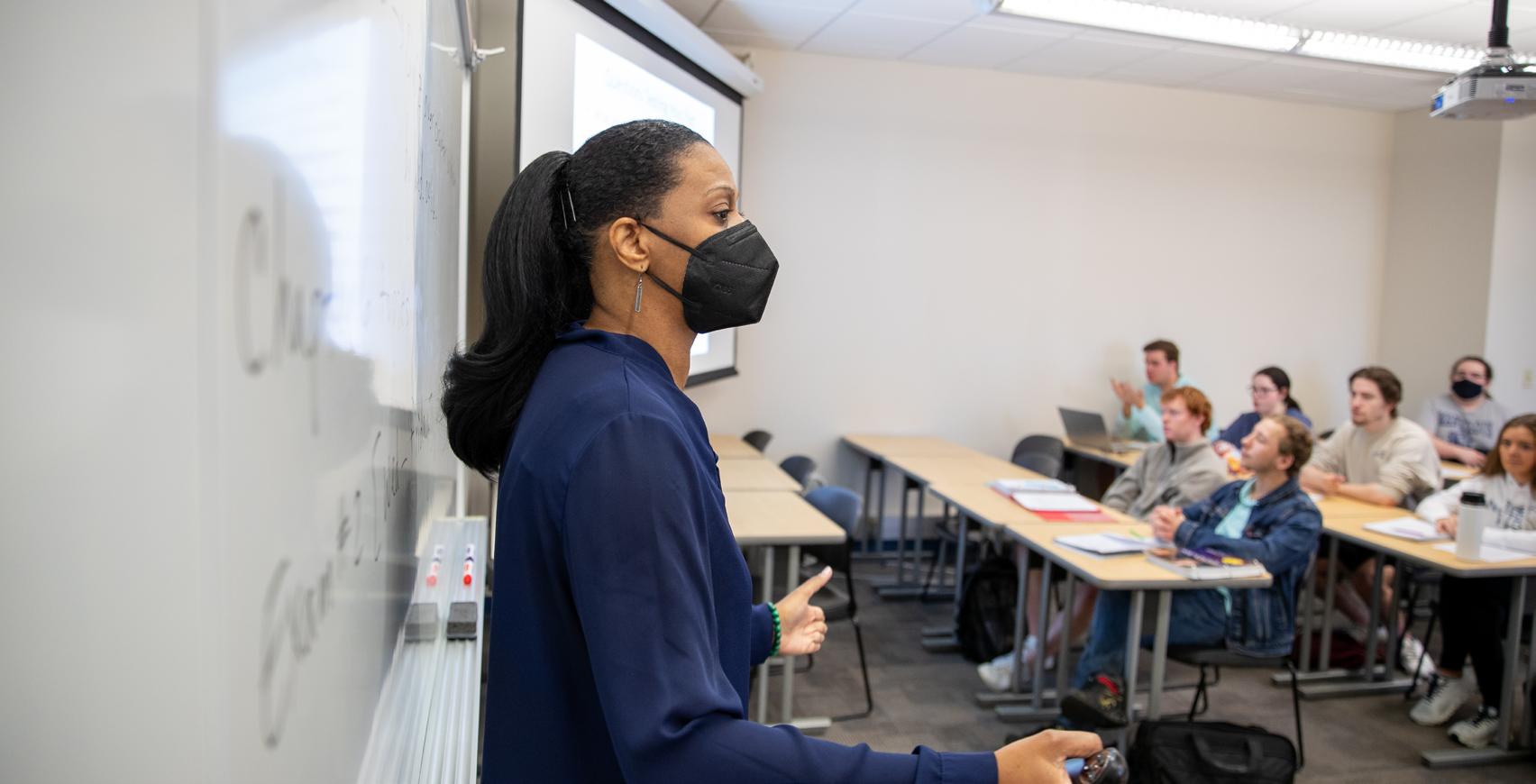
For example, the team has implemented a technique to “flip” their classes, creating videos with math content for students to watch outside of class, then using class time to work in groups. According to the faculty champions, this nationally-known best practice has been well received by students and has led to improved student learning.
Throughout this process, the faculty champions are evaluating the success of their activities using qualitative and quantitative measures. They are also organizing professional development opportunities to share their findings with colleagues across the College.
Missouri Department of Higher Education and Workforce Development (MDHEWD)
$44.2 million, which includes $3.2 million of MoExcels funding to expand health care, transportation and geospatial workforce training and education programs and $41 million in matching grants for construction of new health care and technology training and education facilities.
Missouri Department of Elementary and Secondary Education (DESE)
More than $15 million, including $4.8 million to renovate and open a Childcare Development Laboratory Center at the Forest Park campus that will train students to enter the childcare profession while providing affordable onsite childcare to students and the community,
36 League for Innovation SELF-STUDY 2023 STLCC
$9.5 million in Perkins funds for training equipment and professional development and $1 million for adult education and literacy classes.
U.S. Department of Labor (DOL) and U.S. Economic Development Administration (EDA)
$13 million from the Labor Department and $3 million from the Economic Development Administration for advanced manufacturing and other apprenticeship programs and job training equipment.
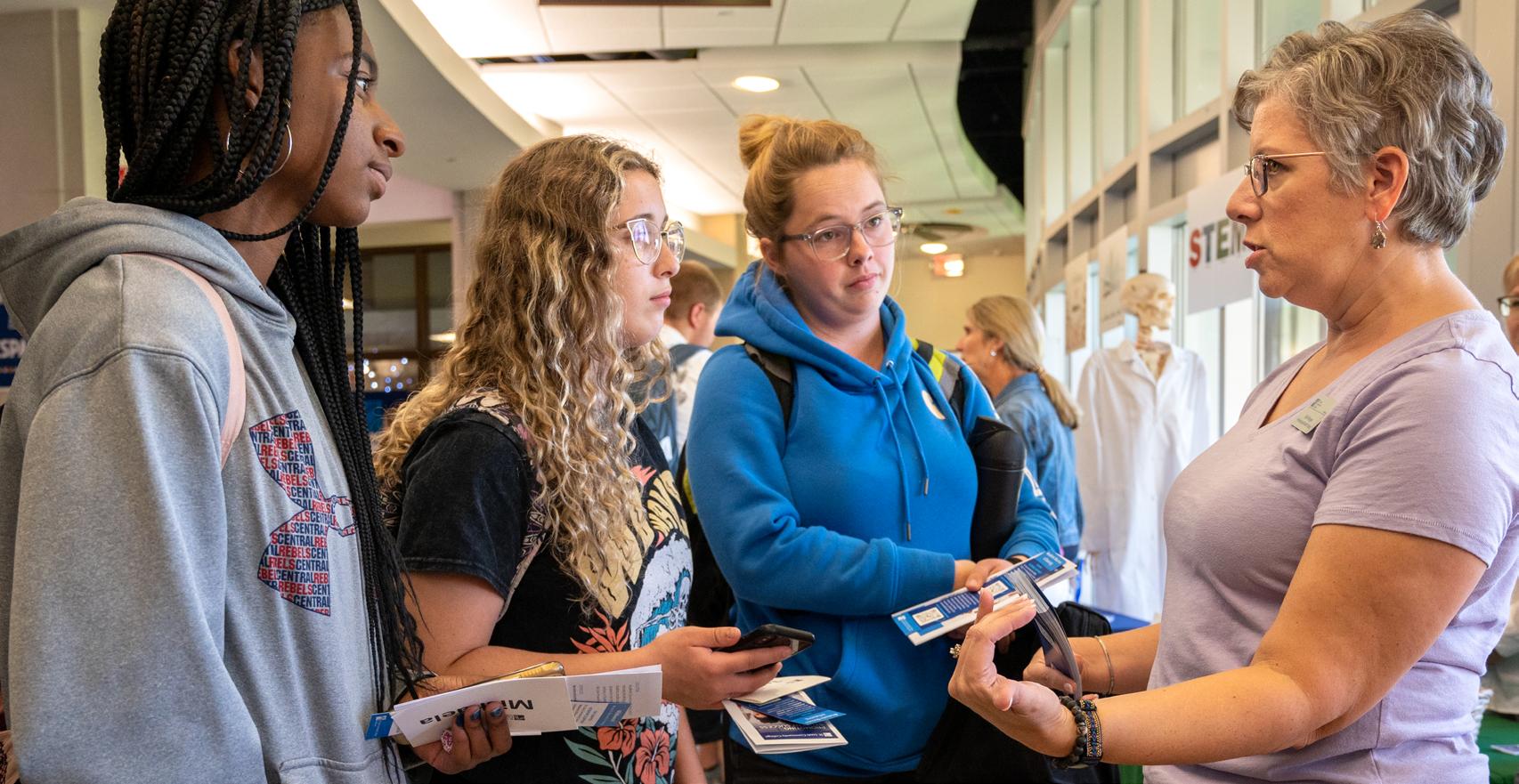
U.S. Department of Education (DOE)
$8 million for childcare subsidies as well as TRIO programs that serve low-income, first-generation students and students with disabilities, providing them mentoring, tutoring, counseling and support services starting in K-12 and continuing into higher education with a goal of improving persistence and completion rates.
U.S. Health Resources & Services Administration (HRSA)
$4 million from the U.S. Health Resources & Services Administration (HRSA) for healthcare training and education programs.
Missouri Department of Economic Development and U.S. Environmental Protection Agency (EPA)
$3.3 million for other job training programs, including $2.1 million for truck driver training from the Missouri Department of Economic Development and $1.1 million from EPA for environmental workforce job training.
37
RECRUITMENT & ENROLLMENT TRENDS
St. Louis Community College, like virtually all higher education institutions across the country, experienced enrollment declines over several years due to a significant shift in demographics, with the pandemic exacerbating the trend. Viewing this as challenge, the College sought student input on improving their experience. Experimentation with innovative recruitment and retention strategies has made STLCC stand out from its competitors.
The results are a leveling off of declines, which is a hopeful sign of the beginning of an enrollment increase trend. Exploration of new and different strategies will build on earlier work and keep enrollment trending in a positive direction.
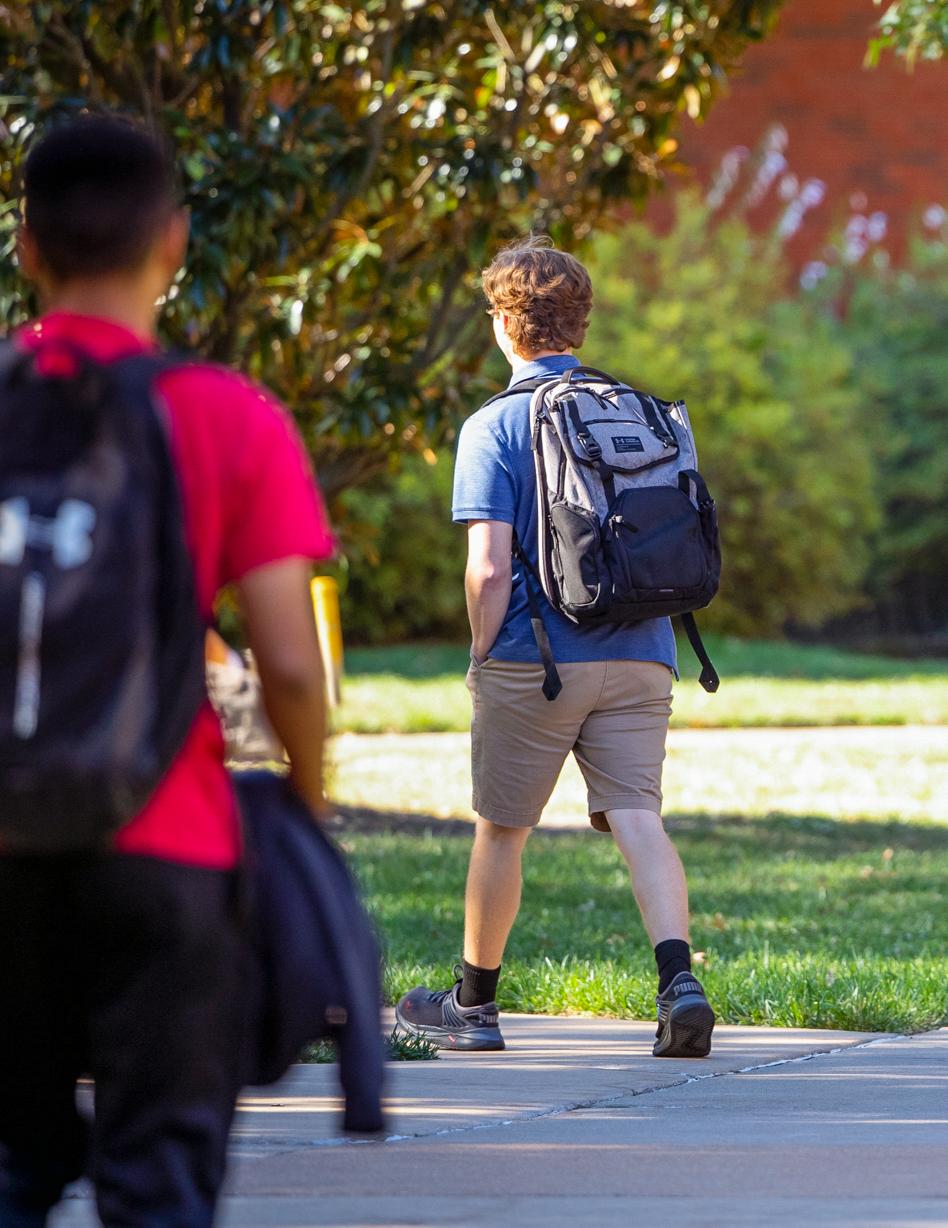
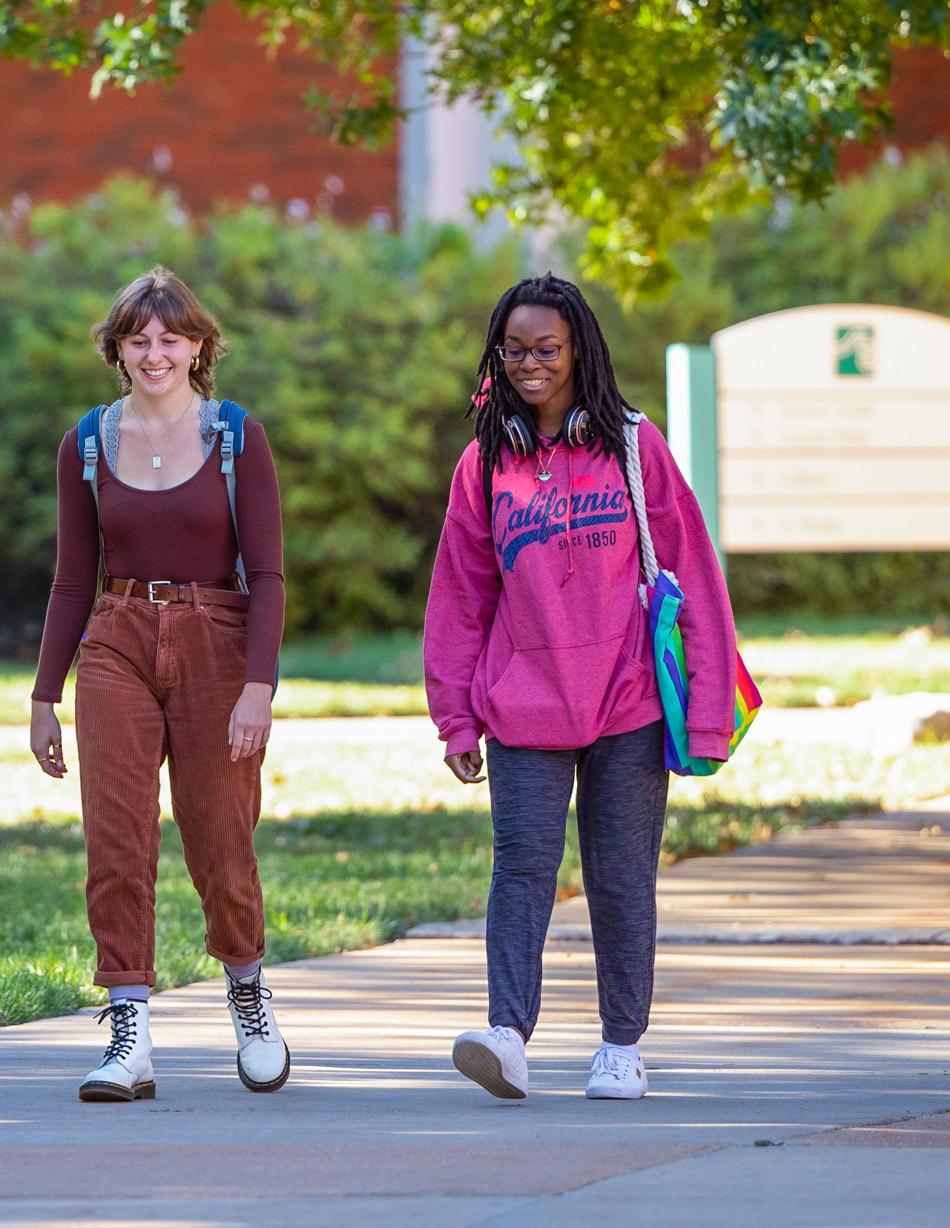
Recruitment & Enrollment Initiative
INNOVATIVE PROGRAMS HELP TO BOOST STUDENT SUCCESS
To continue to offset declines in enrollment, the College is targeting a 1% increase in the fall 2023 and fall 2024 semesters, as well as increasing the pool of prospective students. A team from student affairs, academic affairs, marketing and communications and DEI is executing a three-year plan with several components, including:
• Modernized student search to identify prospective students and outreach strategy with omnichannel outreach including print, digital, email and texting.
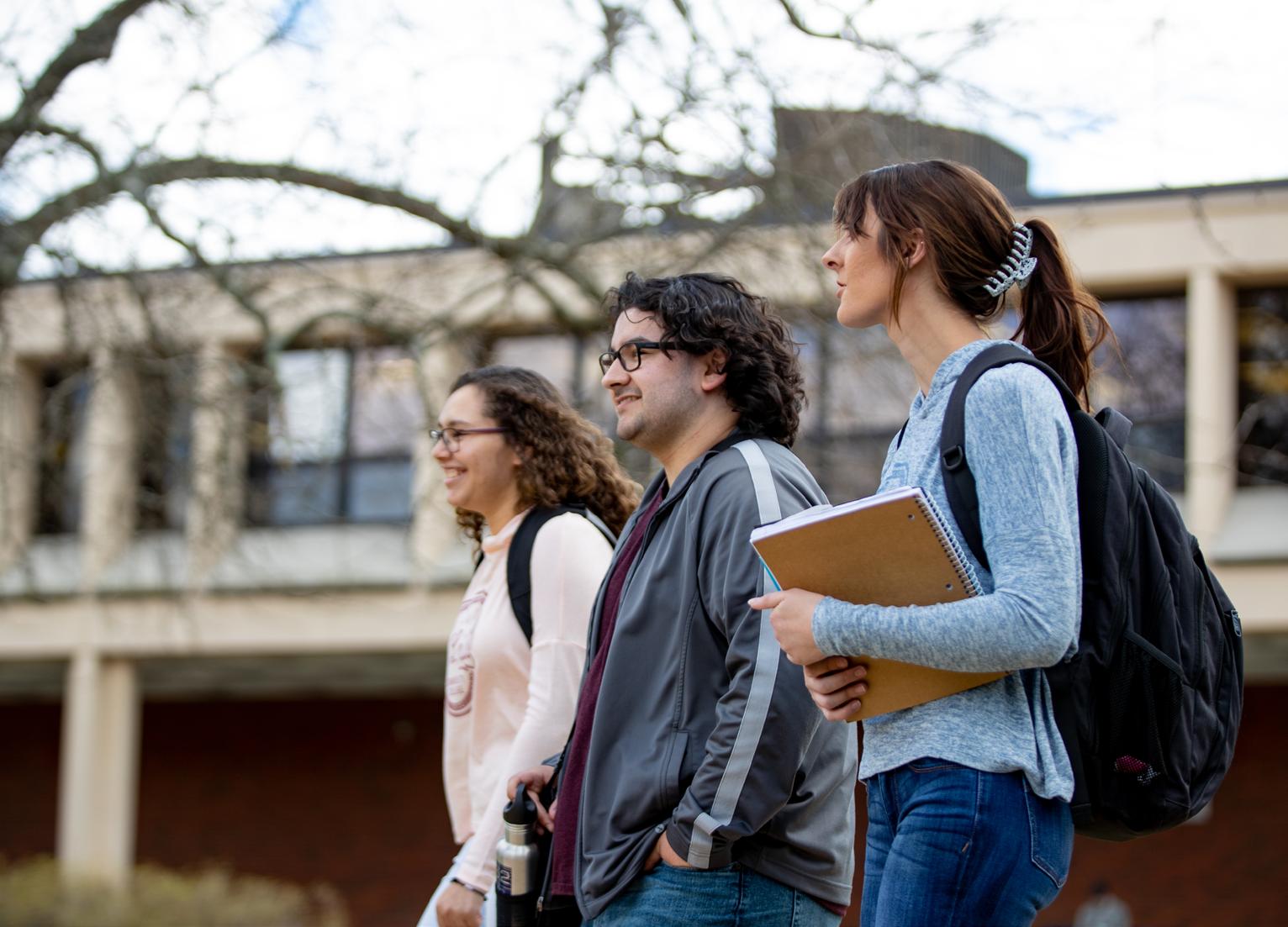
• Website search engine optimization and support for updating academic program pages.
• Developing a new annual recruitment plan with enrollment projection models and new survey data.
• Creating a new annual retention, completion and student success plan.
This important work takes place in conjunction with and in support of the Pathways model that will create a framework for students to better identify their career path, receive support and guidance along the way and successfully make it to graduation.
40 League for Innovation SELF-STUDY 2023 STLCC
Take One on Us Program
NO COST COURSES GET STUDENTS BACK IN THE CLASSROOM

Many students faced overwhelming challenges with school, work and families during COVID-19. Many others found the transition to online classes difficult and simply dropped out of their classes and programs. A year into the pandemic, many found it difficult to pick up where they left off.
The Take One on Us Program was an opportunity to reach out to students with limited resources, challenges and other barriers standing between them and higher education.
To forward this endeavor, the College implemented a scholarship available to degree-seeking students. In summer 2020, the newly created program encouraged existing and potential students to enroll in summer courses to help stay on track to earn their degree.
The program was deemed a tremendous success in 2020 with an increase in summer enrollment from 2019 to 2020. More than 1,700 students received the scholarship and the College saw an 11% increase in credit hours from summer 2019 to summer 2020.
1,700 In summer 2020,
students received a scholarship through the Take One on Us program.
The marketing and communications department was awarded a Paragon Silver Award for the “Take One on Us” flyer/ series campaign by the National Council of Marketing and Public Relations.
The Paragon Awards recognize outstanding achievement in design and communication at community and technical colleges. It is the only national competition of its kind that honors excellence exclusively among marketing and public relations professionals at twoyear colleges.
41
Black Male Achievers Program
FIGHTING A 25% DECLINE IN BLACK MALE ENROLLMENT
The Black Male Achievers (BMA) program is a free student resource that prepares incoming students for college-level courses to increase the completion and graduation rates of Black males and other underserved students enrolled at the College.
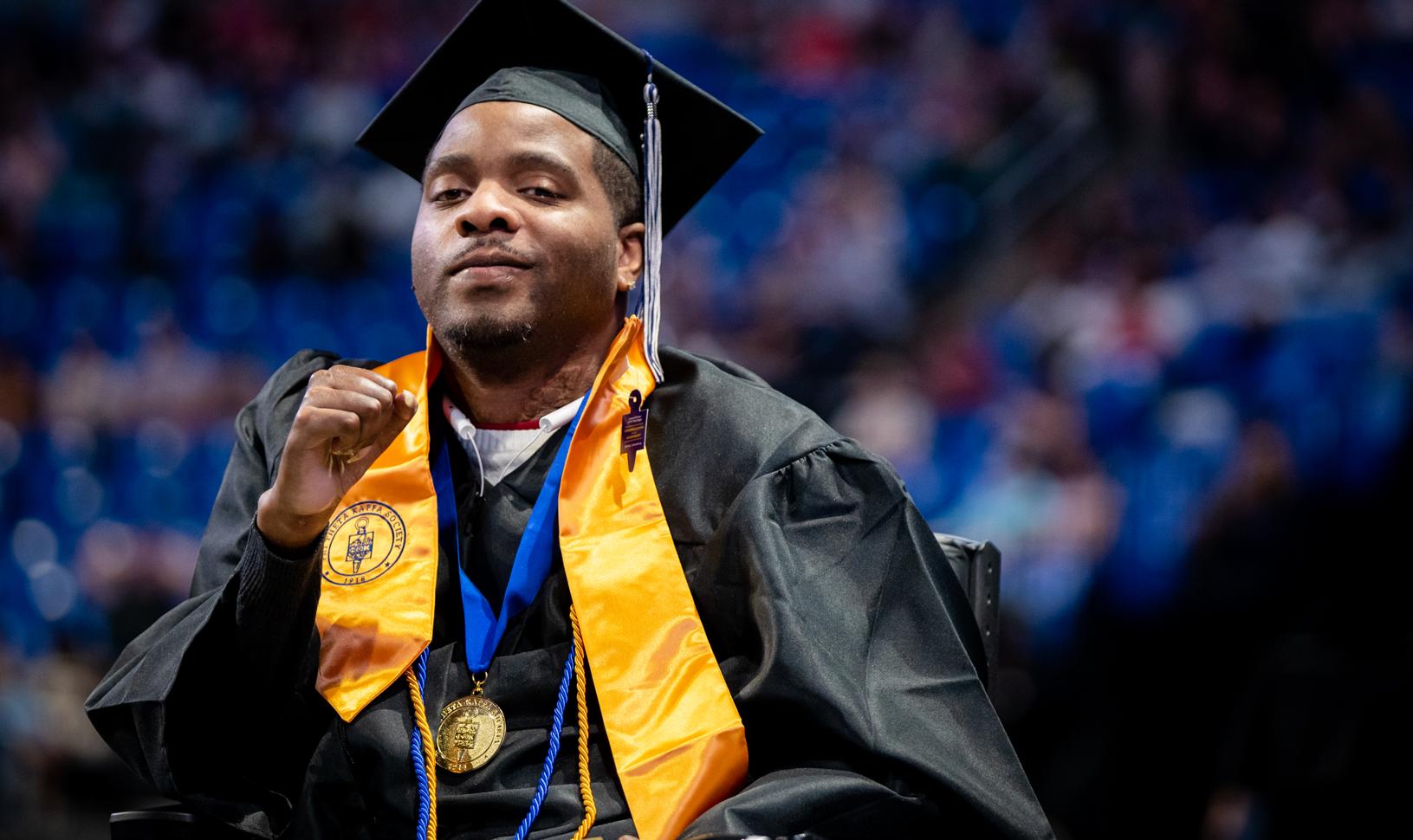
To achieve this, the program creates an environment that supports academic and career goals, connects students to financial resources for academic success and provides college and university visits and cultural events to broaden students’ horizons and enhance their life experiences.
The program begins each year during the fall semester. Before the start of the school year, students may optionally join the Black Male Achievers Academy,
a summer bridge program where two cohorts of 25 students each gather at the STLCC-Florissant Valley and STLCC-Forest Park campuses. After the summer session, these students transition into Black Male Achievers.
Seventy-three students have participated in the BMA since the College piloted the free initiative the summer of 2021. The average GPA among participants between fall 2022 and spring 2023 rose more than 3%. More importantly, the credit completion rate is up five percentage points, increasing to 74%.
42 League for Innovation SELF-STUDY 2023 STLCC
Tech Academy
TECH ACADEMY & SISTERS IN TECH OPENING DOORS TO IT CAREERS
The College partners with local business leaders to ensure students from underrepresented populations have the tools necessary to launch careers in cybersecurity, software development and network engineering.

The STLCC Tech Academy began in 2021 as a partnership with Bank of America to help and encourage Black and Hispanic students to enter information technology fields. Thanks to a partnership with Enterprise Holdings, the program expanded to include the Sisters in Tech program that encourages women of all backgrounds to enter IT fields.
Students attending the Tech Academy receive a number of resources and tools to support their success.
• Each student receives a laptop pre-loaded with the software needed in the program of their choice.
• Students receive access to a specialized retention specialist who helps them navigate their college journey.
• Students also receive financial support to close any gaps between the financial aid received and the students’ needs, plus a grant to cover the first attempt at a professional certification.
• As students begin to gain valuable work experience, the program ensures that students receive marketrate pay for an internship and will cover the gap between what a company can pay an intern and the current market rate for that specific role.
This transformative program, which currently serves 25 students, is made possible through an incredible collaboration between Student Affairs and Academic Affairs. The goal is to serve up to 200 students by 2025.
43
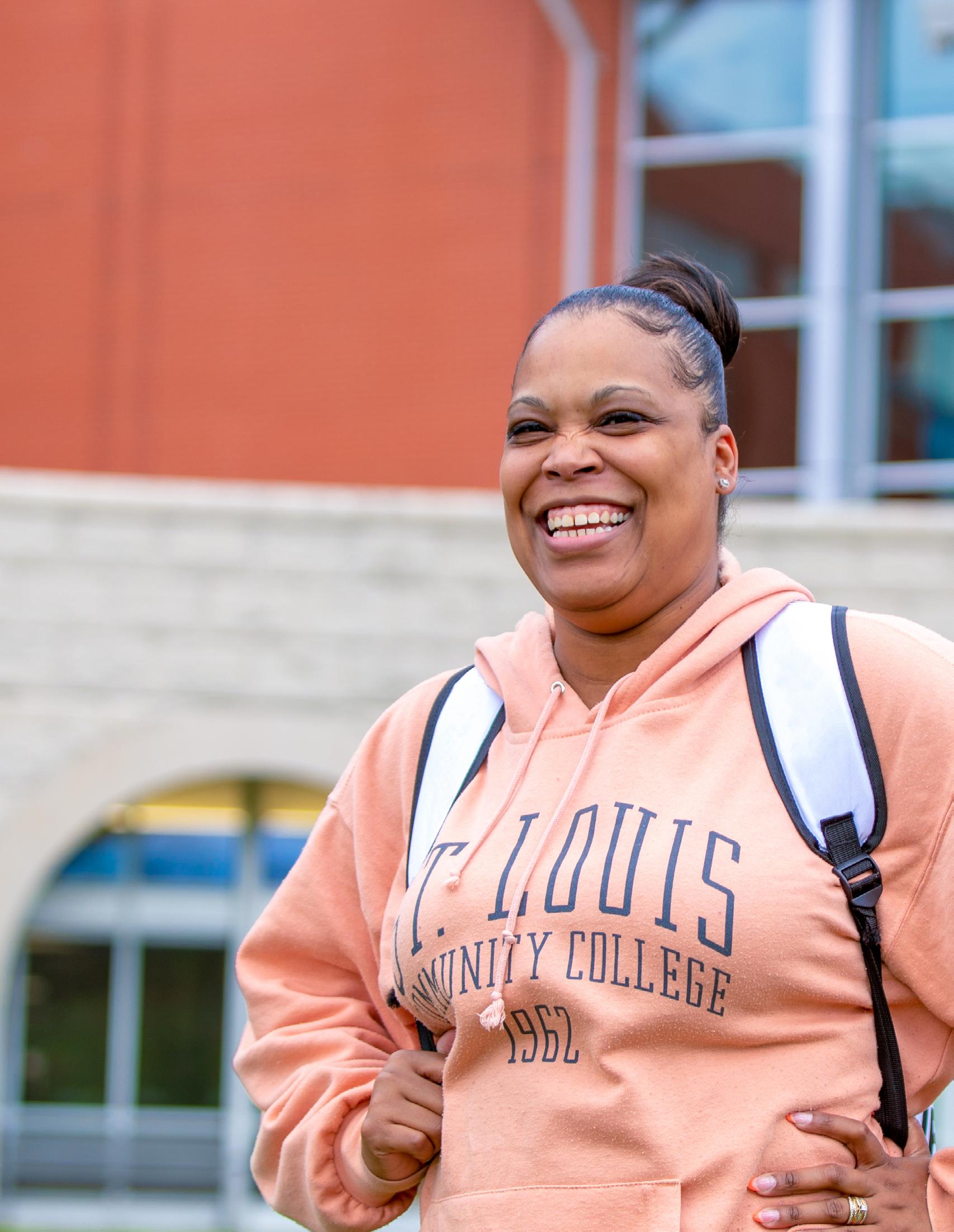
THE STUDENT EXPERIENCE TRANSFORMING
St. Louis Community College is striving to create an exceptional student experience, from transforming our physical environment with new buildings, to creating support systems and programs to help our students achieve their goals.
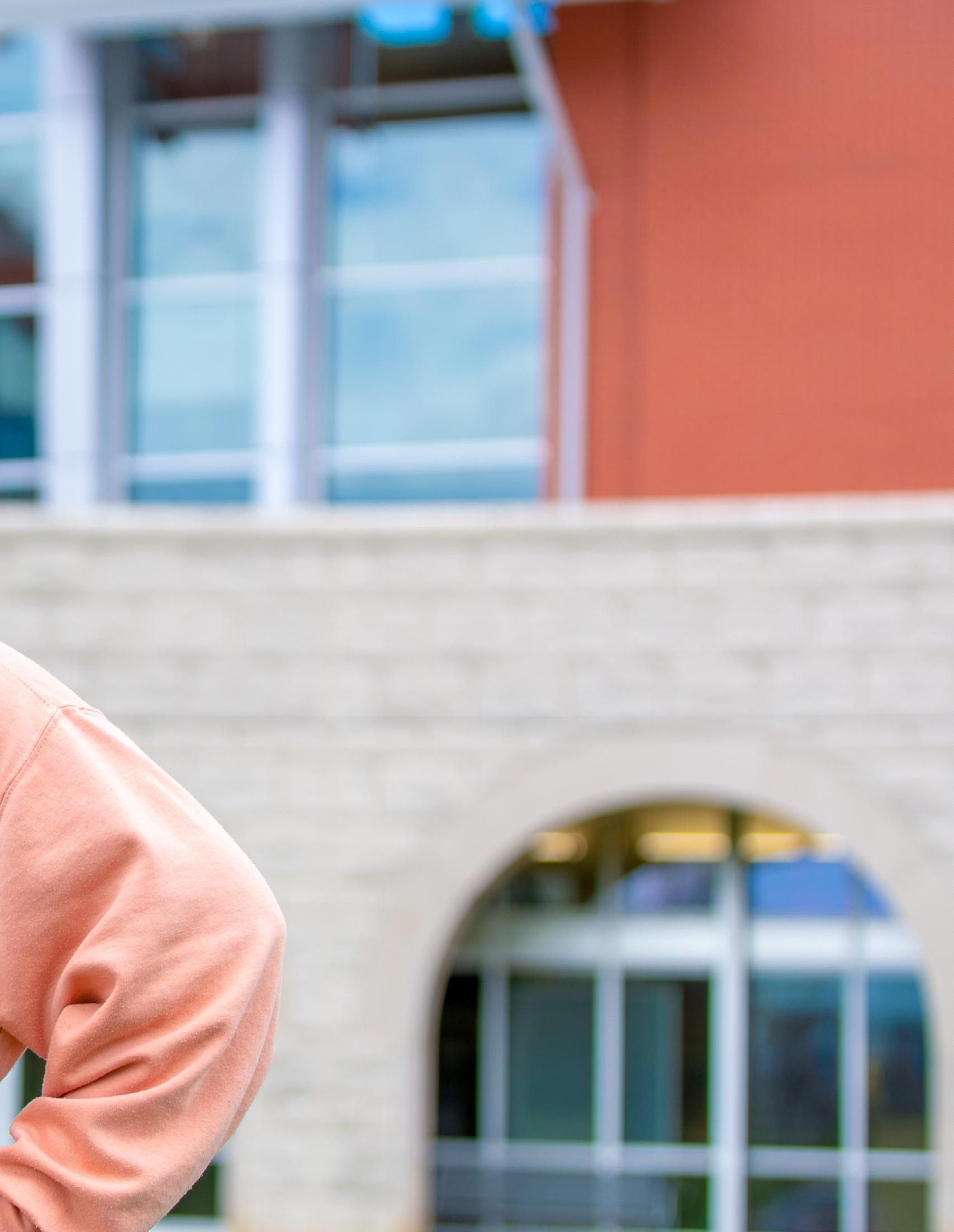
Guided Pathways KEEPING STUDENTS ON THE PATH TO GRADUATION
As a part of STLCC Transformed, which includes the expansion and state-of-the-art facilities for workforce programs, the College has been engaged with the Guided Pathways framework for some time to transform the entire student experience.
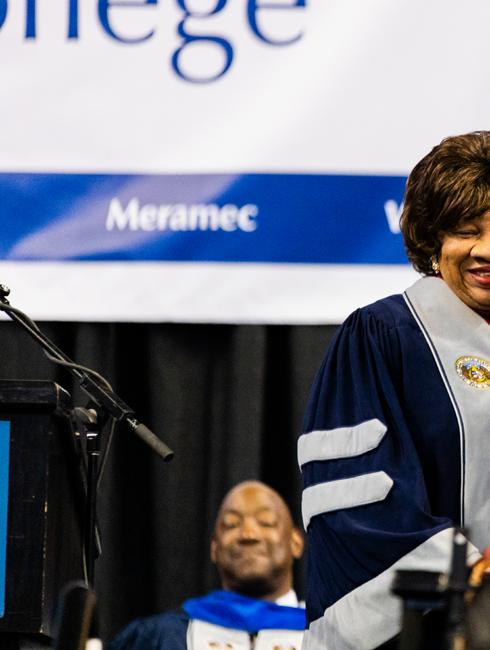
As most leaders in community colleges understand, Guided Pathways is a national movement that successfully places a focus on student access. Much work has been done, including the identification of meta-majors, the narrowing of student curriculum choices, the redesign of developmental education into a co-requisite model, a transformed student intake and student support network that focuses on student career choices and tracking students through their educational journey, and program structure that clearly maps out the pathway to completion.
The following are examples of how the Guided Pathways framework is transforming the College for the benefit of the student.
META-MAJORS
At the heart of Guided Pathways is a curriculum that illustrates coherent pathways that students can easily follow to completion. Recently, the College completed the identification of six meta-majors, which includes:
• Science, Technology, Engineering and Math
• Education, Public Service and Social Sciences
• Health Professions
• Advanced Manufacturing, Industrial Occupations and Transportation
• Communication, Design and Creative Arts
• Business, Culinary Arts and Hospitality
The College has also dramatically reduced the number of transfer pathways for students to help students avoid confusion and taking excess credit hours, to focus directly on the state’s Core 42 Transfer effort and to aid in student completion.
While work continues to provide clear, coherent pathways for students, the College is already realizing an increase in its IPEDS graduation rate over the past eight years, doubling the graduation rate since 2015.
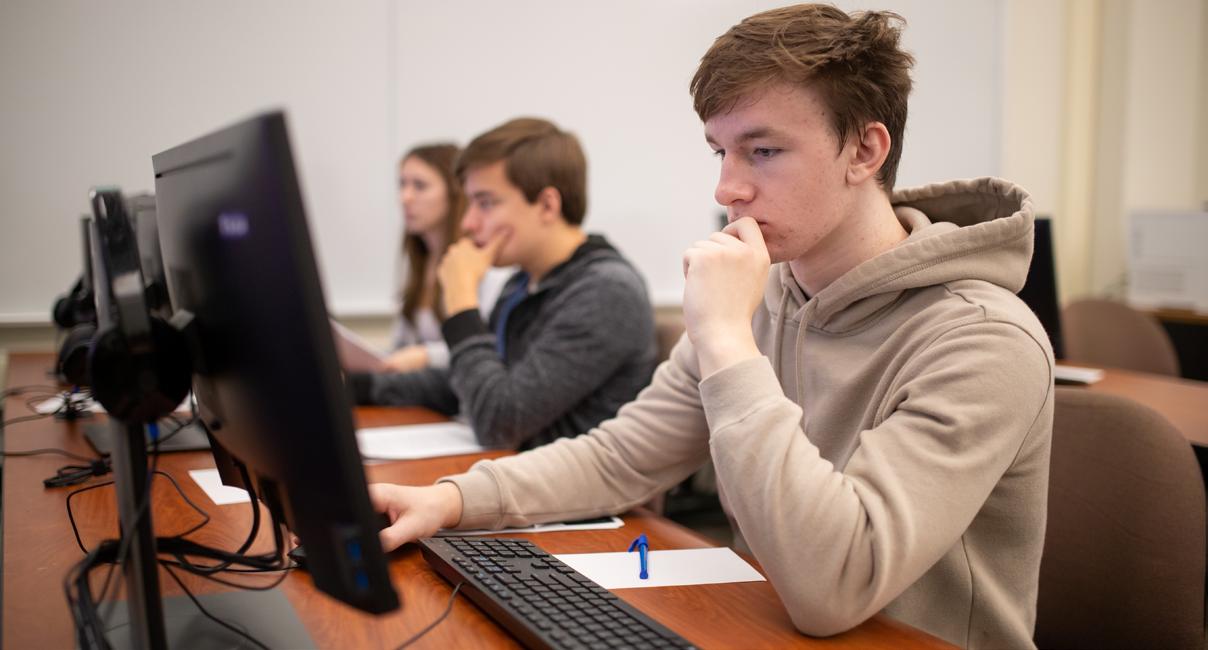
46 League for Innovation SELF-STUDY 2023 STLCC
Academic and Career Advising
FORWARD-THINKING ALIGNMENT OF ADVISING SERVES STUDENTS

The College transformed the entire student academic journey to ensure students have an eye on their academic and career objectives from day one.
The student affairs department underwent a redesign and shift in the advising experience. Students no longer receive a transactional service focused on the credits required to finish a program, but instead an ongoing conversation and partnership focused on career objectives.
Each degree-seeking student is assigned a student success advisor who proactively engages students in academic, transfer and career planning. These advisors serve as a “hub” to ensure students maximize the supports the College offers to meet their personal needs and goals.
This redesign began in 2018 and entered a new phase in 2023 with the formal integration of academic and career advising. Students now have a streamlined experience for identifying and aligning their academic and career goals, while developing skillsets needed to overcome obstacles along the way.
These changes have served the students well and have been well received. In the fall 2022 semester, 87% of degreeseeking, first-time college students met with a student success advisor. The return rate of students also improved, with 70% of students who met at least once with an advisor returning for the 2023 spring semester, compared to 65% of students overall.

47
First Year Experience (FYE)
IMPROVED FIRST-YEAR EXPERIENCE LEADS TO GREATER STUDENT PERSISTENCE
The College changed its approach with first-year students through its New Student Programs by embracing a cocurricular model that encourages students to regularly engage in campus events and services. The benefits have proven striking.


The College has identified a significant impact on the gap in persistence between white and Black students for students who participated in First-Year Experience (FYE) activities. The persistence gap overall at the College is approximately 20%, but closer to 2% between white and Black students who participate in FYE programming. Overall, the stop-out rate among students who do not attend these FYE events is just above 26%. That number decreases to less than 10% for students who attend FYE events.
New Student Programs has helped more students integrate into the College’s community. It hosts three or more seminars, lunches or hands-on workshops that align with monthly modules centering on campus involvement, goal setting, financial literacy, study skills, wellness and more. Each event focuses on skills crucial to student success and empowers students to navigate resources on their own.
Upon enrolling, a first-year student is added to a Microsoft Teams channel that staff use to promote opportunities and events and students can ask questions and get advice. The program also features FYE student leaders, who provide an outlet for new students to ask questions from someone who recently went through their first year at the College.
48 League for Innovation SELF-STUDY 2023 STLCC
Purpose First
PUTTING “PURPOSE FIRST” PROVIDES STUDENTS A PATH TO EMPLOYMENT

The College puts “purpose first” to help students reach degree completion, including the adoption of Guided Pathways to clarify end goals and how to get there.
It is imperative that all students, but especially those in underrepresented groups such as Black, indigenous, Latino and other people of color, understand the value of and opportunities provided by postsecondary education — not only to them as students but also to their families and within their communities. By putting “purpose first,” we offer students their “why,” which motivates them to sustain the work and succeed in college.
In partnership with Complete College America (CCA) and with funding from Missouri College & Career Attainment Network, the College is participating in a Purpose First pilot program. The College earned a three-year grant of $10,000 per year to implement the program, along with a dedicated coach from CCA to provide support.
As part of the Guided Pathways work, the academic advising and career development departments integrated to better understand students’ needs and provide an individualized plan from enrollment to employment. The College used the Community College Research Center’s Ask-Connect-InspirePlan model to create a system to make certain that career conversations took place during most student engagements in both areas.
Both departments track students’ career decision status to ensure they adjust to and accommodate each student’s needs based on their stage in the process. This pilot will help guide the College’s continued work and allow for an enhanced level of engagement, best practices and accountability.
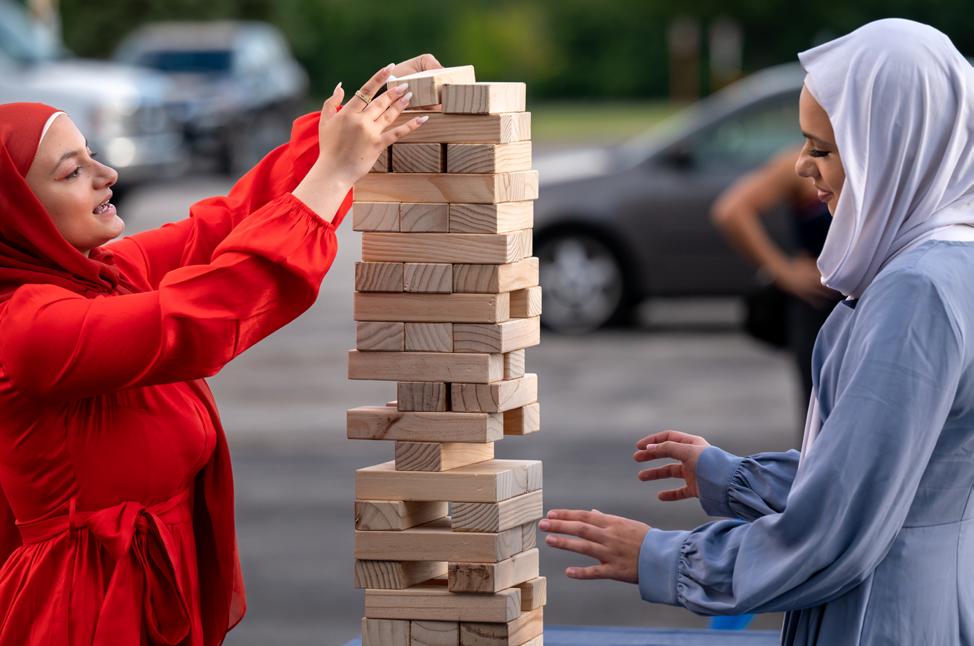
49
Supporting Diverse Populations
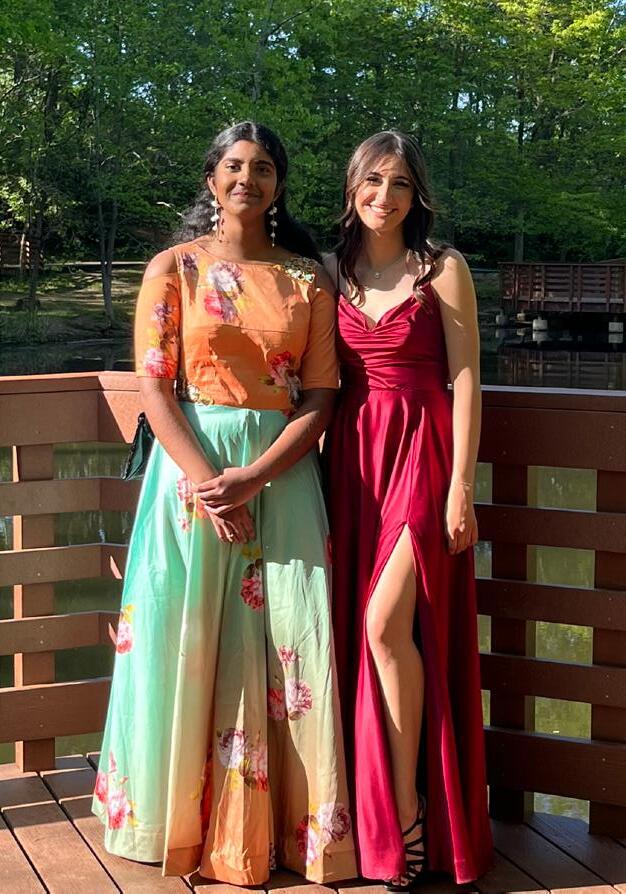
PROMOTING EQUITY IN STUDENT SUCCESS AND STAFF SATISFACTION
As evidenced by national data, demographic factors such as race, ethnicity and family income substantially influence whether students will attend and graduate from college. To help close these equity gaps in student success, St. Louis Community College has formed strong and intentional community partnerships with the Missouri College & Career Attainment (MOCAN), Postsecondary Equity Network (Pen) and Complete College America (CCA).

These partnerships allow faculty and staff to stay informed on emerging research regarding barriers to student success, learn evidence-based strategies by subject matter experts and receive ongoing professional development opportunities. Additionally, these partnerships require the College to track and report disaggregated student success outcomes, which are subsequently compared with other Missouri institutions for macro-level analysis and action planning.
In addition to offering a variety of clubs and organizations that promote an atmosphere where all
students feel welcome and appreciated, STLCC staff can also join any of several employee resource groups (ERGs) available regardless of race, color, national origin, gender, gender expression, age, disability, protected veteran status, religion and any other status protected by applicable state or federal law. These voluntary groups unite and bring together people around their common interests, backgrounds or identities.
In fall 2022, STLCC was one of six Missouri institutions invited to participate in CCA’s Intermediaries for Scale (IFS) Institutional Transformation Initiative, which seeks to achieve equitable student outcomes through deep-level assessment and reflection on institutional practices over a five-year period. Other key aspects of this initiative include onboarding to the Postsecondary Data Partnership for data capacity building, developing a common definition for “student success,” and working with an assigned service partner through CCA to develop and implement technical assistance plans and timelines based on institutional needs.
Access Allies
ACCESS ALLY SUPPORTS, EMPOWERS STUDENTS TO NAVIGATE THEIR COLLEGE JOURNEY
The COVID-19 pandemic created new obstacles that students worldwide had to overcome to achieve success in their course of study. At STLCC, the disrupted schedules and limited modalities for courses highlighted how quickly some students were falling behind due to underdeveloped computer and organizational skills.
For some students receiving services through the STLCC access office, these obstacles seemed insurmountable.
Access staff created a transformational program, Access Ally, to provide custom-tailored support to students in need of coaching on how to navigate their college journey. The program matches students with a coach who assists with
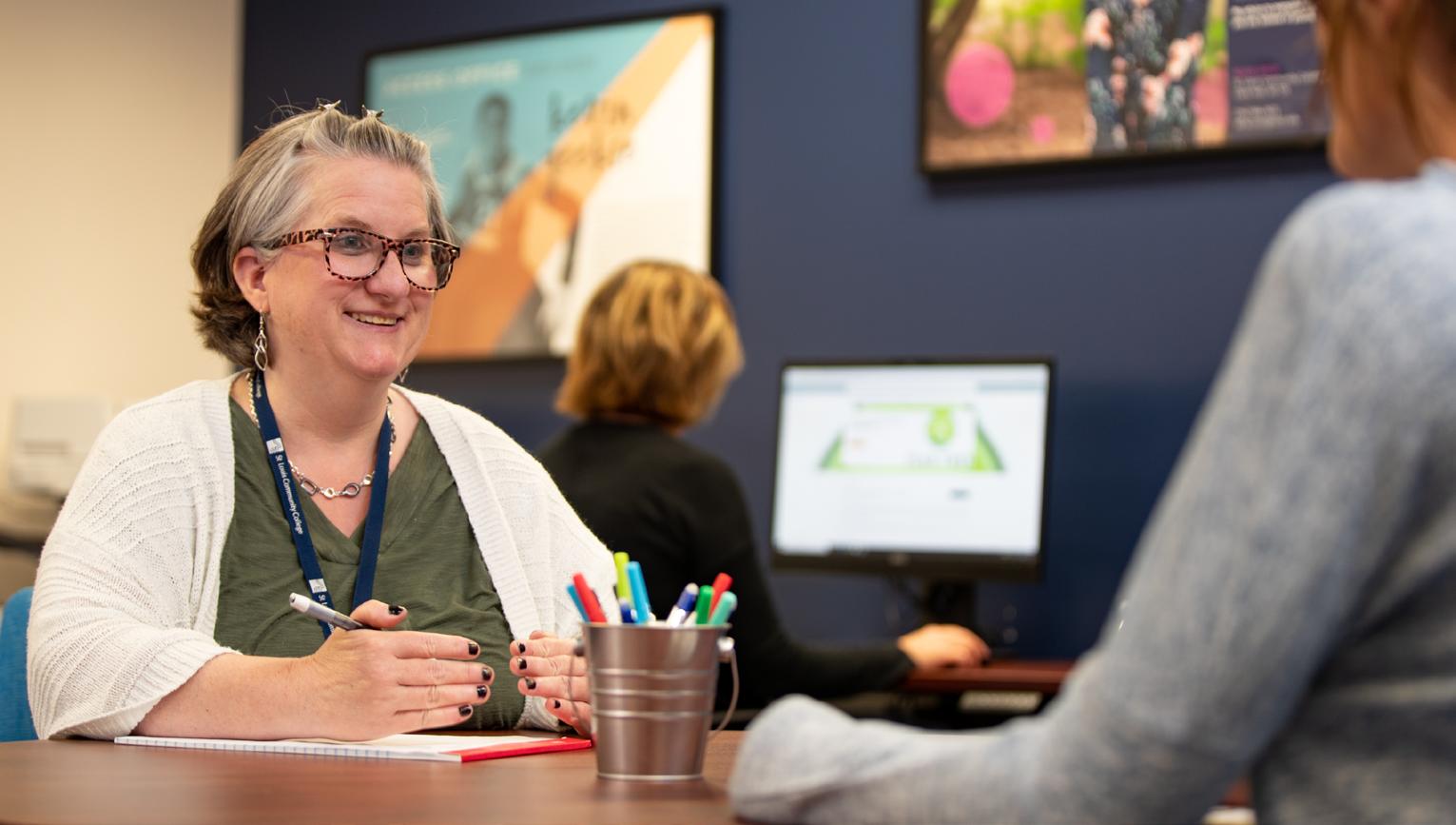
everything from using the Canvas learning management system to self-advocacy and goal planning. The program now features paid mentors who serve caseloads of 12-15 students as well as peer allies who provide additional support to 2-3 students.
Students have the option to meet weekly. During the meetings, they and their allies work on many topics, including self-advocacy, time management and organization. Improved retention rates and GPA scores demonstrate the program’s success; testimonials from the mentees further validate its positive impact. One student in the program now serves as a mentor, sharing what she has learned with peers.
51
“As a mentor, I get to pay it forward and share the strategies I have learned. I also learn about strategies that work for students who think and learn differently than I do.”
— ACCESS ALLY PARTICIPANT AND MENTOR
“As a mentee, I’ve been able to work on getting organized. Having an ally keeps me on track. Every week we go through my classes and all my assignments.”
— ACCESS ALLY PARTICIPANT




Archer Athletics
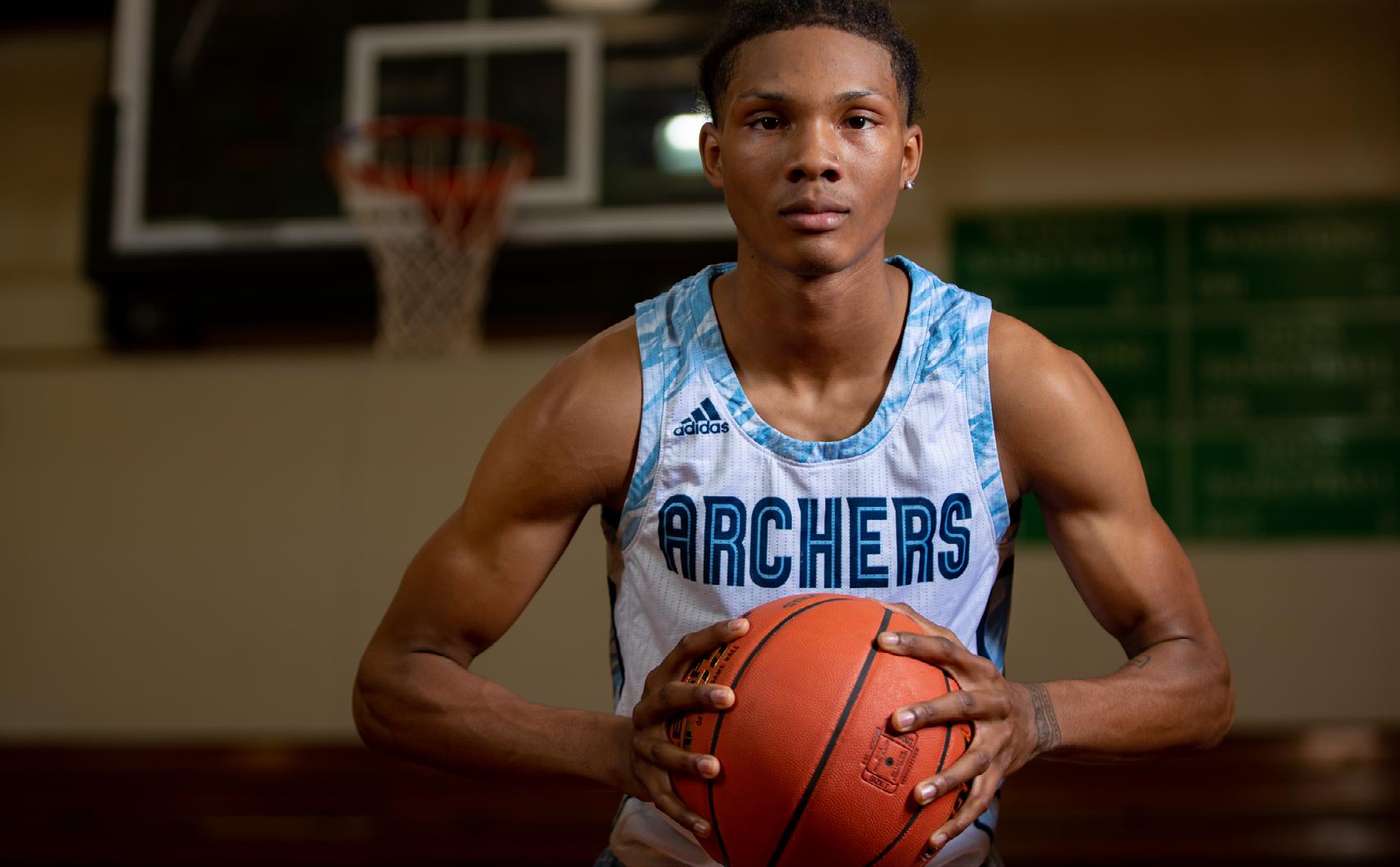
EXPANDING MINDS AND CHANGING LIVES FOR STUDENT-ATHLETES
St. Louis Community College currently supports seven athletic teams: baseball, softball, volleyball, women’s soccer, men’s soccer, women’s basketball and men’s basketball. The mission of the athletics department is to provide a competitive athletic program that empowers students in the classroom for lifelong learning, expands their minds and changes their lives. The College encourages student-athletes to improve their skills through hard work, sportsmanship and fair play.
STLCC has built numerous resources for student-athletes to utilize while attending the College. For instance, the athletics department utilizes a student success coordinator to work directly with student-athletes, providing them with a direct and easily accessible resource.
In addition to matching with the College’s student success staff, the student-athletes also cultivate personal connections within other departments at the College. These departments work closely together to ensure student-athletes are on the path to graduation.
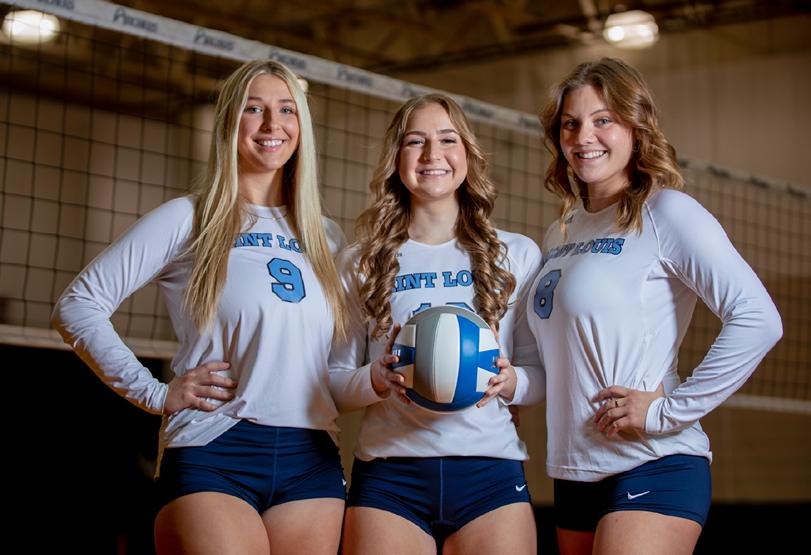
The athletics department has also streamlined reporting and communication by implementing online academic progress reports.
St. Louis Community College embraces the diversity of student-athletes by fostering a respectful culture that utilizes and celebrates those differences to achieve the same goal. They model the department’s mission through volunteering within the community to gain a sense of purpose and understand the importance of community involvement, as well as learning and changing lives.
53
Student Clubs and Organizations
A CLUB OR ORGANIZATION FOR ALL STUDENT INTERESTS
St. Louis Community College offers nearly 90 student clubs and organizations, providing opportunities to explore a wide variety of special interests. These clubs and organizations allow students to connect through cultural offerings, competitions, volunteerism, educational workshops, artistic expression, social interactions and community engagement. While in-person programming is prioritized, the Covid-19 pandemic proved that events, meetings and communication are possible through Zoom, Microsoft Teams, GroupMe and Canvas.
Student leadership opportunities have risen due to the reimagining of the Student Government Association, Campus Activities Board (CAB) and the Student Activities Budget Committee. These committees offer shared student governance, leadership development and cohesive support for student engagement.
Additionally, the campus life office expanded the Student Organization Summit (club leader training) to include in-person meetings, virtual meetings and digital recordings of pertinent information.
CAB is a student-led, staff-advised group that believes in being by the students, for the students. CAB works with the Office of Campus Life to create an open and welcoming environment and is committed to hosting free events that contribute to each student’s individual experience.

CAB members envision the group as responsive to student interests, with a goal of encouraging campus community and unity at STLCC campuses through exciting, relevant, diverse, engaging and entertaining events that are in support of the educational mission of the College.

54
Launch of Bachelor’s Program in Respiratory Care
EXPANDING RESPIRATORY THERAPY OPPORTUNITIES FOR LOCAL STUDENTS
St. Louis Community College is meeting the needs of the region by becoming one of the first community colleges in the state to offer a bachelor’s degree program. The demand for health care providers now and in the coming decades has been well documented, and the new Bachelor of Science in Respiratory Care will help fill a significant training gap in the market.
According to recent projections, the St. Louis metropolitan region will need more than 700 respiratory therapists over the next seven years. While STLCC’s existing program will meet some of that demand, professional organizations such as the American Association for Respiratory Care recommend a bachelor’s degree as an entry-level requirement for all new respiratory therapists by at least 2030.
In the St. Louis region, this transformation is already taking place; in a sample of job postings for respiratory therapists, 24% require a bachelor’s degree. With only eight bachelor’s degrees awarded for respiratory therapists in the region in 2019, health care organizations will be challenged to find local employees who fulfill that requirement.

STLCC is stepping up to meet this regional need and expanding the opportunities for local students to enter the field with a bachelor’s degree. This new program will be housed in new, state-of-the-art health sciences facilities on multiple STLCC campuses and is expected to enroll its first students in the fall of 2024.


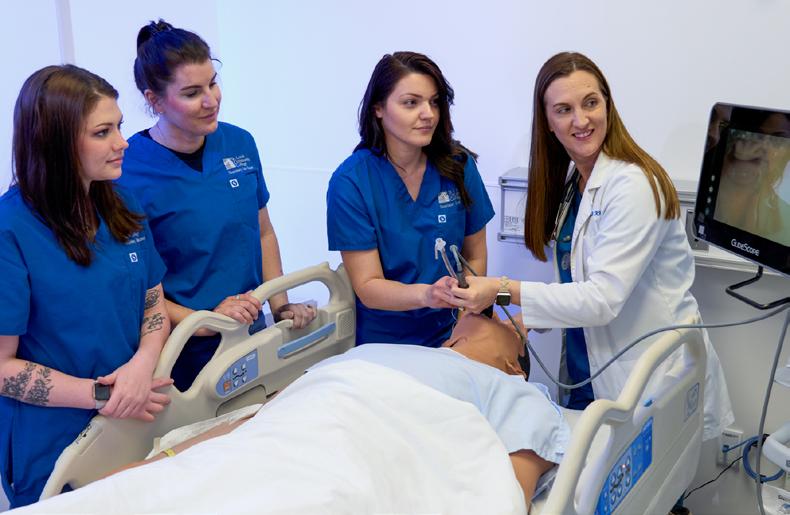
55
THE COMMUNITY’S WORKFORCE TRANSFORMING
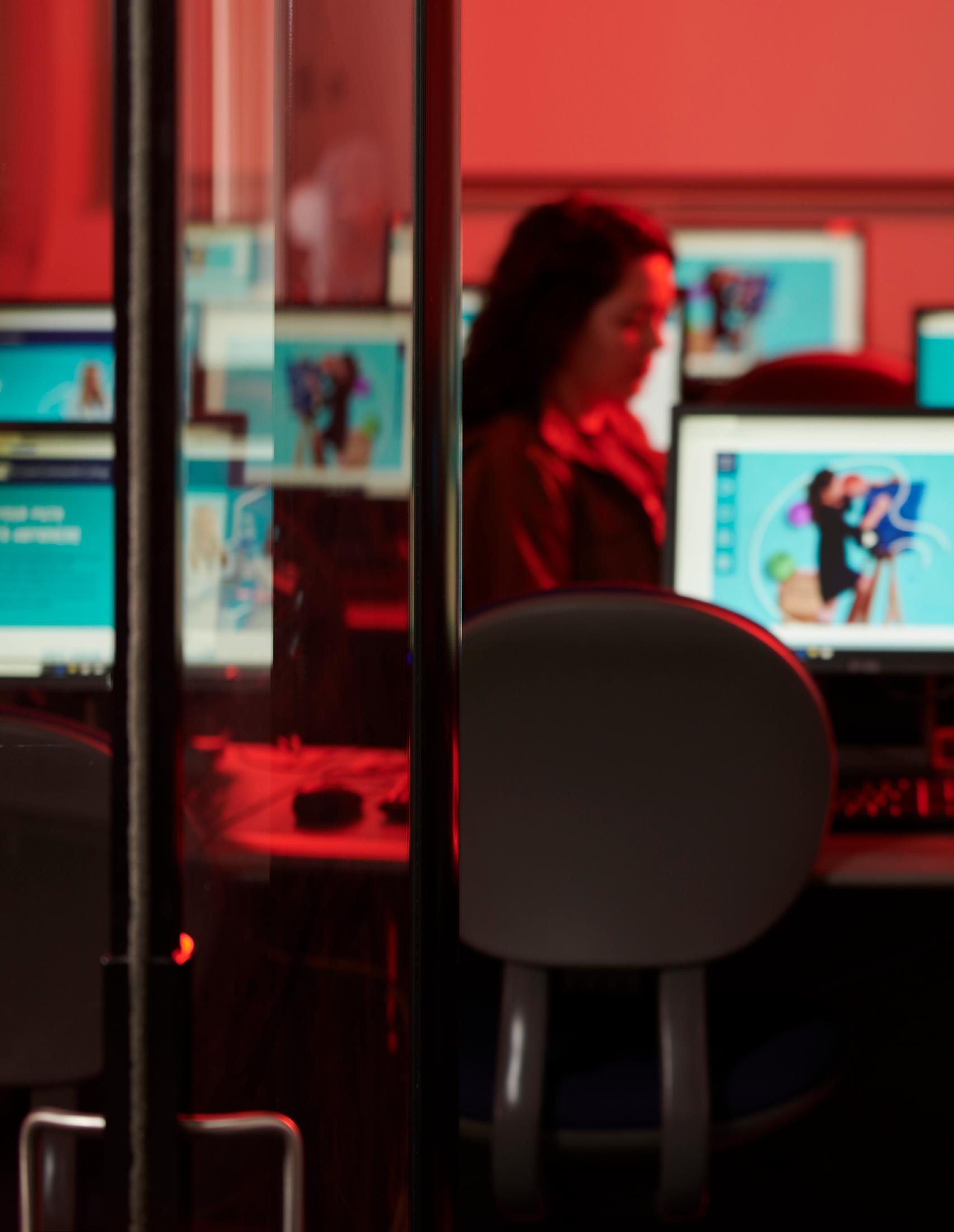
St. Louis Community College is proud of its longtime success securing a wide variety of grants and partnerships that support innovative programs and the region’s growing workforce development demands.
STLCC partners with area high schools, Fortune 500 corporations and key government entities in providing opportunities for early introduction to emerging careers as well as establishing and coordinating internships, apprenticeships and “earn as you learn” training programs.
Through its Workforce Solutions Group, STLCC offers several accelerated noncredit training programs that can range from one to 24 weeks. The programs are mostly grant funded or offered at no or low cost to students. Accelerated training programs offered include advanced manufacturing, biotechnology, culinary arts, industrial technology and trades, health care and technology training (for example, coding and digital marketing).
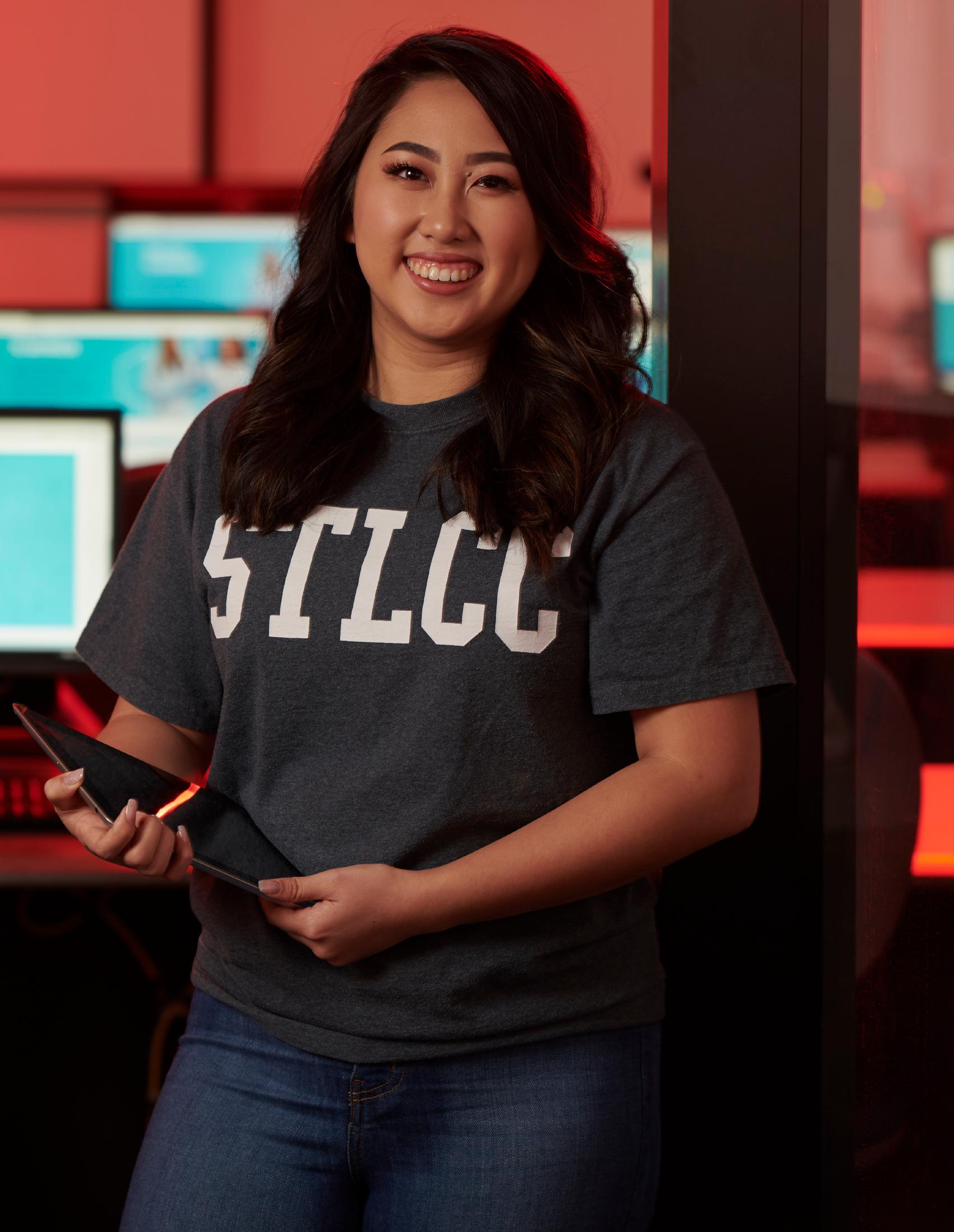
Boeing Pre-Employment Training Program
NO-COST PROGRAM FAST TRACKS STUDENT EMPLOYMENT
The St. Louis area is home to Boeing’s military defense unit, which relies on the Workforce Solutions Group to meet its demand for highly trained and qualified aircraft assembly mechanics. Boeing employs nearly 16,000-area workers making the F-15, F/A-18 fighter jets, the T-7A trainer and the MQ-25 refueling drone. The company is expanding its footprint in the region with an assembly line for MQ-25 drones at MidAmerica Airport, along with a specialized lab, a test facility and an advanced coatings center.
Through the College’s unique partnership with Boeing, students can choose one of two career paths: sheet metal assembler/riveter (SMAR) or composites technology. Because the College hires Boeing retirees with specialized experience in the aerospace manufacturing industry, students are guaranteed high-quality instruction regardless of the path they select.
Second semester high school seniors and high school graduates are eligible for the program, which doesn’t end once they learn the trade. Graduates are guaranteed an interview, but not promised a job with Boeing, so the College teaches them soft skills such as how to apply to and interview with the company.
Students incur no out-of-pocket expenses because Boeing covers all costs. Plus, students receiving unemployment benefits can continue to do so while training since the program is approved by Missouri’s Department of Elementary and Secondary Education.
To make the program inclusive to women and high school students, Boeing and the College created two programs. The Women in Aerospace Manufacturing program promotes access to women into the field. The Second Semester High School Senior program allows high school students to simultaneously attend the training program and high school with the potential of a job offer after graduation.
The success of the program is winning accolades – and jobs. The Boeing/STLCC program was named a finalist for the prestigious Bellwether Award. In 2022, Boeing St. Louis and the College celebrated the 1,000th job placement of the program. Since its inception, 1,321 individuals have graduated from the program and Boeing has hired 1,082 of the program’s graduates.
58 League for Innovation SELF-STUDY 2023 STLCC



59
Health Care Training Partnerships
HOSPITAL PARTNERSHIPS CREATE HIGH-DEMAND JOBS

St. Louis is a hub for health care, with two prestigious academic medical centers and an array of community hospitals. Because patients travel to St. Louis from a 250mile radius for advanced care, the number of hospital beds outpaces the number of health care workers needed to treat them. Creating a pipeline of employees is critical not only for patients, but also to fuel the economic benefits health care provides to the region.
To solve this problem, St. Louis Community College has created partnerships and clinical affiliations with health care systems to jump start the entry into health careers.
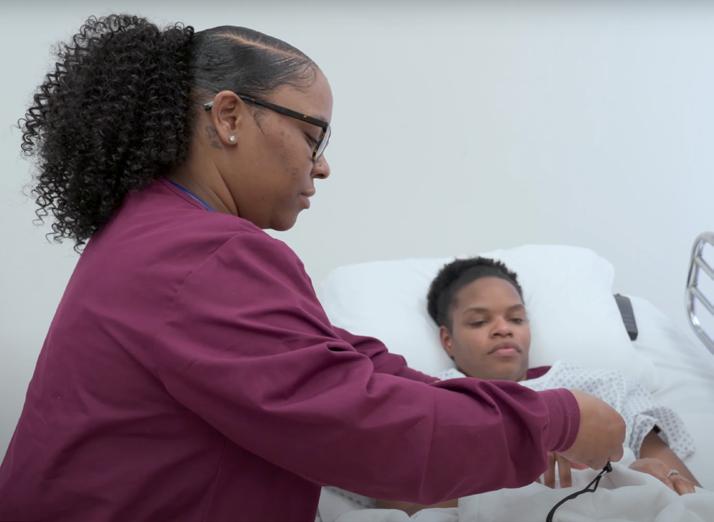
BJC HealthCare’s Institute for Learning Development has partnered with the College since April 2019 to provide students with training in patient care technician (PCT), medical assistant (MA), central sterile processing technician (CSPD) and surgical tech opportunities. BJC encourages employees in ancillary positions such as housekeeping, security and dietary services to upskill into higher-paying, and much-needed patient care positions.
For many individuals interested in transitioning to a health care career, leaving a job while learning the skills necessary can be a daunting barrier. This partnership alleviates a student’s need to choose immediate income over training. Students in the program have an opportunity to earn while they learn and, upon satisfactory completion, continue PCT, MA CPSD or surgical tech employment with BJC.
During the first year, the program enrolled 76 students across five cohorts.
The College also partnered with SSM Health DePaul Hospital to create a new pilot program encouraging high school students to pursue careers in nursing and health sciences. Students will complete certified nursing assistant (CNA) training while in high school and prepare for entry into the nursing or health science programs at STLCC. DePaul Hospital will offer select student scholarships and support as students complete their education at STLCC.
60 League for Innovation SELF-STUDY 2023 STLCC
Cybersecurity Career Expo
CYBERSECURITY COLLABORATION ENGAGES STUDENTS UNDERREPRESENTED IN A KEY 21ST CENTURY FIELD
STLCC recently joined the Gateway Higher Education Cybersecurity Consortium, and through its association with the Global Center for Cybersecurity, is collaborating with local school districts and employers to introduce high school students to cybersecurity careers.
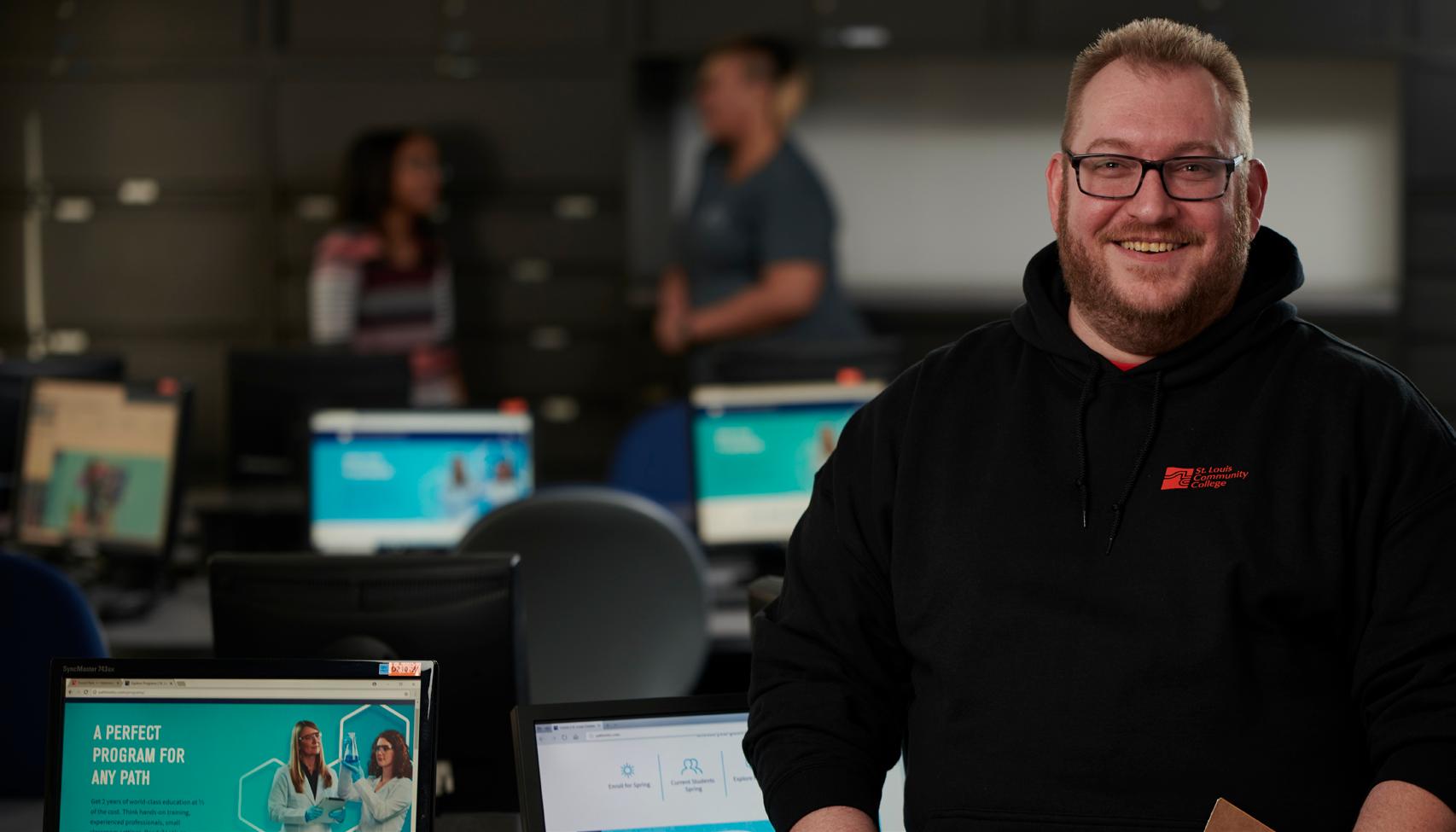
In December 2022, STLCC hosted a Cybersecurity Career Expo for approximately 100 high school seniors who attend high schools in communities traditionally underrepresented in the cybersecurity field.
The expo introduced students to basic principles of cybersecurity and the vast diversity of cybersecurity
careers while providing an immersive experience in realworld scenarios that cybersecurity professionals face through a “Capture the Flag” game.
The game allows student teams to compete through a complex set of challenges that teach analytical thinking skills, teamwork and creativity under the guidance and mentoring of local security industry professionals.
Students also learned about STLCC’s cybersecurity degree program and scholarships that put education within reach; they also took advantage of the opportunity to network with employers and other educators.
61
Project Lead the Way Engineering Challenge
EVENT CHALLENGES HIGH SCHOOLERS TO BUILD VEHICLE FOR THE ROAD TO SUCCESS
St. Louis Community College partnered with Project Lead the Way to host an engineering challenge for more than 160 students from 21 area high schools. The Florissant Valley campus hosts the annual Greater St. Louis Project Lead the Way competition that challenges students to design and build a solution to an engineering problem during the morning session and demonstrate their solutions during the afternoon.
The 2023 event’s challenge theme was Windy 500. Teams of five students created a vehicle with at least two wheels that would be propelled down two different courses by fans. Students had less than three hours to design, document, test, build, retest and rebuild their vehicles — all without the use of technology.
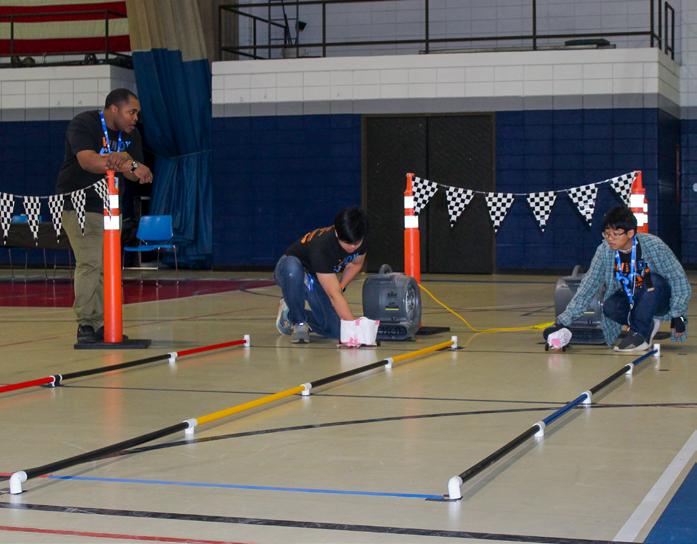
Industry mentors guided the teams to develop workable solutions to navigate the course and then put their work to the test in a double-elimination race. The judges evaluated the teams in three categories: overall, teamwork and presentation.

While these students worked on the brainteaser, an additional 50 students toured the College’s Center for Workforce Innovation and the Engineering building on the Florissant Valley campus, engaging in hands-on activities in the Boeing preemployment lab, welding shop, industrial maintenance lab, 3D printing lab, precision machining shop and the electronics and robotics labs.
The College will continue to host Project Lead the Way events annually, with hope that this partnership will help lay the groundwork for students interested in STEM.
62
EMBARK Dual Credit Life Science Program
EMBARK PROGRAM PLANTS SEEDS FOR STUDENT SUCCESS
St. Louis has grown to become an international leader in bioscience and biotechnology. From highly regarded research institutions to a dynamic start-up community to financially supportive corporations, the region is now one of the top national locations dedicated to driving innovation. The next generation of innovators in the field will get their start with St. Louis Community College while they’re still in high school.
The EMBARK Program is a dual credit/enrollment program created by St. Louis Community College and the Donald Danforth Plant Science Center, preparing high school students to earn a Life Science Lab Assistant (LSLA) certificate by high school graduation. Students in the program complete five courses, including Introductory Biology I, Intro to Life Science Lab Skills and Basic Lab Methods in Biotechnology.
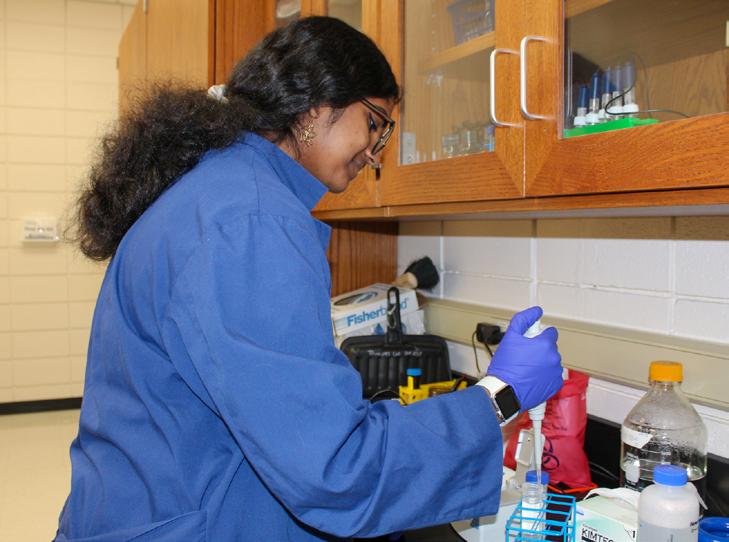
After completing this hands-on program, EMBARK students can choose from numerous options available as they are prepared to enter the workforce in bioscience laboratories or compete for internships and well-positioned to continue their research and studies and earn bioscience and biotechnology associate and bachelor’s degrees. Demand for these skills is so high that students can earn up to $23 an hour working as biotechnology lab technicians before they graduate from college.
The EMBARK Program is unique and innovative in allowing students to earn workforce credentials while still in high school. Offering more than courses, it is an immersive experience that transforms students’ lives.

63
Drone Pilot Program Takes Off NEW STEM PROGRAM TAKING FLIGHT
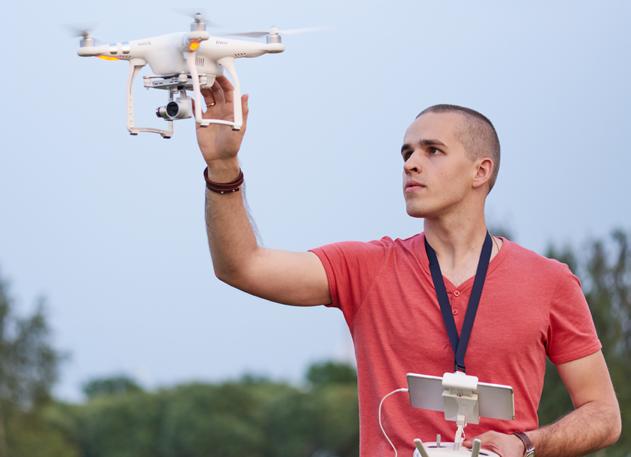
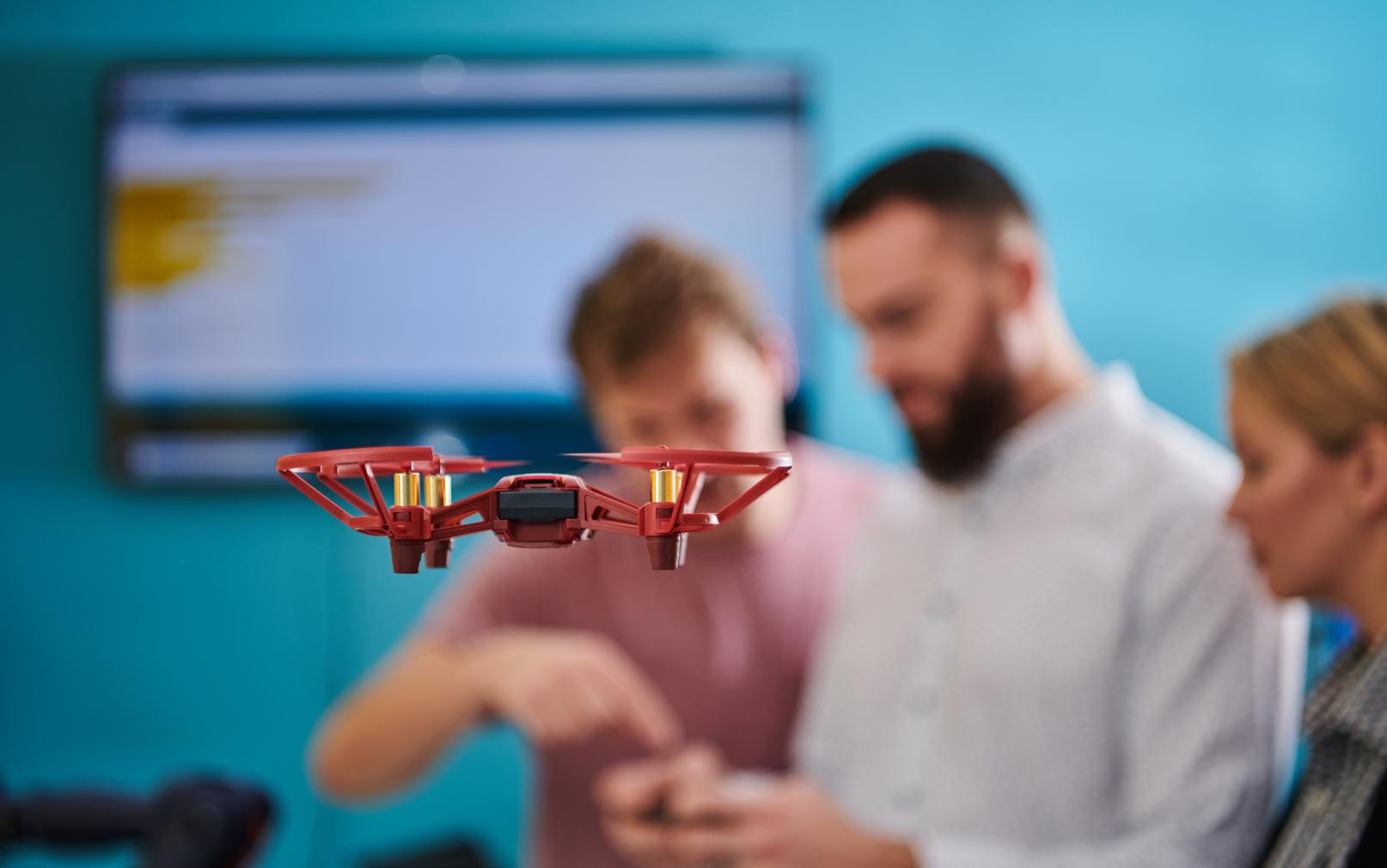
With construction underway for the new headquarters for the National Geospatial Intelligence Agency (NGA), St. Louis is poised to become a national leader in Geospatial Information Systems (GIS). With that, the demand for drone service employees and geospatial information systems specialists is expected to grow by 51% and 35% respectively in the St. Louis region.
In response to this need, coursework is under development to prepare students for careers in the booming GIS field. In the spring of 2024, the College plans to offer three new GIS courses. Among these, one aims to prepare students to become a certified drone pilot through the Federal Aviation Administration (FAA). As part of this, investment is underway to create specialized netting structures at the Florissant Valley and Wildwood campuses to provide students with hands-on drone pilot training. Along with meeting workforce demands, the College is committed to providing affordable and accessible education to students, including to women and African American males, as they are historically underrepresented in STEM fields.
A geospatial mapping course and a surveyor technician course, both of which will include classroom and field training using state-of-the-art equipment is also being created. Ultimately, the College aspires to connect these courses to a certificate program so students can gain the skills needed to meet an emerging demand in the local labor market.
64 League for Innovation SELF-STUDY 2023 STLCC
EPA Grant to Train Hazardous Materials Technicians

ACCELERATED JOB TRAINING FOR HIGH-WAGE HAZMAT CAREERS
With the support of nearly $2 million in grants from the Environmental Protection Agency, the College’s Workforce Solutions Group offers accelerated training programs that teach the proper handling of toxic and/or hazardous waste. Students earn several necessary licenses and certifications for both Missouri and Illinois through the program.
The Environmental Remediation Technician program is offered in partnership with the Center for Environmental Education and Training at Saint Louis University’s College of Public Health and Social Justice. The program prepares students with the knowledge and skills necessary to safely work with the abatement and remediation of asbestos, lead and other hazardous materials. The hazardous materials technician with Class B CDL truck driving training teaches students to assess, clean up and safely transport contaminated properties and hazardous materials.
65
Biomanufacturing Research and Technician Training (BRaTT) Partnership
BRATT PARTNERSHIP BOOSTS ST. LOUIS’ BIOTECH INDUSTRY WORKFORCE
Biomanufacturing Research and Technician Training is a five-day/one-week customized course for new employees in the biotechnology industry. The program, which offers a detailed overview of the entire biomanufacturing process, was chosen as the College’s Innovation of the Year for 2023.
Through BRaTT, St. Louis Community College and the Center for Life Sciences provide workplace-relevant learning experiences to the region’s next generation of innovators and technicians.
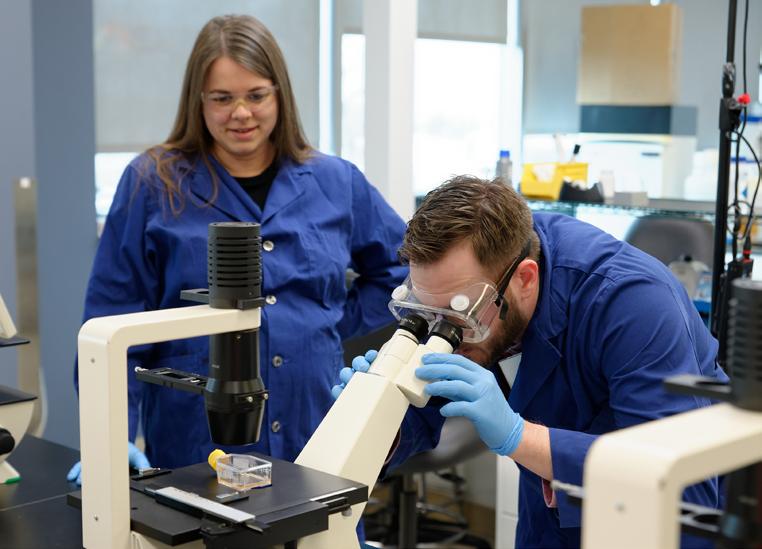
BRaTT trained approximately 150 students in 2022 and continues as a once-monthly offering to incoming Thermo Fisher employees. Initially developed in response to employee shortages during the pandemic, the College aims to expand BRaTT to provide customized training offerings for other companies.
Students participated in laboratory experiments to gain basic lab skills, professional documentation practices and aseptic technique. Topics covered include bioprocessing, upstream and downstream handling, cell maintenance and passaging, filtration and separation techniques, analytical techniques and quality methods for sampling and testing.
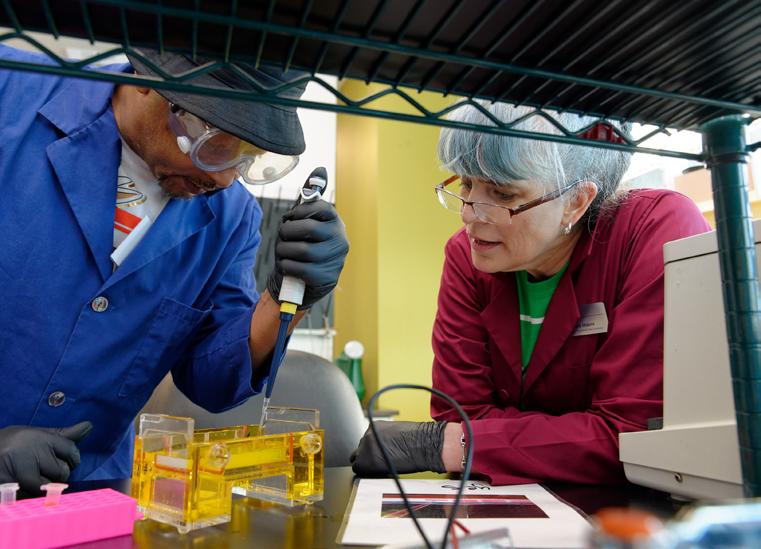
By the end of BRaTT week, students gain confidence working on laboratory and production floors. The program’s pre- and post-self-assessments indicate a gain in confidence levels of 1.5-3 points for incoming employees and a 1-2-point gain in long-term employees.
Providing a common starting point for new technicians and helping to ensure the success of employer-provided training, BRaTT is an important addition to a company’s on-the-job training program.
66 League for Innovation SELF-STUDY 2023 STLCC
Progress Attained through College Education (PACE)
St. Louis County, like many communities around the nation, is seeing the impact of backlogs in the justice system. Due to these delays, incarcerated individuals are spending more time in local jails than normal.
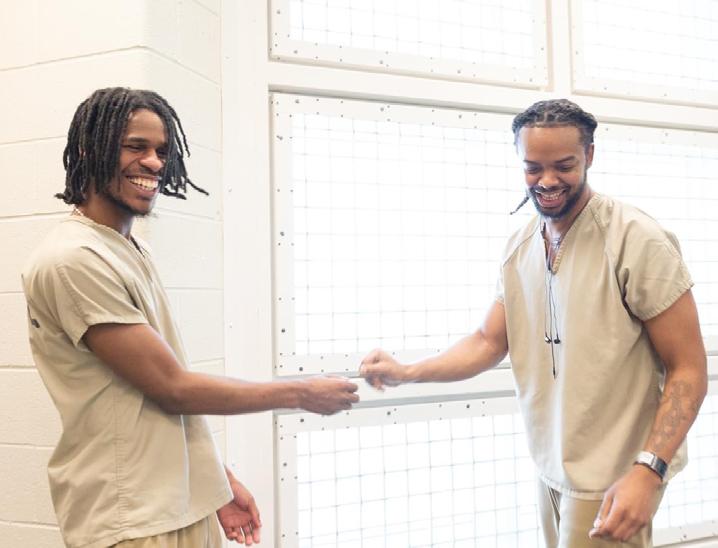
St. Louis Community College developed an innovative program to turn this issue into an opportunity, empowering those currently being held with St. Louis County Justice Services by helping them pursue academic goals.
The Progress Attained through College Education (PACE) program delivers college-level education programs to St. Louis County Justice Services. While many jails only have workforce training or other non-college educational options, STLCC offers creditbearing courses that can help transform the future for these students.
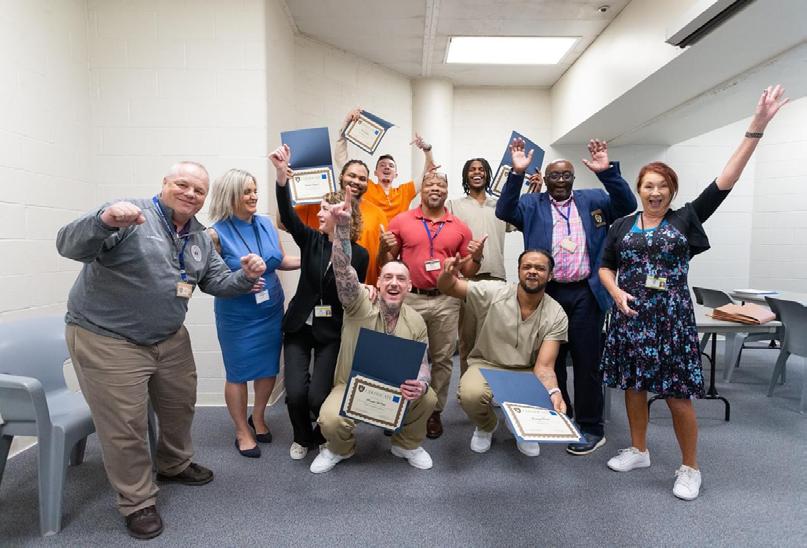
Faculty from STLCC go to the jail, in-person, to deliver coursework. St. Louis County Justice Services provides students with the materials and resources they need to succeed in these courses. Students in PACE will not earn a full degree, but they can earn up to 24 credit hours, depending on the length of their time in the Justice Services building.
The first cohort began in January 2023, with the group completing 12 credit hours during the spring semester. A second cohort began in March, completing its first six credit hours. With an average GPA of 3.75 in the first cohort and 4.0 in the second, the results speak for themselves.
PACE is an effort to reduce recidivism by providing a pathway to create a more successful future through college education.
67
STLCC AND ST. LOUIS COUNTY JUSTICE SERVICES CREATE LIFE-CHANGING PARTNERSHIP
PROCESSES TRANSFORMING
 INTERIOR RENDERING, ADVANCED MANUFACTURING CENTERFLORISSANT VALLEY
INTERIOR RENDERING, ADVANCED MANUFACTURING CENTERFLORISSANT VALLEY
PROCESSES & FACILITIES TRANSFORMING
STLCC Transformed
After six decades dedicated to the education of the St. Louis region, many St. Louis Community College buildings cannot keep up with today’s training and technological needs. With the support of the St. Louis community, the College is now on a path to modernize facilities and programming to improve the overall student experience and meet workforce demands in Missouri.
The Center for Nursing and Health Sciences (CNHS) located on the Forest Park campus was STLCC’s first construction project in more than a decade. This state-of-the-art building welcomed 900 students in the fall of 2019 to meet the area’s need for nurses and health care professionals.
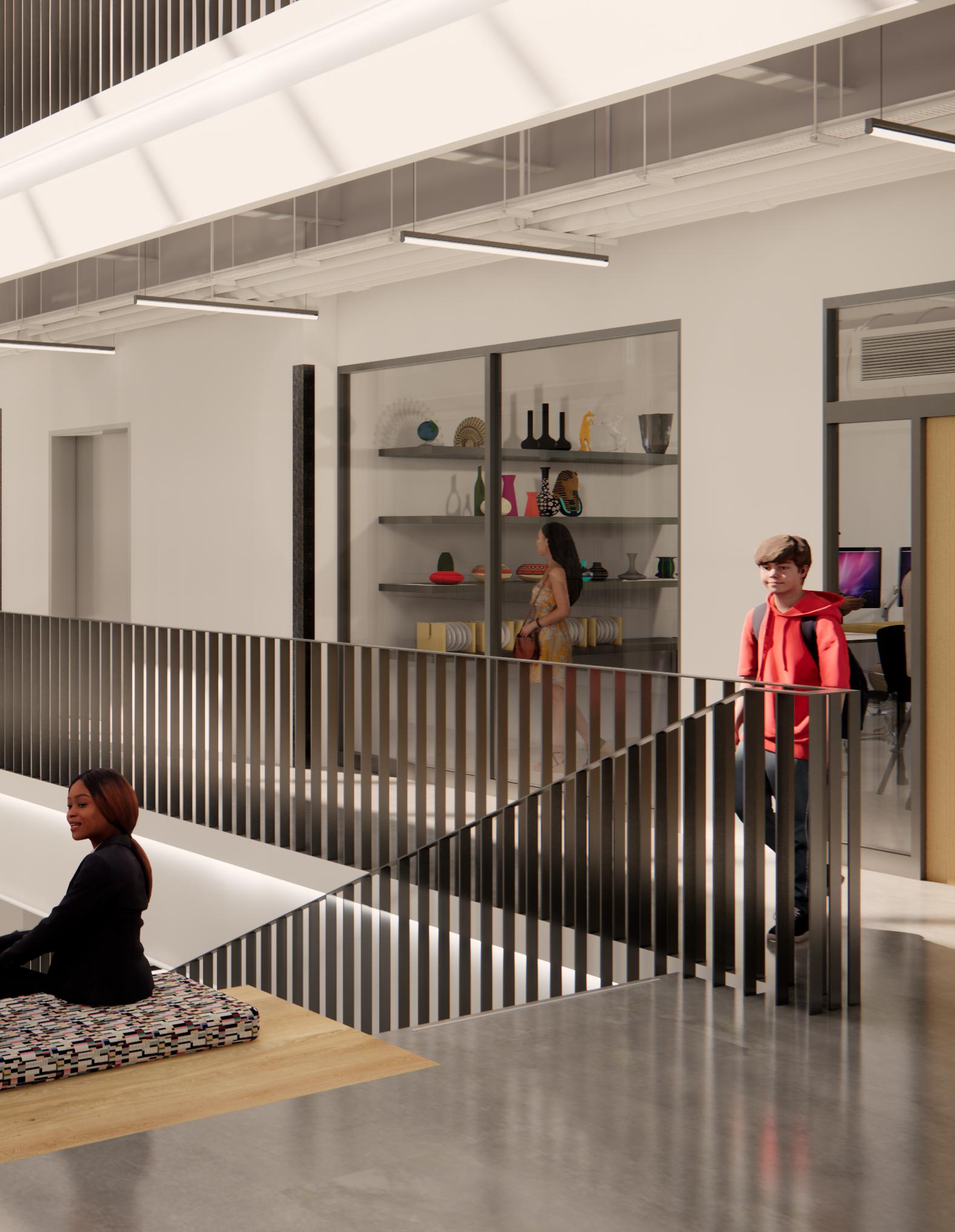
The opening of the CNHS has eliminated the nursing program’s once-multiyear waitlist and now students can enroll with no wait after prerequisites are met. The College continues to move toward its goal to increase enrollment capacity by 75%, and graduates consistently achieve 93-94% pass rates on National Council Licensure Examinations.
The success of this facility encouraged the College to move forward with Proposition R in 2021, a tax initiative to revitalize the College’s dated buildings and career training programs to support local job growth and meet the needs of STLCC students and the surrounding communities. The proposed tax rate increase, the first in nearly 40 years, passed thanks to the citizens of the St. Louis region.
Now known as STLCC Transformed, this $450 million project brings the planning, development and construction of six new buildings to the College’s four main campuses. Career training programs in critical industries like health care, information technology, financial services and manufacturing will be updated and renovations will repurpose underutilized spaces on each campus. STLCC Transformed is expected to reach completion in 2026.
St. Louis Community College is committed to continuous improvement and revitalizing the processes and facilities that support the students we serve.
Wildwood
On May 25, 2023, St. Louis Community College broke ground on the Center for Health Sciences and Technology at STLCC-Wildwood. Building partners, state officials, community leaders and members of the public joined College officials to kick off the first major STLCC Transformed construction project.
The 132,900-square-foot building, designed by Christner Architects to look like two, will offer expanded capacity for STLCC’s nursing program, plus advanced imaging, physical therapy and paramedic technology programs. Additional programs joining Wildwood’s offerings will include drone technology and geospatial information systems.
These new tech pathways will bring an outdoor lab with a netted enclosure for in-depth, hands-on learning. Other features include an ambulance simulator, MRI simulation lab, medical imaging lab and a dedicated nursing area with classrooms, simulations labs and control rooms.
Wildwood’s new facility will also house student services, study rooms and a resource center with a food pantry and clothing closet. Dedicated areas like collaboration spaces and the student lounge will offer students an authentic college quad experience as they eat, study and mingle. After construction is targeted to be complete in the fall of 2025, the campus will have more than 210,000 square feet of learning space.
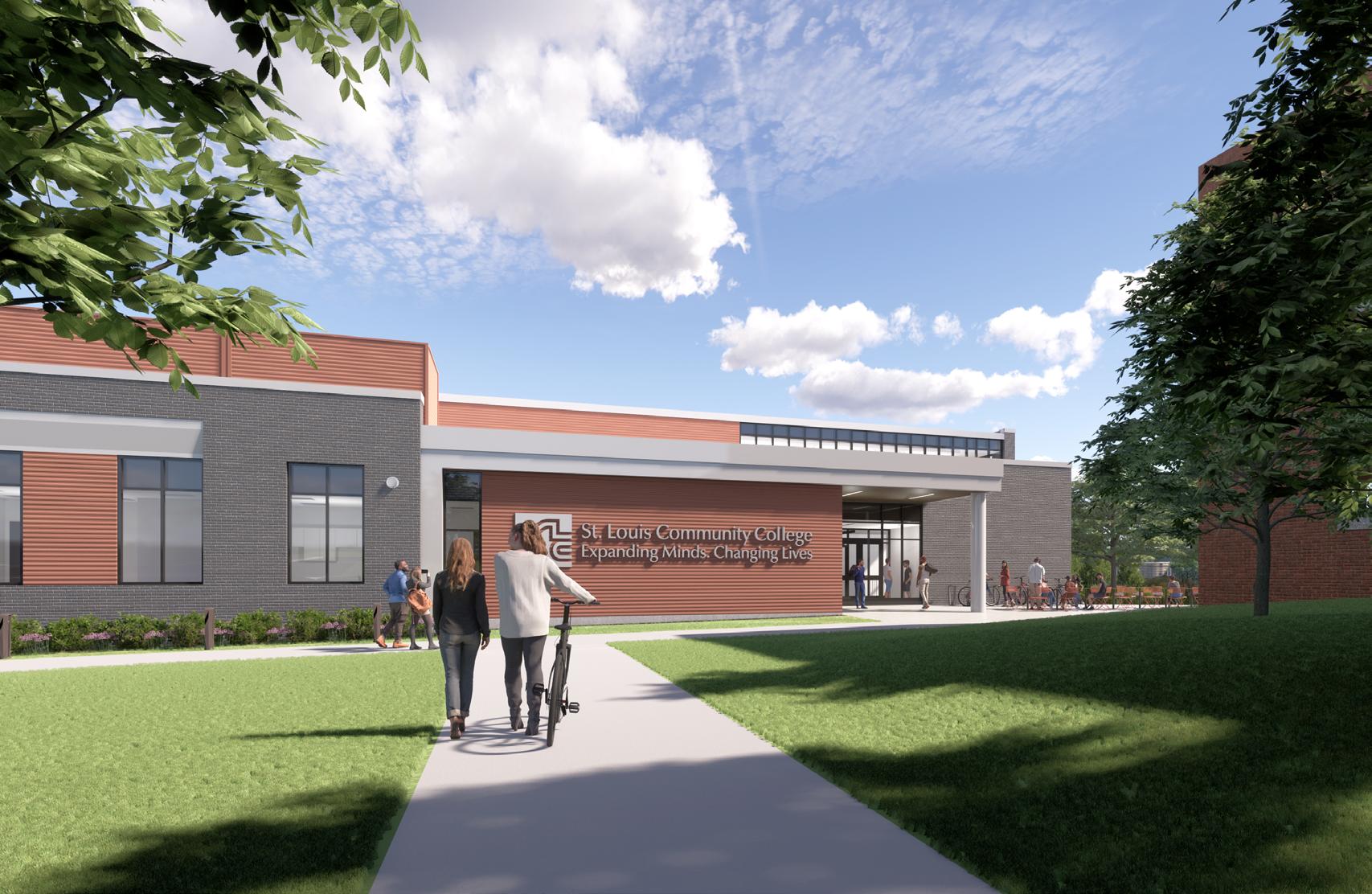
TRANSPORTATION CENTERFOREST PARK
Forest Park
A $48 million Transportation Center will be the first STLCC Transformed project, bringing the automotive technology, diesel technology and CDL-A truck driving programs together for the first time under one roof. Designed by FGM Architects, the building will offer 79,000 square feet of learning and potential event space with an approximately 36,000-square-foot fleet parking lot and a 193,000-squarefoot truck driving lot.
This modern, inviting facility will connect interior and exterior spaces, provide gathering areas to encourage collaboration and offer an easy, accessible tour location for prospective students and the community. It will allow seamless integration of students in credit and non-credit courses working together while allowing the campus to welcome new certificate programs and more students within its spacious halls.
Major renovations to existing buildings, such as the Student Center and Hospitality Annex, will follow the Transportation Center’s target completion date in late 2024.
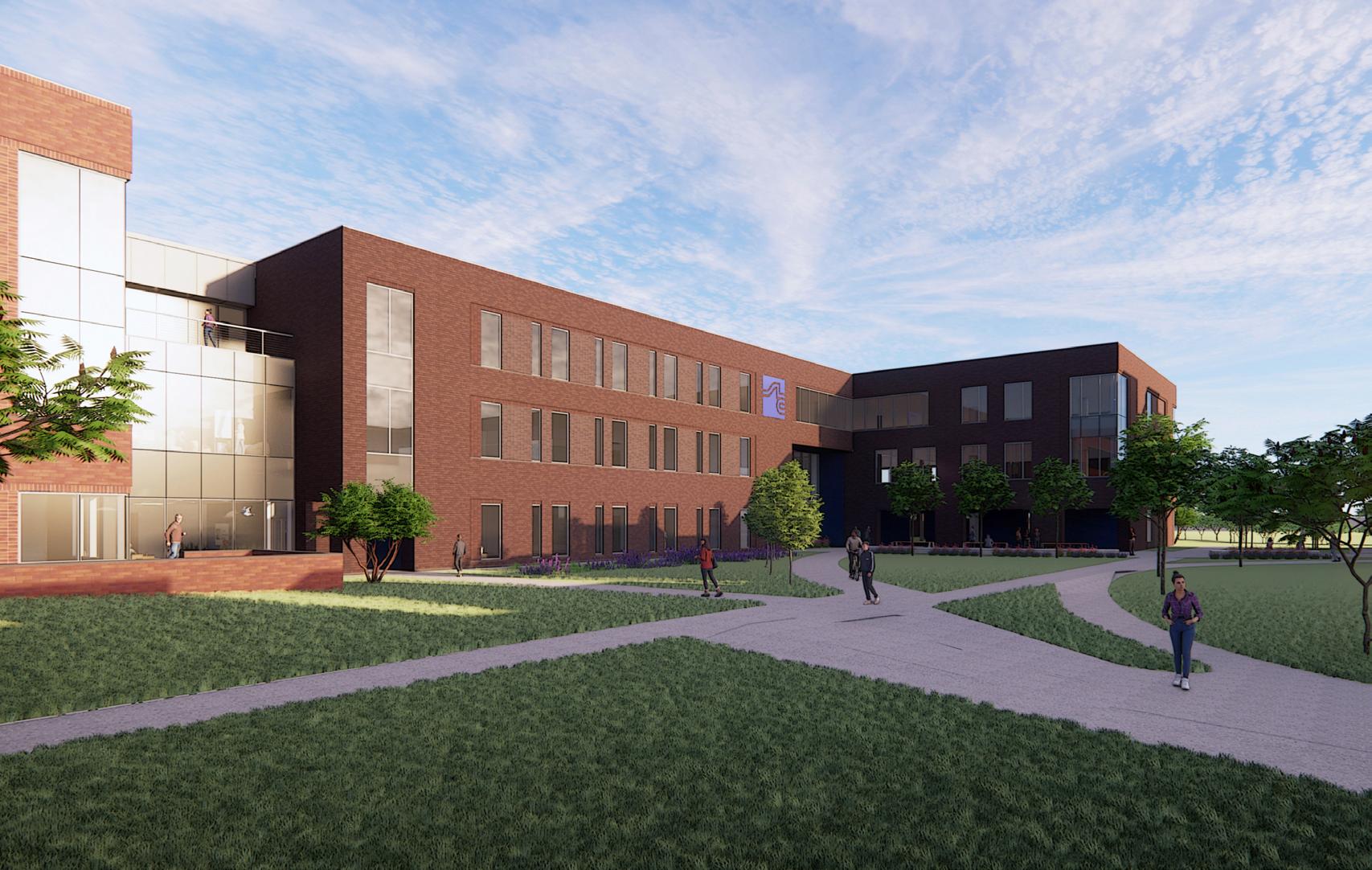
In May 2023, St. Louis Community College at Forest Park completed a 10,000-square-foot Child Development Laboratory Center (CDLC). While not funded by STLCC Transformed tax dollars and supported through state funds and allocated College capital, the CDLC was an important precursor to the coming campus transformation.
Located in the Physical Education building, this renovated space is modeled after the CDLC on the Florissant Valley campus, welcoming the children of students, faculty and staff, ages six weeks through six years. It will also serve as a teaching laboratory for students in the child and family development program.
71
CENTER FOR HEALTH SCIENCES AND TECHNOLOGY - WILDWOOD
Florissant Valley
St. Louis Community College at Florissant Valley will house a new Center for Nursing and Health Sciences and the Advanced Manufacturing Center by the time Transformed reaches completion.

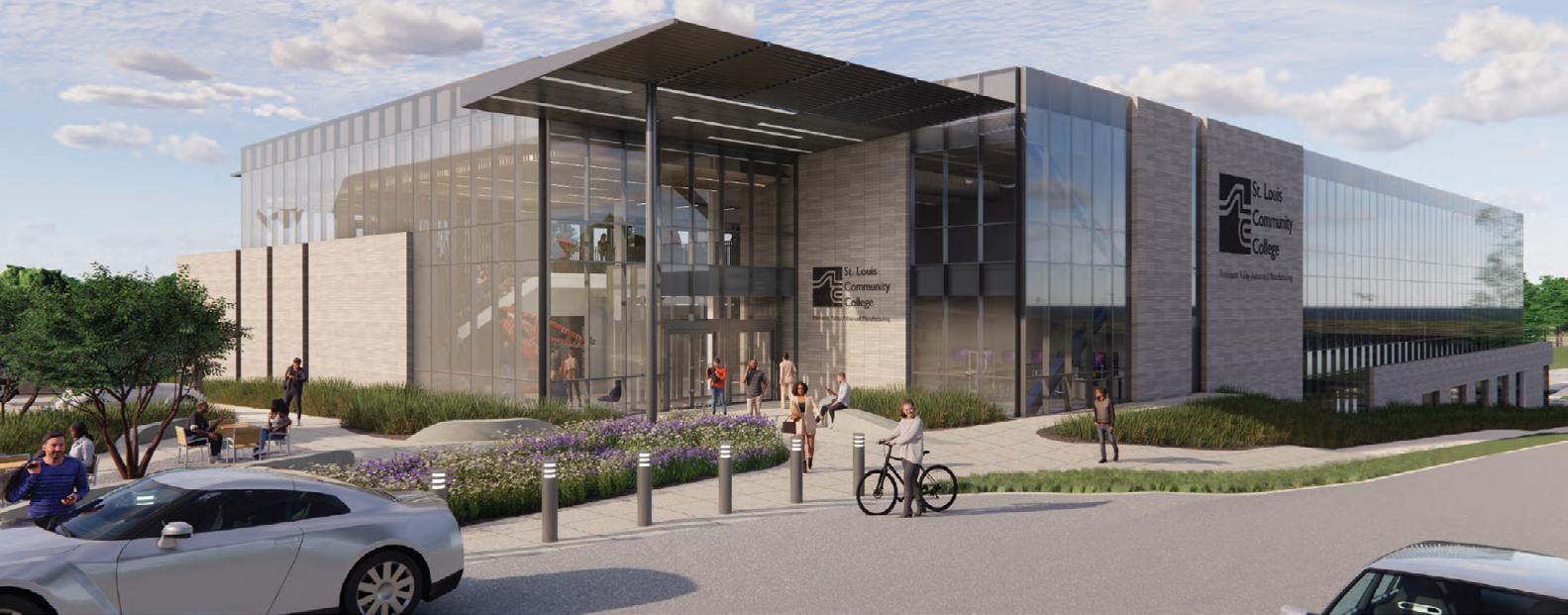
Designed by KAI, the 100,000-square-foot Center for Nursing and Health Sciences will serve as a welcoming front door to the campus. Building on the success of its counterpart at Forest Park, the center will relocate existing programs and welcome new ones, including nursing, dental hygiene, deaf communication studies, behavioral health support, and the College’s first-ever bachelor’s degree in respiratory care.
The Advanced Manufacturing Center will bring together engineering, career training and other technology-focused programs currently scattered across the campus. Students can earn degrees and certificates in high-demand fields, like
engineering technology, computer information technology, welding, Boeing composites or sheet metal assembly, computer-integrated manufacturing, precision machining technology, computer-aided design and biomedical electronics technology.
This 100,000-square-foot, highly visible facility, designed by JEMA, features various classrooms, labs, and lounging and flexible spaces that encourage modern learning and collaboration. It will easily accommodate the envisioned expansion of students to double the enrollment in most of its programs. The Advanced Manufacturing Center will also offer many opportunities for tours, exploration and events, plus a beautiful outdoor plaza to eat, study and relax between classes.
72 League for Innovation SELF-STUDY 2023 STLCC
CENTER FOR NURSING AND HEALTH SCIENCES - FLORISSANT VALLEY
ADVANCED MANUFACTURING CENTER - FLORISSANT VALLEY
Meramec
As the only campus with relocation and demolition requirements, changes at St. Louis Community College–Meramec will take place further into the STLCC Transformed project timeline. Its new Financial Services and Enrollment Center will serve as a one-stop-shop for student services, including financial aid, admissions and advising. Students will start their academic careers on the right foot with an improved enrollment process that’s smooth, concise and housed under one roof.
The Center for Emerging Technology will house the Meramec library, academic success, tutoring and areas of study like horticulture, sustainable science and information technology. It will feature an accessible roof for educational opportunities,

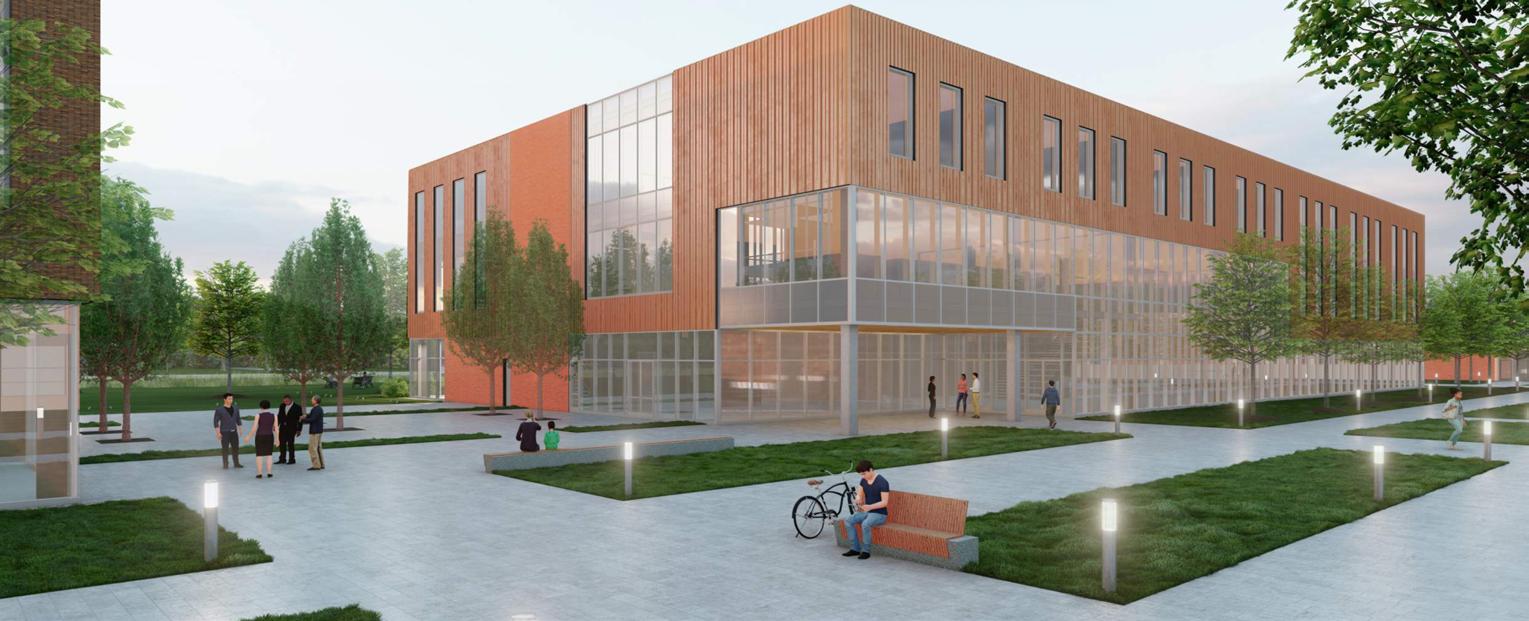
outdoor classrooms and an indoor grow room for the College’s new certificate of specialization in cannabis and hemp production expected to launch in the spring of 2024.
Arcturis led the design efforts at STLCC-Meramec, using the two 75,000-square-foot facilities to anchor a welcoming entryway to the campus. Both new buildings will be ecofriendly and qualified for LEED certification. Defined collaboration spaces and inviting green spaces surrounding the area will encourage students to study and hang out before, during and after class. Some of Meramec’s many unused parking lots will be returned to nature, condensing the number of blacktop surfaces and encouraging more exploration and wandering on campus.
73
CENTER FOR EMERGING TECHNOLOGY - MERAMEC
FINANCIAL SERVICES & ENROLLMENT CENTER - MERAMEC
Transformed Construction Barrier Artwork
As STLCC Transformed construction gets underway, artwork created by an STLCC-Meramec student will be the first thing the community will see.
Tonya Berry graduated in May 2023 with an associate in fine arts. She dreams of working in the design field one day and with the fence banners for STLCC Transformed under her belt, she’s well on her way to accomplishing that dream.
Her vision for the banners was to capture the College’s diverse programs and experiences to encourage others to pursue their educational goals at STLCC.

FLORISSANT VALLEY TRANSFORMED Center for Nursing and Health Sciences

Dedicated areas students to gather, study and hang out
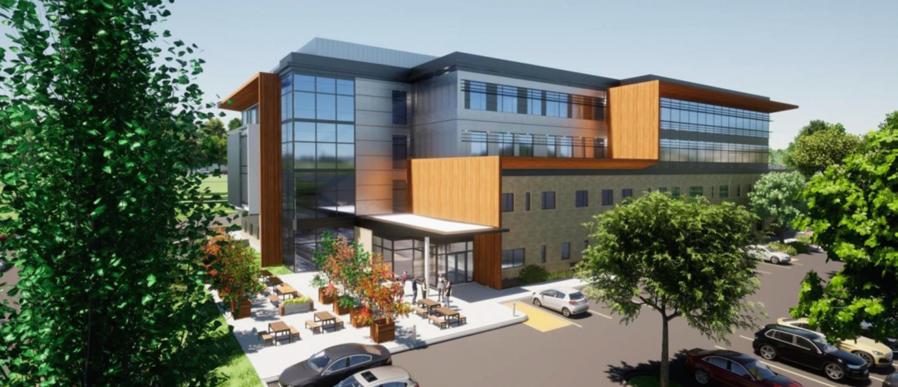
74 League for Innovation SELF-STUDY 2023 STLCC
New and expanded programs in high-demand fields
for gather, out
Course of Record (COR) Development
INSTITUTIONAL COMMITMENT DRIVES COURSE OF RECORD CREATION
To further the mission of empowering students, expanding minds and changing lives, faculty and staff are transforming the method of developing online courses through courses of record (CORs) that leverage a diverse set of perspectives to create a distinctly unique learning experience.
The COR development process embraces and thrives upon transparency and collaboration to create distinct learning experiences powered by an institutional commitment to excellence. It begins by assembling teams of discipline faculty, multimedia specialists and learning design experts who collaborate to develop course materials using the Quality Matters Rubric and principles of backwards design while ensuring all materials comply with ADA standards.
At designated milestones, project teams request feedback from all faculty in the discipline to incorporate a variety of perspectives, shared experiences and expertise. In addition to producing high-quality and robust course material, the feedback process benefits faculty, as reviewing materials that align with course development best practices can enhance their development of non-COR courses.
All CORs incorporate formative assessments, allowing students to attain mastery before taking summative assessments like final exams. As additional courses of record are developed, students will benefit from consistent structure across courses and the College’s commitment to high-quality learning experiences.
75 BARRIER
AND ILLUSTRATIONS
DESIGN
Tonya Berry Graphic Communications Student, STLCC-Meramec
“Having my artwork displayed means a lot to me. When my design was chosen and praised, it gave me a profound sense of accomplishment. I’m elated people can enjoy my design while simply commuting.”
– TANYA BERRY
Multiple Measures Placement Tool
INNOVATIVE MULTIPLE-MEASURES TOOL PUTS STUDENTS FIRST IN COLLEGE PLACEMENT
St. Louis Community College’s custom-made multiplemeasures tool is transforming the student enrollment experience by placing them into college-level coursework using a holistic view of a student’s academic history and future goals.
STLCC no longer depends solely on a single standardized test score. Instead, the College developed a userfriendly tool that provides students with several ways to demonstrate their college readiness and begin their academic career on solid footing.

The impetus for this customized tool was prompted by the difficulty of attaining standardized testing during the COVID-19 pandemic. A committee of faculty and staff developed the multiple-measures placement tool that, in addition to high school GPA, assesses specific courses that students take. Beyond measuring high school performance, the tool asks prospective students to answer content-level questions and evaluates the student’s confidence level in answering the questions.
The tool not only enhances STLCC’s ability to assess a student’s college readiness; it also streamlines the
enrollment process and provides students with pathways to a better placement. Students can complete the tool on their own mobile device on their own schedule. This is especially helpful for distance learning and non-traditional students as it does not require a visit to a campus testing center. The output is saved in the student record and automatically releases prerequisite holds, helping make a student’s advising and registration process a smooth and efficient one.
This project is truly a product of institution-wide commitment and collaboration. Faculty members created the logic document and wrote all the contentlevel questions. Academic and student affairs staff from across the College created a tool and the workflows for implementation, communication and onboarding integration that will enhance the student experience. Finally, information technology took those resources and built the tool.
STLCC is piloting this transformational and innovative tool in summer 2023 for fall 2023 enrollment.
76 League for Innovation SELF-STUDY 2023 STLCC
Factoring Factory
FINDING FACTORS FOR SUCCESS
Math faculty and the Academic Success and Tutoring Center are transforming the student learning experience in Intermediate Algebra (MTH 140) at the College. The Factoring Factory initiative is building a bridge between the math classroom and the Math Lab.
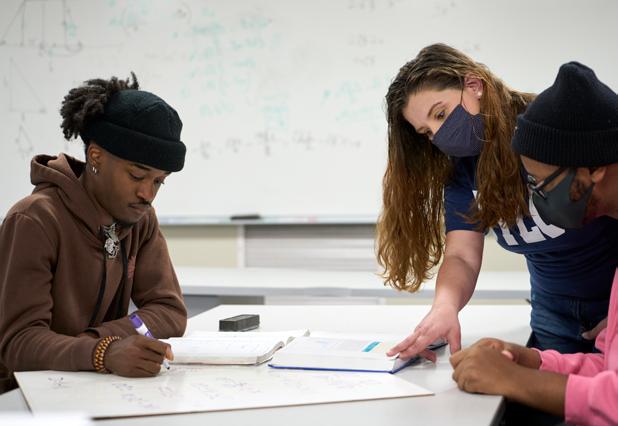
The program, which launched in spring 2023 on the Florissant Valley campus, is based upon the recognition that factoring is a crucial foundational topic. Faculty have identified factoring as a skill that students were struggling to master, seemingly leading to high drop/fail rates in the course.
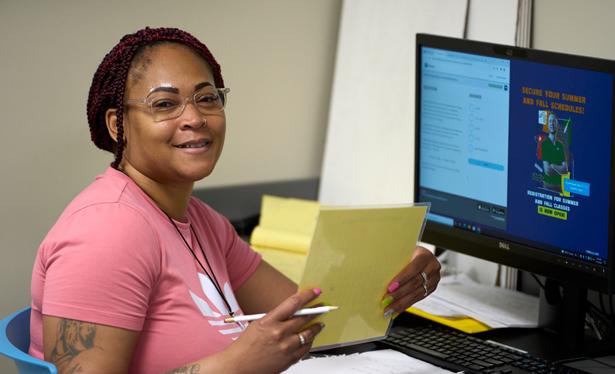
MTH 140/140S faculty participating in the initiative use an inclass quiz as a baseline assessment to identify students who may need additional support with factoring. Students who receive a grade lower than 80% are required to visit the Math Lab in the Academic Success and Tutoring Center for help with this skill set. When students feel comfortable, they are then invited to retake the quiz—using the same concepts, but different questions. Students who pass the retake test with at least 80% would then have their grade on the initial quiz
raised to 80%. Students who do not meet the 80% threshold on the retake test continue to receive additional support and tutoring until the passing grade is achieved.
The program’s goal is to increase the number of students who pass the course and help students identify the Academic Success and Tutoring Center as a valuable and trusted resource throughout their college career.
Early results are very promising. In total, 11 classes have been involved in the initiative with a total of 188 students. Comparing this cohort with the previous semester, 52.7% successfully passed the course (compared to 40.9% in fall 2022), 26.6% withdrew from the course (compared to 38.1% in fall 2022) and 20.7% did not pass the course (compared with 21% in fall 2022).
Of the students offered the opportunity to work with the Math Lab and retake the course, 65% did in fact use the lab and the majority of those students successfully passed the course.
77
Enhancing
Processes
for the Dual Credit Program
DUAL CREDIT PROGRAM AUTOMATES TOOLS FOR IMPROVED RESULTS
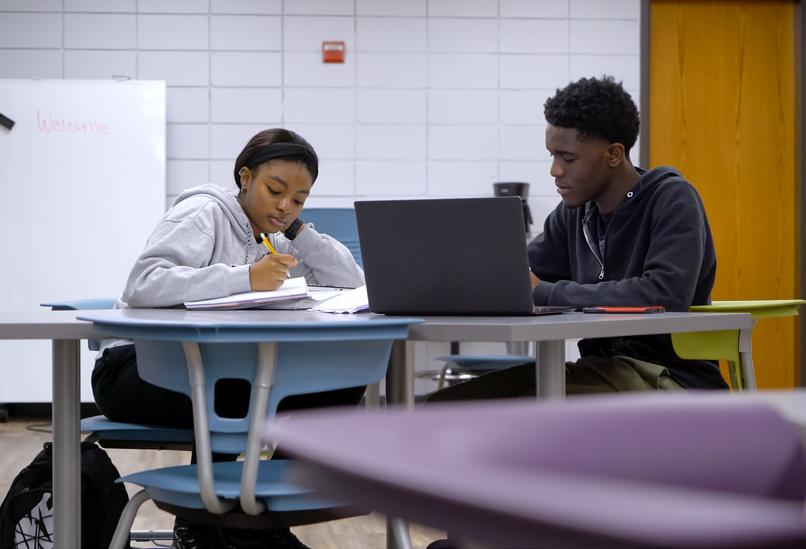

The College’s dual credit program allows high school students to earn college credit through high school classes taught by qualified instructors. In previous years, all aspects of this program were managed by email or paper: Excel spreadsheets were emailed back and forth, paper copies of teacher applications were routed via interoffice mail, site visits were scheduled individually through long email threads. This proved to be an incredibly daunting task, with 2,394 dual credit seats taken in 140 dual credit class sections offered at 26 different high schools.
Starting shortly after fall 2020, a team designed automated digital tools to manage most aspects of the dual credit program. For example, dual credit registration, which includes the collection of parent and counselor permissions, checking course prerequisites, management and awarding of scholarships and sending billing information, is now automated. This automation reduces friction in the process and improves the experience of dual credit teachers, high school partners, College staff and, most importantly,
students. This process improvement has translated into a 12% increase in fall dual credit enrollment since fall 2020.
Dual credit instructor support has also transitioned to automated management solutions, allowing for syllabi collection, roster verifications and site visit information to be performed and collected electronically. This has improved compliance dramatically. In fall 2020, the last semester before implementing changes, 58% of required syllabi were submitted. In fall 2022, with the new systems in place, 100% of syllabi were submitted. Site visit compliance has improved, too. Three years ago, 32% of dual credit classes did not receive a required site visit. This year, for the first time in dual credit history, the College is on track to have completed site visits for every one of our 91 dual credit classes requiring a visit.
These changes allow the College to fulfill STLCC’s mission and values by placing students first and making datainformed decisions.
78 League for Innovation SELF-STUDY 2023 STLCC
Student Advocacy & Resource Center (SARC)
SARC TRANSFORMING SOCIAL SERVICES FOR STLCC STUDENTS
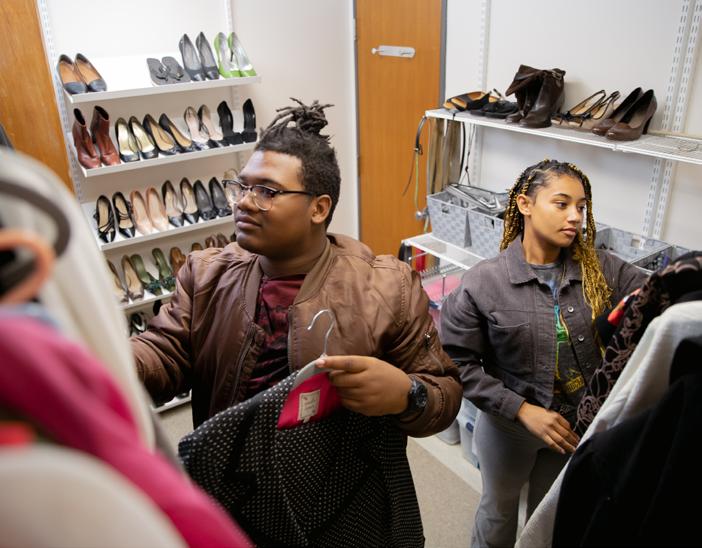
Students need more than pens, textbooks and laptops for success. They require basics such as clothing, food and other individualized supports to persevere. The College has offered social support services to ensure students have access to these basics for the past 25 years.
According to the Food Security Index, 29% of the nation’s community college students are food insecure and 27% struggle to pay their housing expenses or utility bills. In 2021, the creation of Student Advocacy & Resource Center (SARC) on each campus transformed the support services and resources provided by the College.
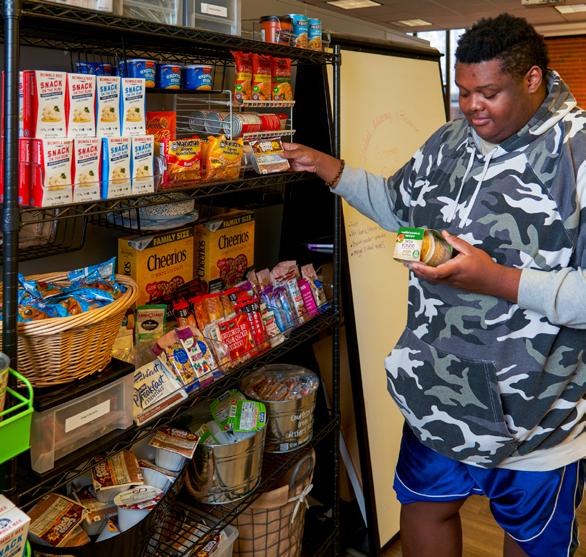
These centers provide students facing food insecurity, transportation concerns, childcare and emergency funding requests with comprehensive and individualized social supports, resources and referrals. SARC also links students to federal and state benefits such as Medicaid, utility assistance and the Supplemental Nutrition Assistant Program.
Basic needs support specialists within SARC collaborate with area nonprofits, such as the St. Louis Area Foodbank and Diaper Bank, the Missouri Family Support Division, Partners in Prevention and the Coalition Against Domestic Violence, among others, to help students.
During the 2022-2023 academic year, SARC served 3,366 students (a 77% increase) through 18,961 service interactions (a 326% increase) compared to the previous year.
According to satisfaction and student learning outcomes surveys, 92% of students served by SARC said staff were knowledgeable about campus and community resources and provided appropriate information and assistance.
79
Child Development Laboratory Centers (CDLC)
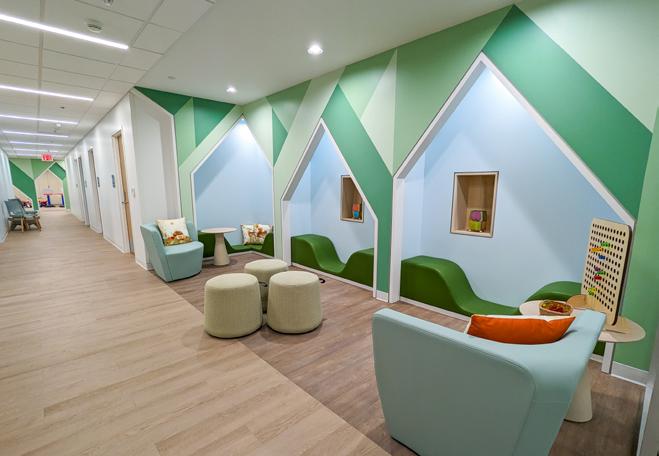
PARTNERING WITH PARENTS TO ENSURE THEY CAN MEET EDUCATIONAL GOALS
From financial support to on-campus childcare facilities, the College has a comprehensive support structure for students who are also parents.

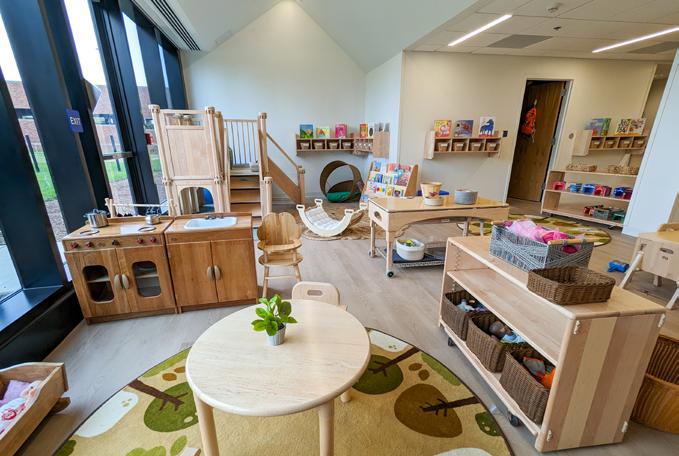
Both the Forest Park and Florissant Valley campuses offer childcare at their Child Development Laboratory Centers (CDLC). The facilities offer parents a safe, secure and loving environment for their children six weeks old through preschool. This option is available to all students, regardless of which campus they take classes, and provides these parents with peace of mind so they can focus on their academics.
The Forest Park location held its ribbon-cutting ceremony in May 2023 to celebrate the opening of its new $10 million, 10,000-square-foot space. It offers state-of-the-art amenities and technology to serve the children and the College’s child and family development students who use the facilities as a learning lab.
To further support students, the College opened Family Resource Centers in 2020 to provide information and social support for parenting students. These resources supplement funds available to qualifying students through the Child Care Access Means Parents in Schools grant. During the 2020-2021 academic year, 72 students benefitted from the grant that supported 24,000 hours of childcare for 114 children. The average grant award per student was $2,650, with the annual total of $190,950.
STLCC also helps students who are parents develop a sense of belonging and a connection with their children and peers with family-friendly activities. These include parenting skills workshops, pizza and movie nights, holiday socials, child development/literacy awareness events and summer safety kits.
80 League for Innovation SELF-STUDY 2023 STLCC
Modern Technology in HyFlex Classrooms
HYFLEX CLASSROOMS BRING THE LEARNING TO THE STUDENTS
The development of HyFlex courses demonstrate the College’s embrace of new technology to enhance learning with a dynamic and interactive experience. Instead of distance learning that consists of two discussion board posts and a quiz for each module, students in HyFlex courses can choose to attend class face-to-face in a classroom or participate in a synchronous class session through Microsoft Teams.
The College has invested in the latest multimodal capabilities in educational technology to ensure all students receive the same engaging experience, regardless of their setting. Classrooms equipped with multiple high-definition pan-tiltzoom (PTZ) cameras offer students a comprehensive view of the space and Extron Streaming Media Processor (SMP) technology allows instructors to share engaging content through multiple-source streaming capabilities via Panopto.
Perhaps the most visually interesting new tool, e-Glass Lightboards help instructors put students first and connect with students both in the classroom and online. As instructors write on the transparent dry-erase boards, a video camera
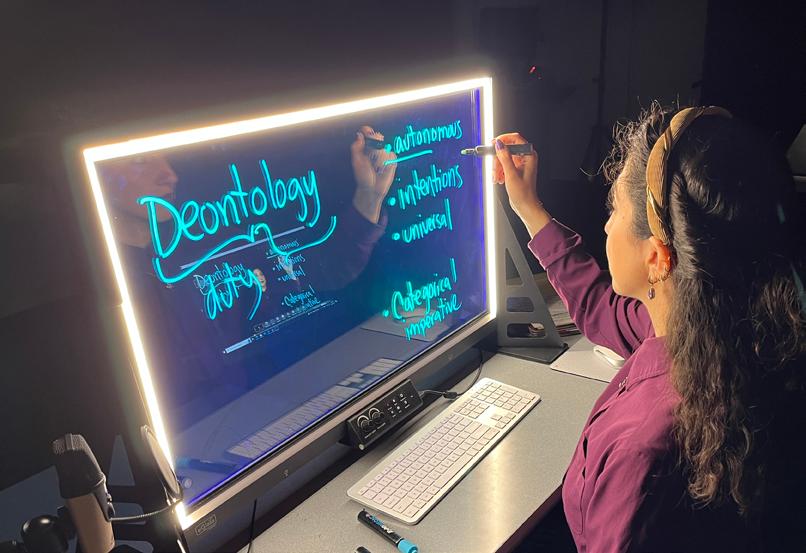

reverses the image, so students see the text and instructor simultaneously, regardless of how they access the course. Instructors can add a visual representation of course concepts to their verbal explanations, maintaining eye contact with students while presenting digital artifacts like Word documents or a web browser without ever turning their back on the class.
In addition to providing an enhanced synchronous learning experience anytime and anywhere, HyFlex courses benefit students by eliminating barriers such as childcare, transportation and other responsibilities that may hinder their educational progress.
Following overwhelmingly positive reviews from both students and faculty, the success of this technology has prompted the College to expand the program from a single classroom pilot to a total of 13 across the district.
81
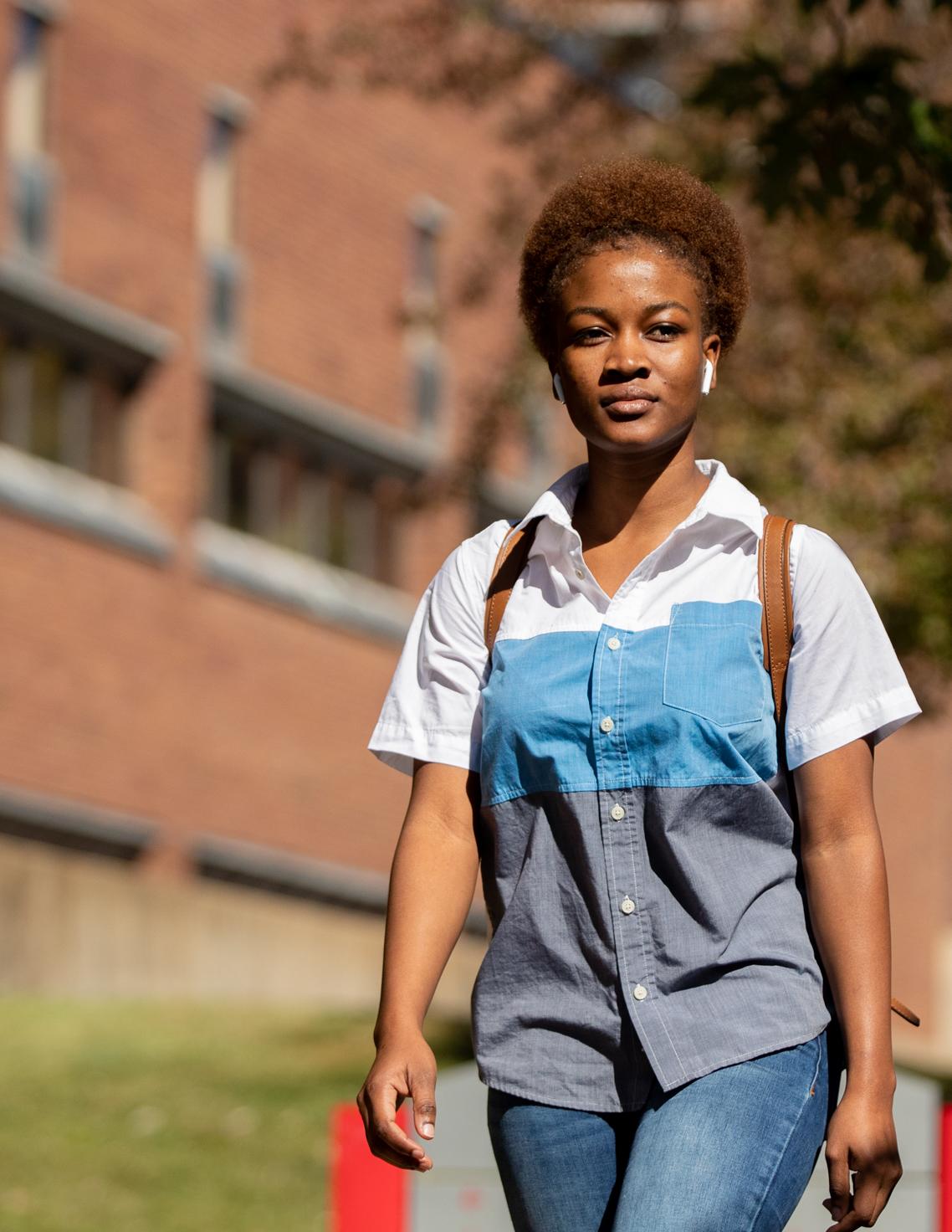
AWARDS
The College is proud to celebrate the accomplishments of students, faculty, staff and leadership. Along with individual achievements, the College earned regional and national awards in recent years.
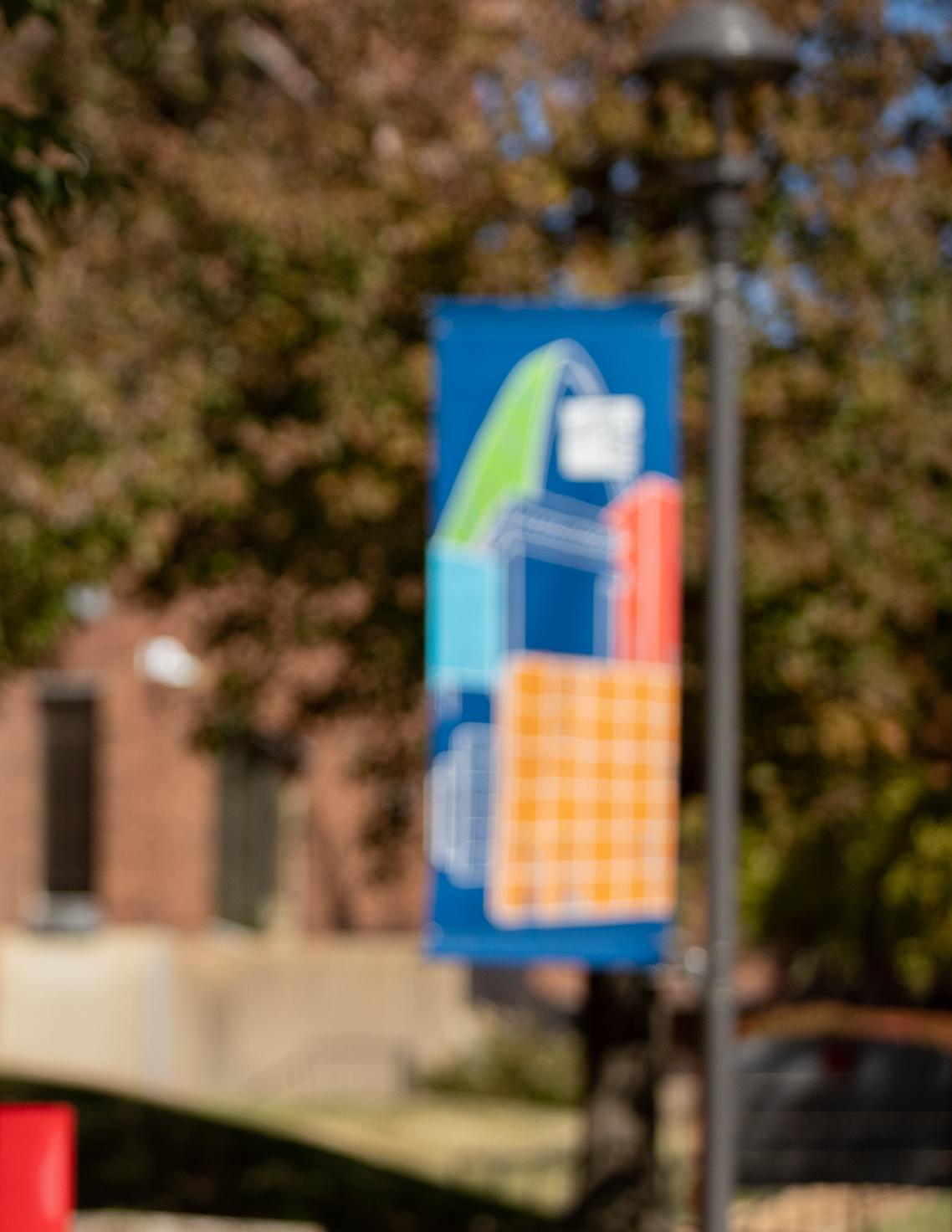
League of Innovation Awards
League Excellence Awardees
2022-2023 EXCELLENCE AWARD WINNERS
– Carl Fischer, Assistant Professor, Engineering and Technology
– Elizabeth Granier, Professor, Biological Science
– Kim Halleman, Manager, Academic Success and Tutoring
– Marilyn Powers, Supervisor, Business Services
– Chad Shade, Manager, Admissions
– Casey Shiller, Professor, Hospitality
– Joan Williams, Administrative Assistant, President’s Office
2021-2022 EXCELLENCE AWARD WINNERS
– Cynthia Clausen, Manager, Academic Support
– Joe Cooper, Project Associate, Health Sciences
– Jim Ibur, Professor, Fine Arts
– Kim Kraft, Professor, Nursing
– Gina Tarte, Coordinator, Marketing and Communications
– Karen Wade, Administrative Professional, Library Services
– Annie Wagganer, Assistant Professor, Sociology
– Laura Westhoff, Business Services Specialist
2020-2021 EXCELLENCE AWARD WINNERS
– Robyn Barrett, Professor, Accounting
– Jamie Kreher, Associate Professor, Photography
– Danielle Lusk, Coordinator, Student Assistance Program
– Christopher Mahan, Assistant Professor, Mathematics
– Susan Watkins, Student Success Advisor
2019 EXCELLENCE AWARD WINNERS
– Arabela Koric, Assistant Professor, Mathematics
– Betsy Morris, Professor, Art
– Edward Pfeifer, Secretary, Mathematics
– Jeremy Dennis, Professor, Humanities
– LaRhonda Wilson, Faculty, Sociology
– Mysha Clincy, Academic Advisor
– Yolanda Adams, Administrative Secretary, Faculty Office
2018 EXCELLENCE AWARD WINNERS
– Lucia Miller, Senior Associate, Projects
– Jerry Pence, Assistant Professor, Horticulture
– John Snider, Environmental Health, Safety Specialist
– Kevin Talbot, Project Associate, Workforce Solutions
– Carlos Blanco, Faculty Reading
– Michael Quintero, Professor, Art
– Patricia Ann Suess, Professor and Chair, Mathematics
– Dean Brake, Professor, Radiologic Technology
– Deborah Char, Assistant Professor, Mathematics
– Kim Fitzgerald, Dean, Student Development and Enrollment Management
– Bertha Moreland, Coordinator, Enrollment Center
– Jeffrey L. Schneider, Professor, English
– Kim Granger, Chair, Mathematics
2017 EXCELLENCE AWARD WINNERS
– Alexandria Bratcher, Academic Advisor
– Stephanie Church, Coordinator, Campus Life & College Transition
– Cindy Clausen, Manager, Academic Support Center
– Nancy Collier, Professor
– Vicki Kettenacker, Manager, Campus Business Services
– Deborah Logan, Coordinator, Enrollment Management
– Michael Lueke, Associate Professor
– Sanela Mesic, Manager of TRIO
– Kim Polk, Associate Professor
– Mark Taylor, Professor
– Donna Wallner, Professor
2016 EXCELLENCE AWARD WINNERS
– Cynthia Ballentine, Associate Professor
– Phillip Campbell, Coordinator
– Syed Chowdhury, Associate Professor
– Christopher Fletcher, Manager
– Layla Goushey, Associate Professor
– Erin LeClerc, Associate Professor
– Michael Lueke, Associate Professor
– Pam McElligott, Professor
– Donda Miller, Associate Professor
– Amy Sonderman, Coordinator
2015 EXCELLENCE AWARD WINNERS
– Maxine Beach, Assistant Professor
– Steven Ehlen, Supervisor, Technology Learning Center
– Michael Hauser, Professor
– Margaret Keller, Professor
– Robert Langnas, Professor
– Matthew McVey, Supervisor
– Barbara Mehranfar, Coordinator, Student Enrollment/Academic Advising
– Renee Peeples, Administrative Assistant
– Theresa Smythe, Student Support Specialist
– Susan Tolentino, Engineering Technician
– Joe Wilson, Associate Professor
84 League for Innovation SELF-STUDY 2023 STLCC
STLCC Innovation of Year Awardees
2021-2022 INNOVATION OF YEAR AWARD WINNER
STLCC Vax Incentive App
Suhail Awan, Brian Bakula, Jim Cooper, Khouloud Hawasli, Jeff Kapp, Adam Lopresto, Matthew Schrum
2020-2021 INNOVATION OF YEAR AWARD WINNER
Electronics Technology At-Home Kits
Steven Ehlen, Bill Hoffmann, David Kobe, Stacey Lampman, Thomas McGovern
2019-2020 INNOVATION OF YEAR AWARD WINNER
STUDENT SPOTLIGHT: A Collaborative Project Between Access Office and Graphic Communications
Theresa Smythe, Michael Swoboda
2019 INNOVATION OF YEAR AWARD WINNER
CROSS-DISCIPLINE COLLABORATION: Nursing Simulation with Deaf Patients, Interpreting and Nursing Students
J. Eric Driskill, M Michelle Petterchak
2018 INNOVATION OF YEAR AWARD WINNER
Technology Petting Zoo Expo
Stacey Lampman, Gwendolyn Nixon, Rosita Lewis, Phyllis Davis, Mea Hampton, Amy Bird, Jonathan Majors, John Furlong
2017 INNOVATION OF YEAR AWARD WINNER
A Single-Text Pathway to College Writing
Zita Casey, Judith Collins, Melody Gee, Ronald Hughes, Michelle Parrinello-Cason, Adrienne Smith, Hilary Wilson, Geraldine Young
2016 INNOVATION OF YEAR AWARD WINNER
Predictive Modeling of CTE Student Retention

Carla Jordan, Eric Chambers, Diana Johnson, Valerie Turner, Patricia Meyer
2015 INNOVATION OF YEAR AWARD WINNER
Brown Bag Café
Pam Garvey, Sanela Mesic, Doris Durgins-Johnson, Debora Bronson, Debbie Corson, Jeff Schneider
Additional Awards and Distinctions
College and Campus Awards and Recognitions
2021 National Council for Marketing & Public Relations Paragon Award
2021 North [St. Louis] County Incorporated Diversity and Inclusion Leadership Award
2020 American Society of Landscape Architects [St. Louis Chapter] Civic Stewardship Award
2020 Chesterfield Chamber of Commerce Business of the Year
2018 Council for Community and Economic Research Award for a joint project: STLCC & Missouri Economic and Information Center
2018 National Coalition for Campus Children’s Centers Program of the Year: Child Development Center
Student Awards and Recognitions
2023 Phi Theta Kappa All-Missouri Scholars
2023 Elizabeth Gray Danforth Scholarship presented by Washington University in St. Louis
2023 Bellwether College Consortium Finalist Award: Boeing Pre-Employment Program
2022, 2021, 2019 and 2018 Missouri Community College Association Student Leadership Awards
2022, 2020, 2019 and 2018 Missouri College Media Campus Newspaper Awards
2021 St. Louis County Special School District Special Ambassador Award: Boeing Pre-Employment Training Program for High School Seniors
2020 Phi Theta Kappa Hallmark Awards
2020 Phi Theta Kappa Honors in Action Award
2020, 2019 and 2018 Phi Theta Kappa Five Star Chapter Awards
2019 Bellwether College Consortium Legacy Finalist Award: Center for Plant and Life Sciences
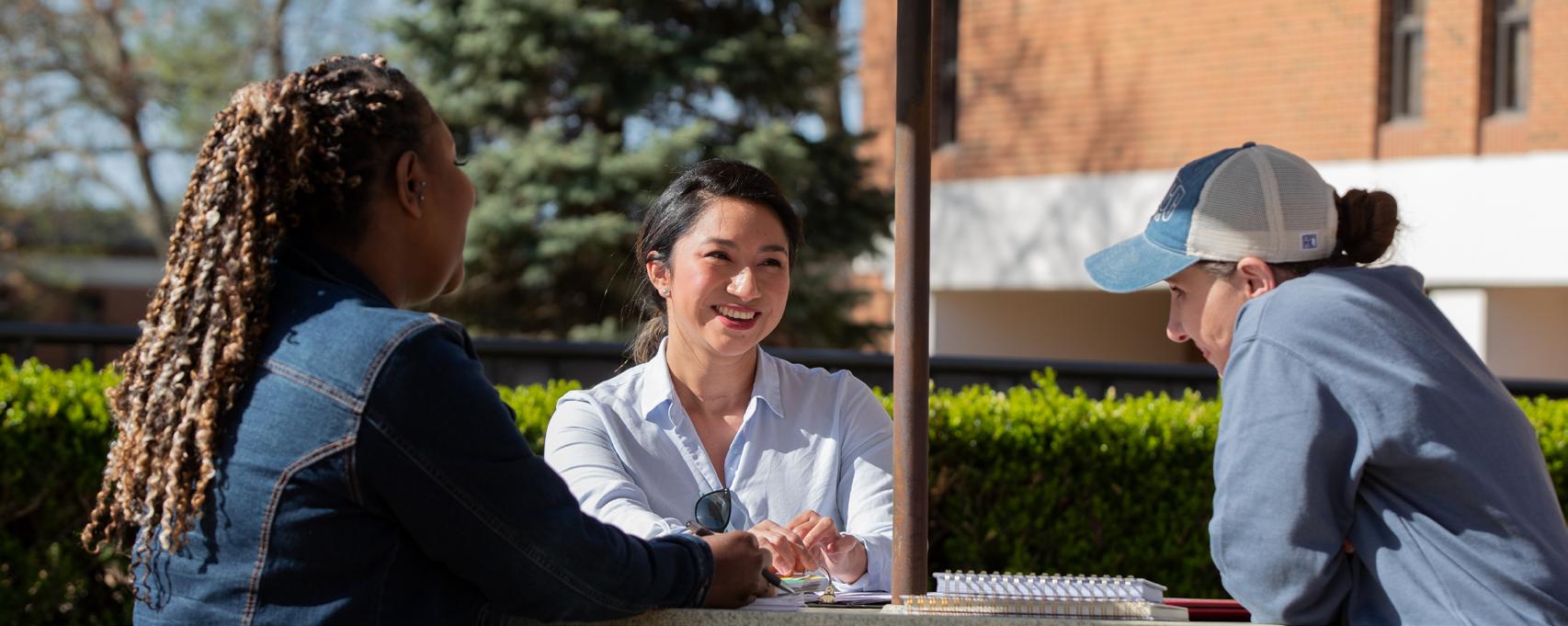
2019 Achieving the Dream Program Excellence Award: Gateway to College Program
2018 National College Media Feature Magazine Award: Campus Newspaper
86 League for Innovation SELF-STUDY 2023 STLCC
Faculty, Staff and Leadership Awards and Recognitions
FACULTY
Annual Emerson Excellence in Teaching Awards
Annual David L. Underwood Memorial Lecture Award (since 1975)
2023 Lucy Shelton Caswell Research Award
2023 Missouri Mathematical Association of Two-Year Colleges Teaching Excellence Award
2021 American Accounting Association Award
2020 Missouri Community College Association Mel Aytes Faculty Innovation Award
2020 American Mathematical Association of Two-Year Colleges Herb Gross Presidential Award
2019 Federal Reserve Bank of St. Louis Economic Educator Advisory Board Educator of the Year Award
2019 American Accounting Association Innovation in Accounting Education Award
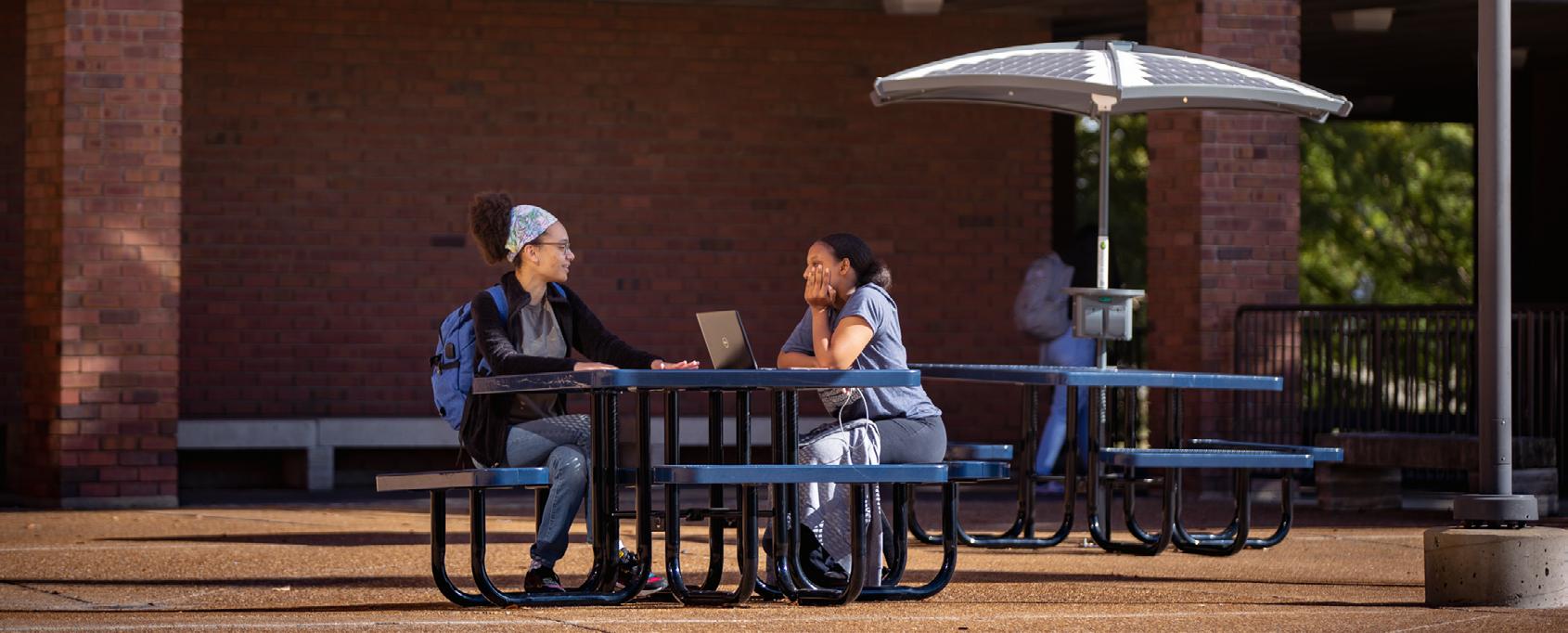
2019 and 2018 MCCA Missouri Governor’s Award for Excellence in Teaching
2018 League for Innovation John and Suanne Roueche Excellence Award
2018 Missouri Community College Association Global Educator Award
STAFF AND LEADERS
2023 Phi Theta Kappa Honor Society’s Shirley B. Gordon College President Award of Distinction
2022 Phi Theta Kappa Paragon President Awards
2019 North [St. Louis] County Churches Uniting for Racial Harmony and Justice Outstanding Education Award
2018 Missouri Community College Association Administrative Professional Leadership Award
Annual Missouri Community College Association Service Awards
87

LEADERSHIP TRANSFORMATIONAL
When Chancellor Jeff Pittman arrived in 2015, St. Louis Community College faced significant challenges. With a rotation of several chancellors in the previous seven years, all with short tenures, the College struggled to make sustainable progress. Using his extensive experience in a variety of leadership roles in Indiana’s state-wide community college system and, most importantly, his people skills, Dr. Pittman assessed the situation and built a foundation of collaboration. His efforts have transformed the organization with a clear direction focused on continuous improvement in academics, student services and college operations.
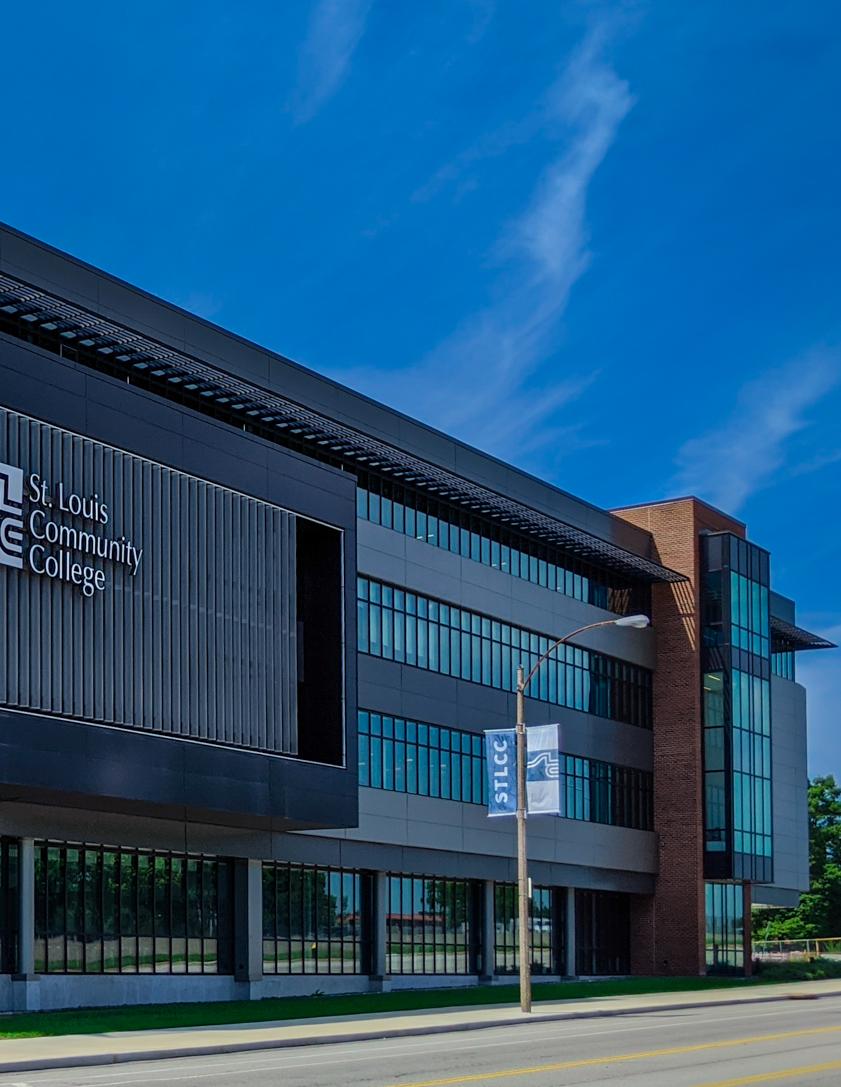
Dr. Pittman’s experience in Indiana’s larger, more complex state-wide community college system served him well as he began to investigate the issues facing the College. STLCC’s strategic plan was outdated and seldom referenced in daily operations, so a cross-functional group representing all areas was assembled to develop a three-year strategic plan. The plan is updated every three years and remains a living document used to guide daily operations, prioritize budget requests, set departmental goals and guide goal setting in individual performance evaluations.
Dr. Pittman also began building collaborative working relationships with College employees. He embarked on a listening tour of the campuses to hear firsthand from students, faculty and staff in Chancellor’s Forums. He met with bargaining unit leaders and attempted to establish common goals for the College. Dr. Pittman’s Chancellor’s Leadership Academies became one vehicle for participants to produce positive results for STLCC while advancing their own careers. That work continues as a new series of employee engagement activities commences in 2023. Engage and Listen is an initiative that responds to employee feedback to create a culture of trust and respect and make STLCC one of the “Best Places to Work” in the region.
This foundational work with the strategic plan and engagement with faculty and staff helped the entire College work together to address the change in demographics causing enrollment declines.

Continuous improvement was introduced and has become part of the work culture. The College is now implementing the Baldrige Excellence Framework as a more comprehensive organizational quality model.
The Workforce Solutions Group (WSG) expanded to begin testing educational programs that could be implemented quickly as noncredit offerings. In some cases, they also serve as the first steps in a stackable credential pathway that concludes with academic credentials.
90 League for Innovation SELF-STUDY 2023 STLCC
Guided Pathways was explored by a few Chancellor’s Leadership Academy teams and other areas of the College, leading to a Collegewide project to implement Pathways to Success.
Dual credit/enrollment partnerships numbers were very low when Dr. Pittman arrived, but innovative recruitment and partnerships have produced impressive results, with enrollment increasing 100% over the last five years. These and other successes gradually transformed STLCC’s work culture and student success outcomes. There is still much work to do, but the momentum gained through transformational leadership is driving positive change for students and employees.
STLCC’s transformation has strong financial support. The STLCC Foundation established a fundraising campaign in 2019 with a goal of $20 million. They exceeded that goal and raised $23 million by 2021, all of which will be used for student scholarships and support.
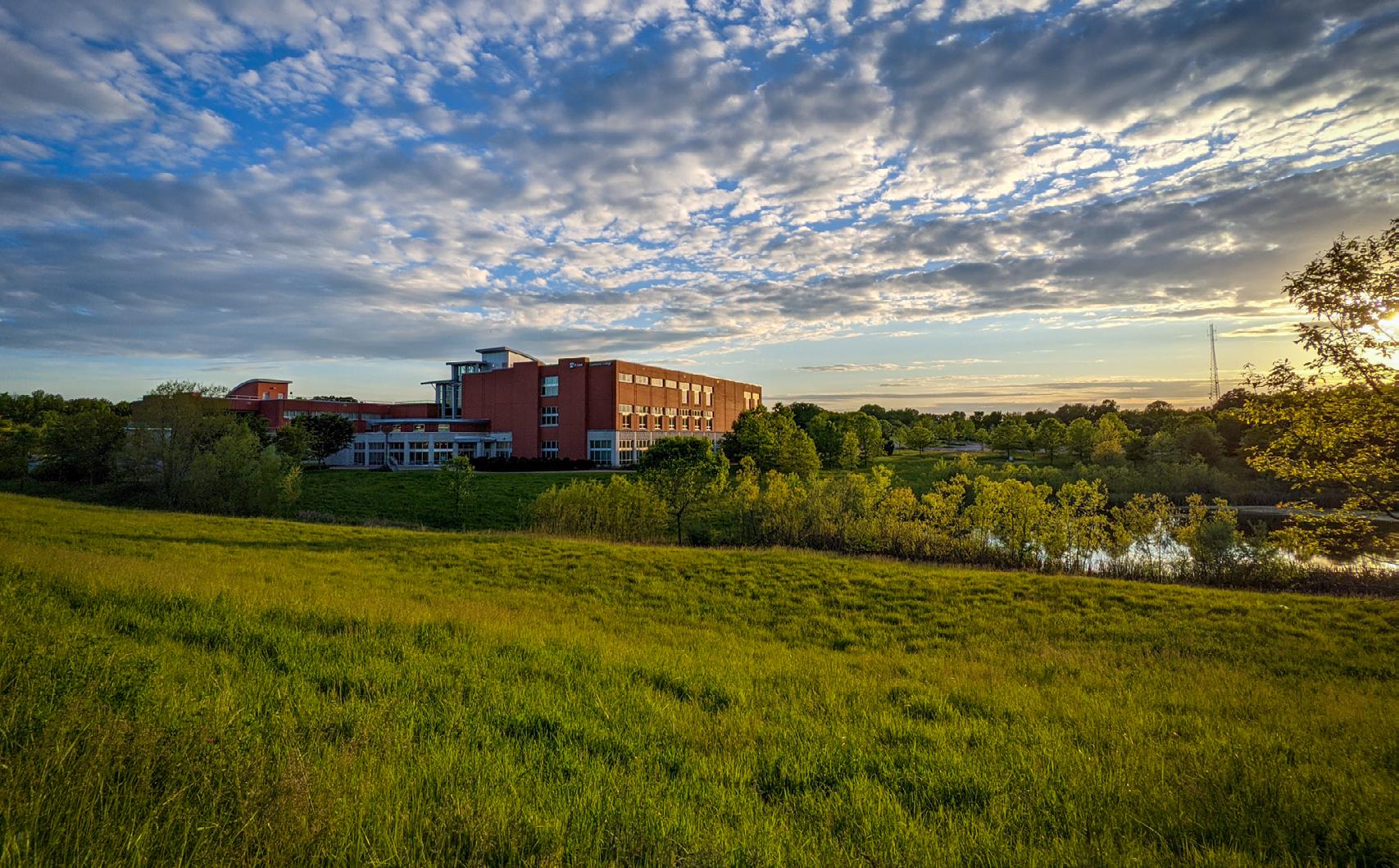
The College’s local tax increase ballot measure was successful and is funding STLCC Transformed. One or more new buildings will be constructed on each campus and existing buildings will be upgraded.
STLCC Transformed will provide the types of learning spaces that current and future students prefer. Career and Technical Education (CTE) students will have experiential learning spaces to apply concepts in real life simulations, much like they do in health care programs in the recently constructed Center for Nursing and Health Sciences Building on the Forest Park campus.
STLCC is poised to take on the challenges in today’s higher education marketplace and to lead future trends due to our transformational work. Under Dr. Pittman’s guidance, transformational leadership has been established that benefits our students, the College and the communities we serve.
91













































































































































 INTERIOR RENDERING, ADVANCED MANUFACTURING CENTERFLORISSANT VALLEY
INTERIOR RENDERING, ADVANCED MANUFACTURING CENTERFLORISSANT VALLEY






























